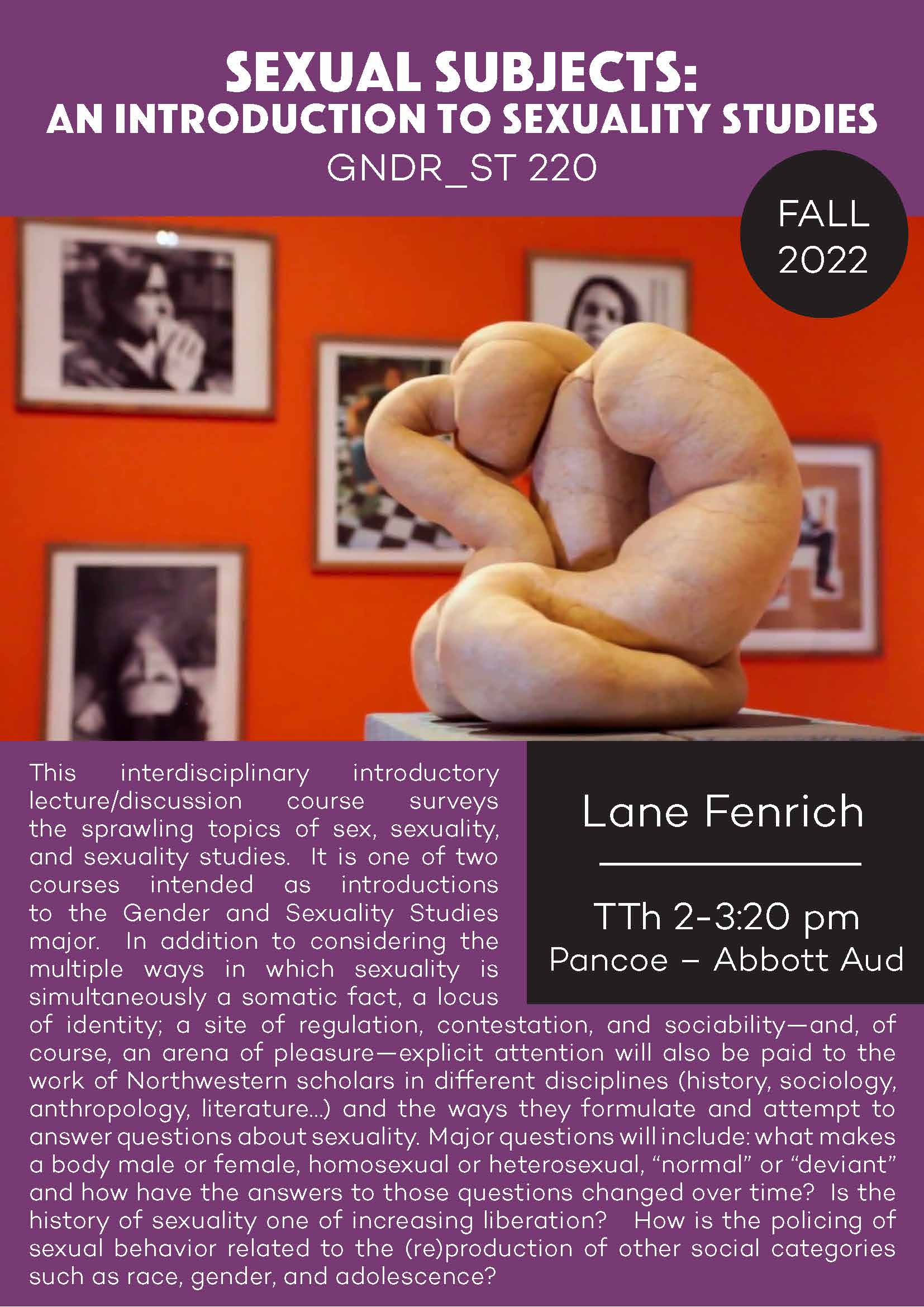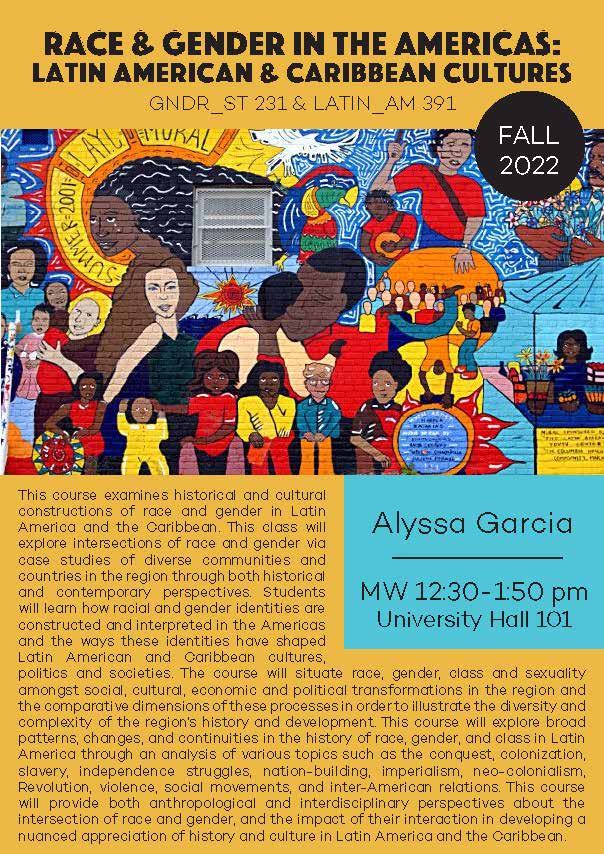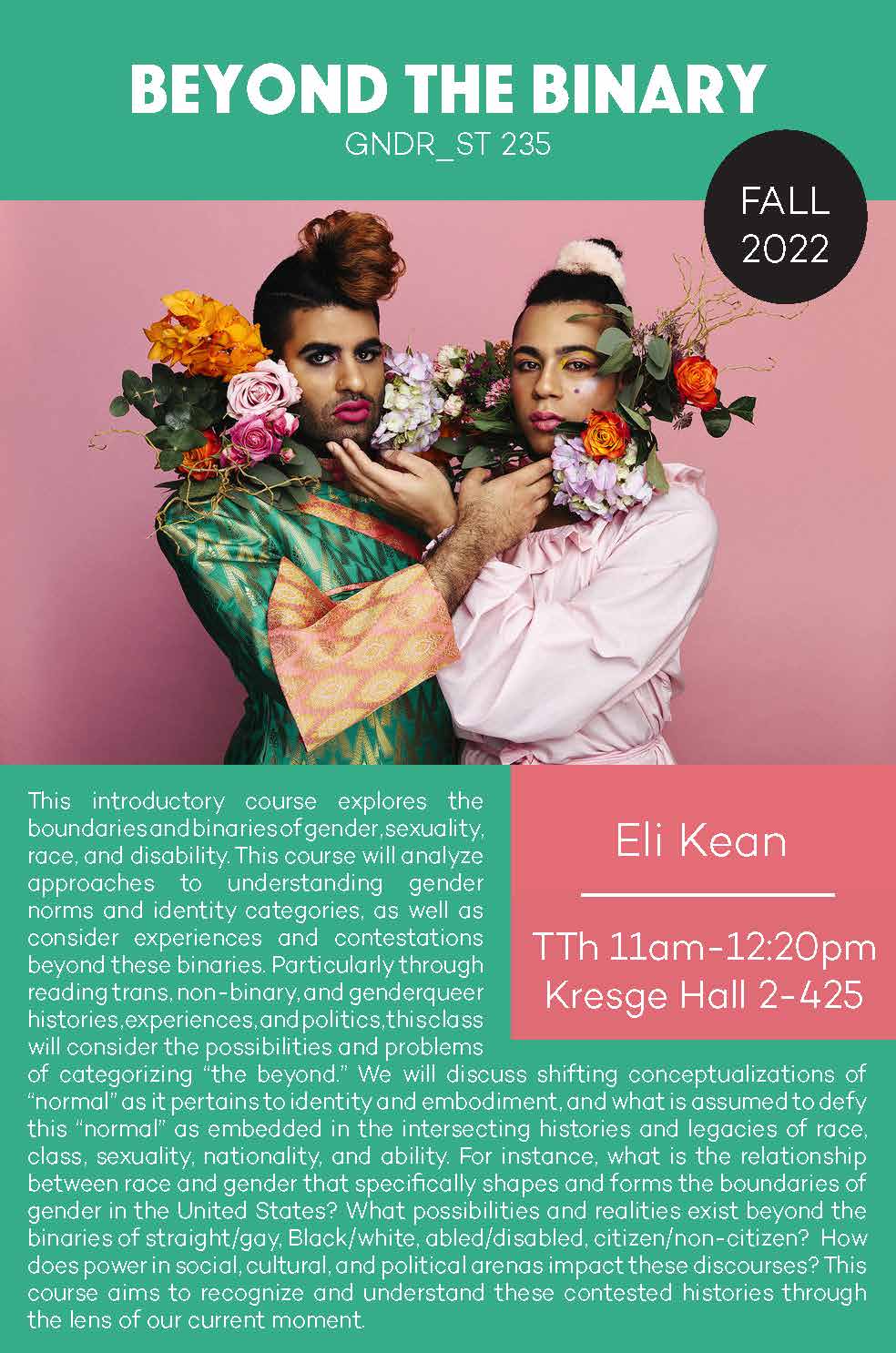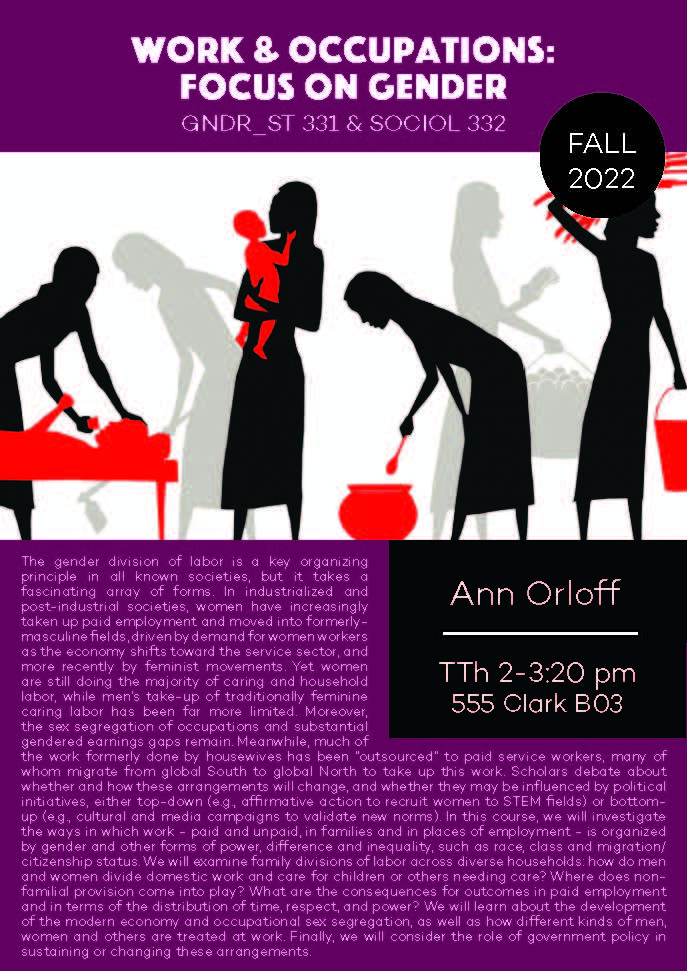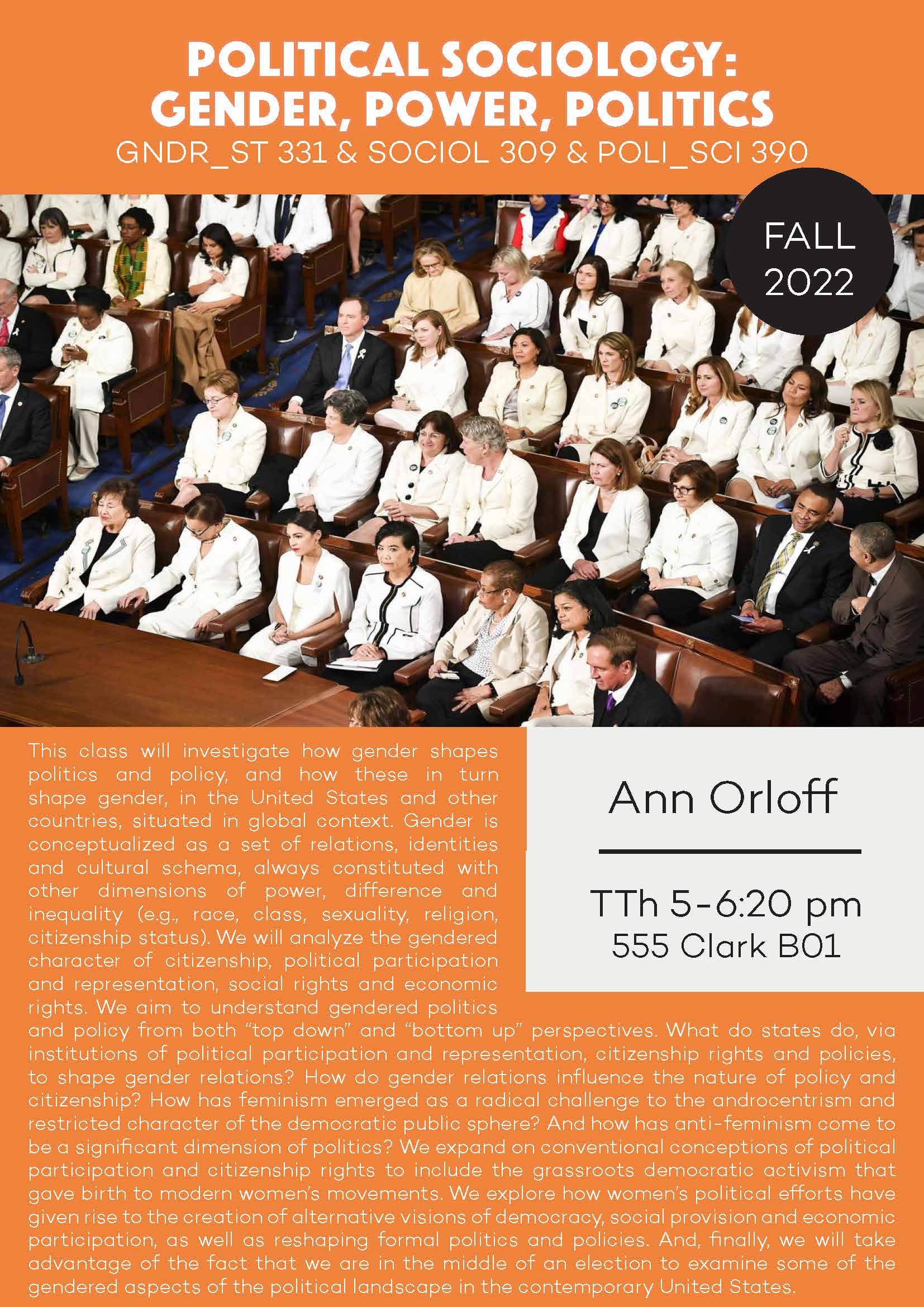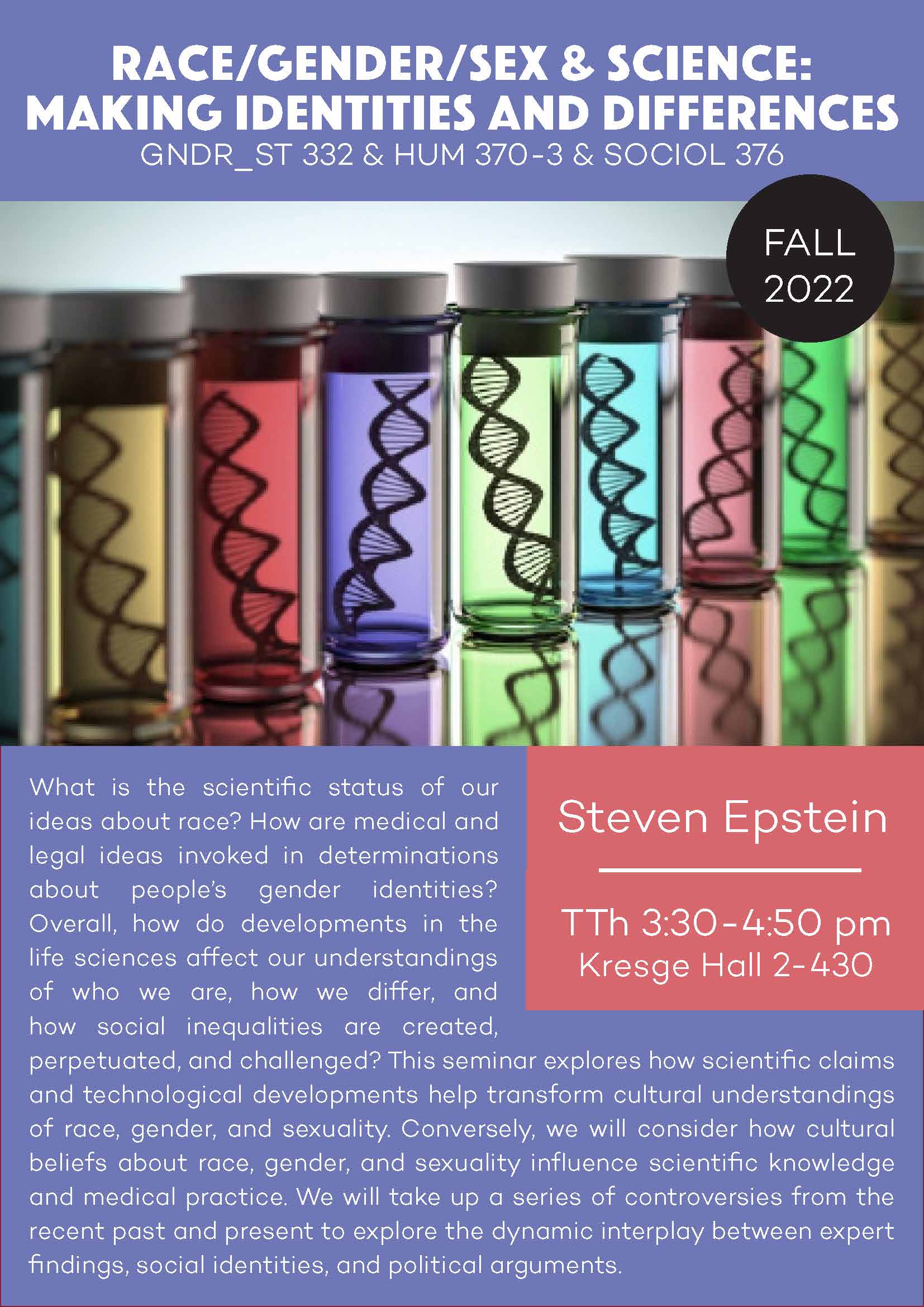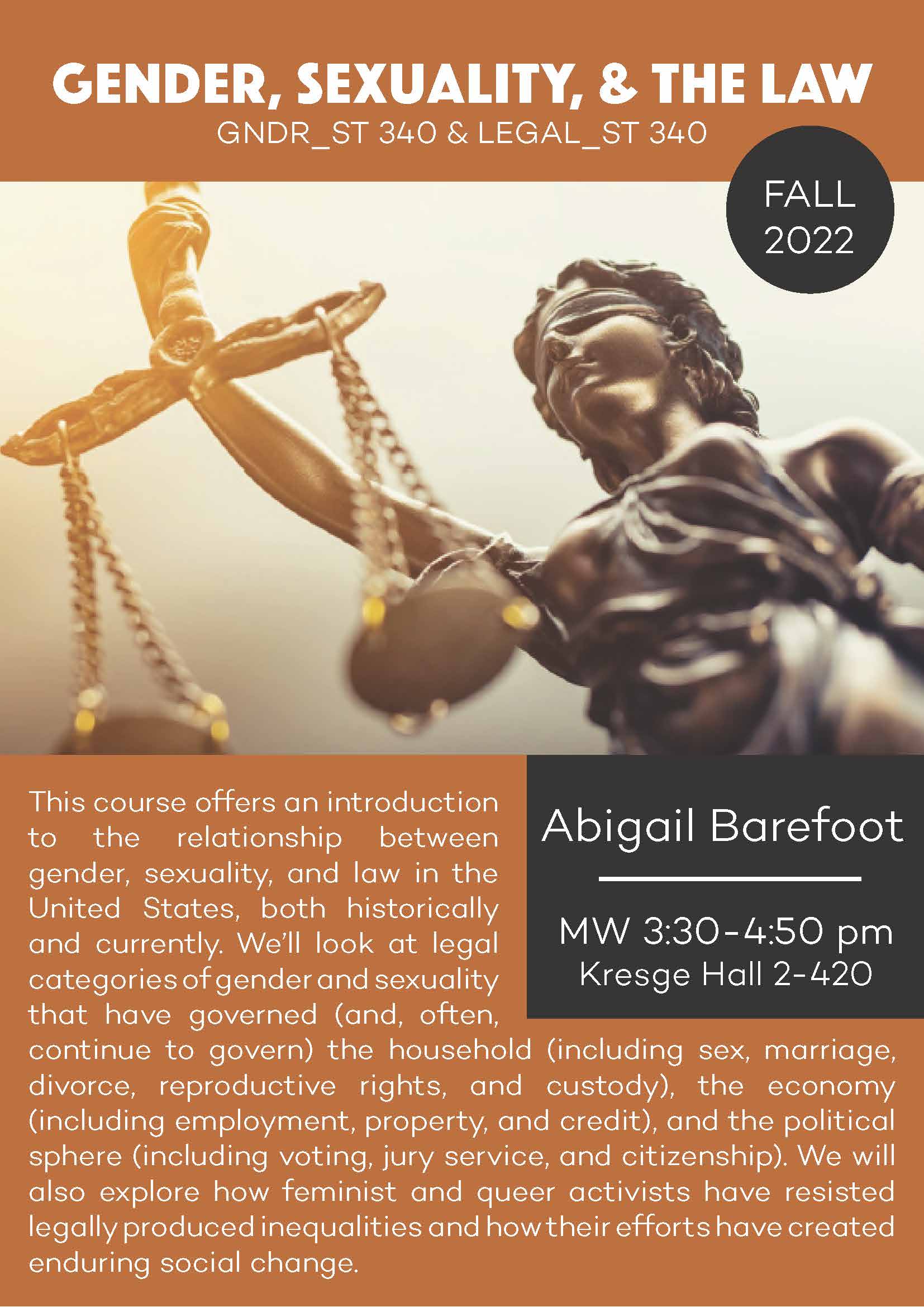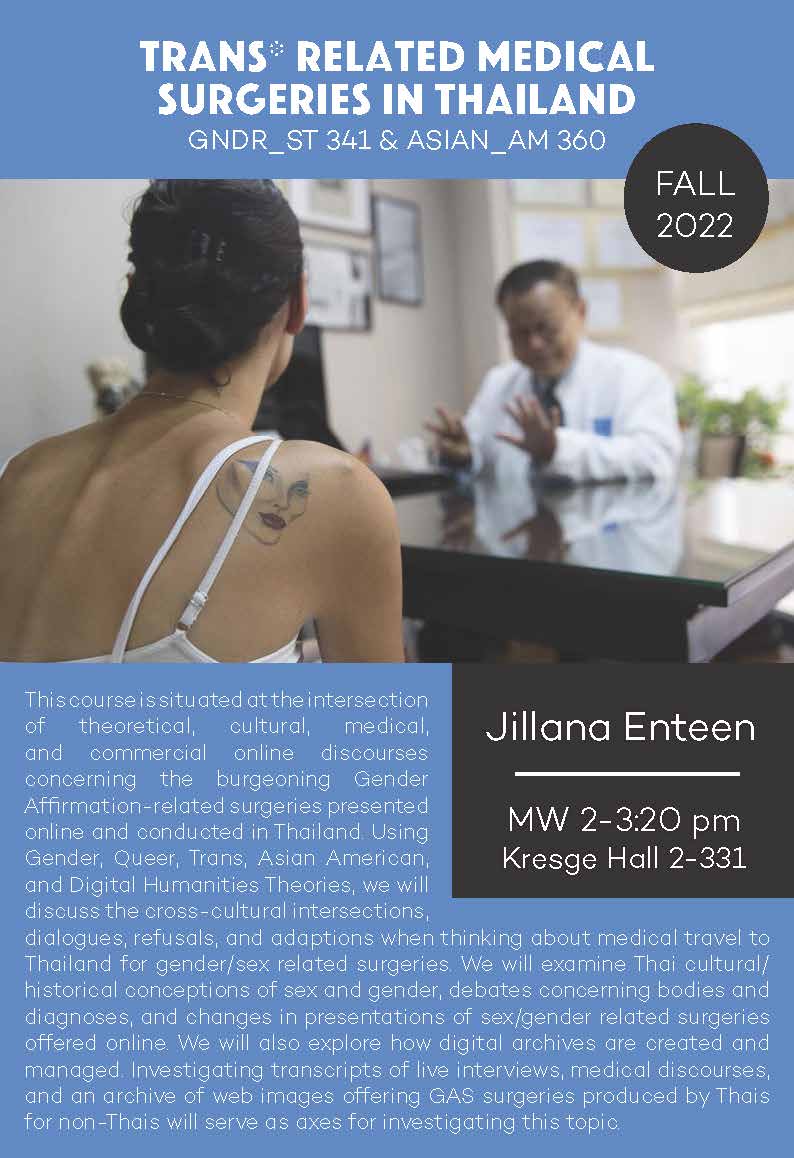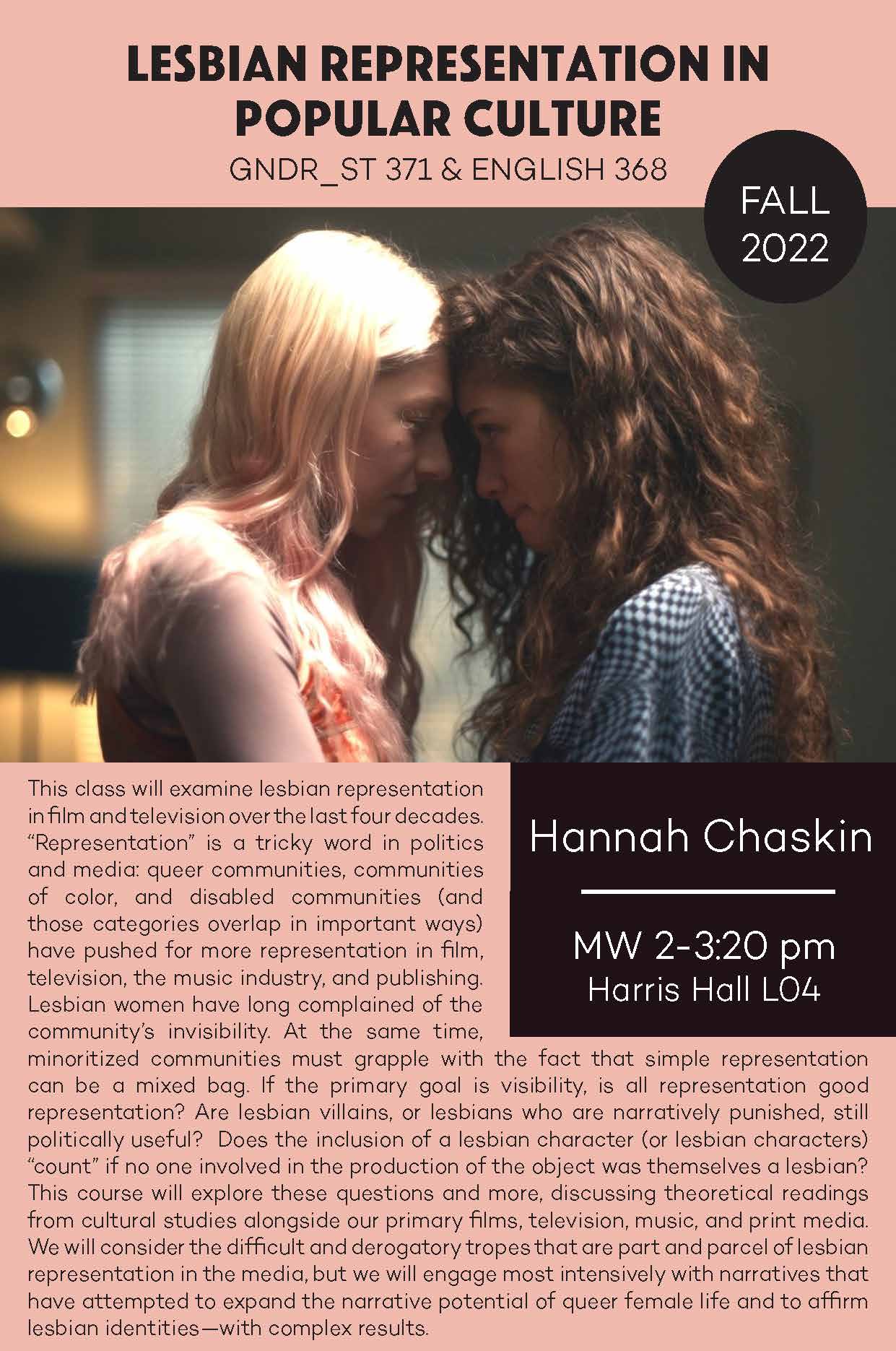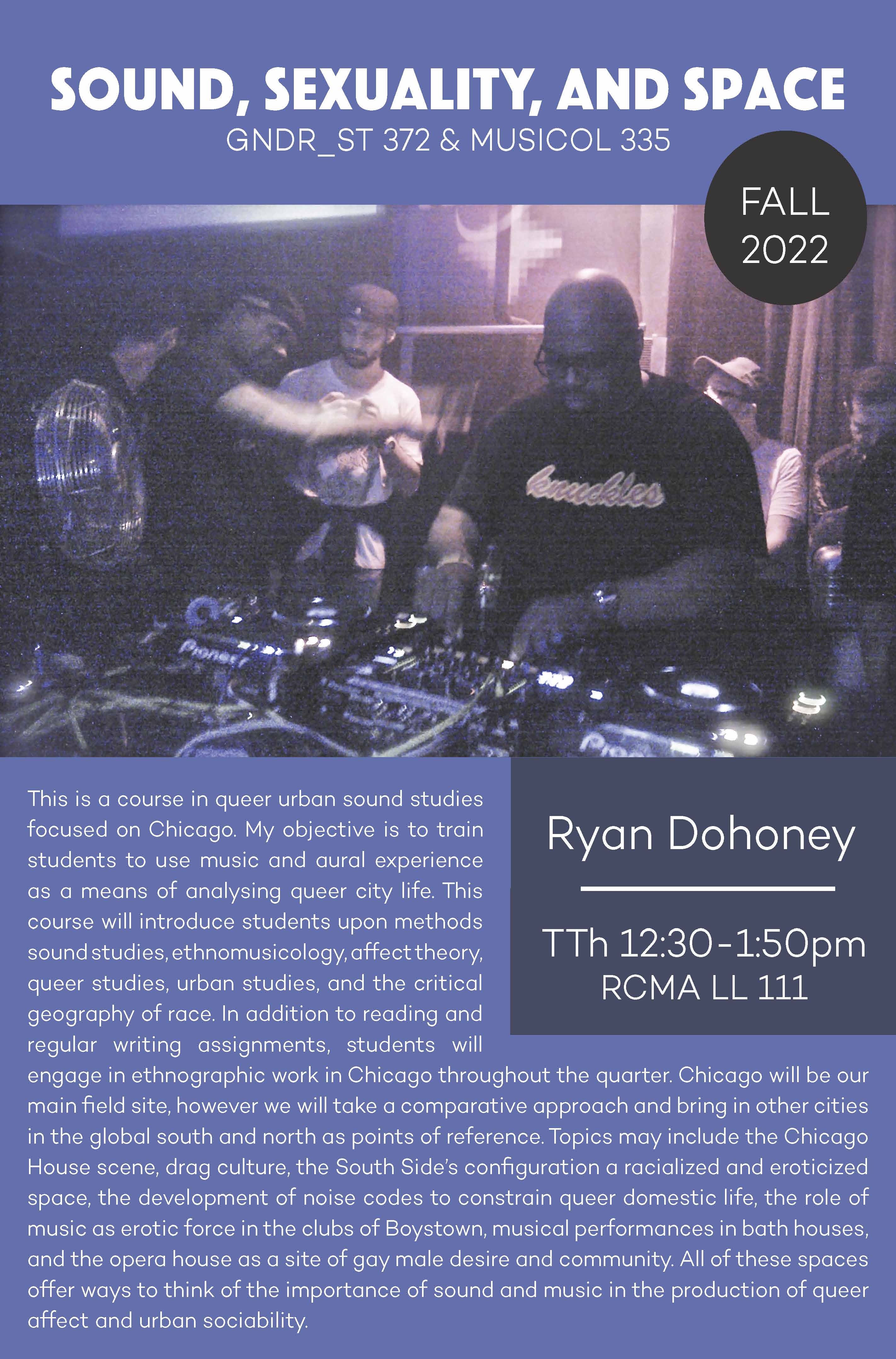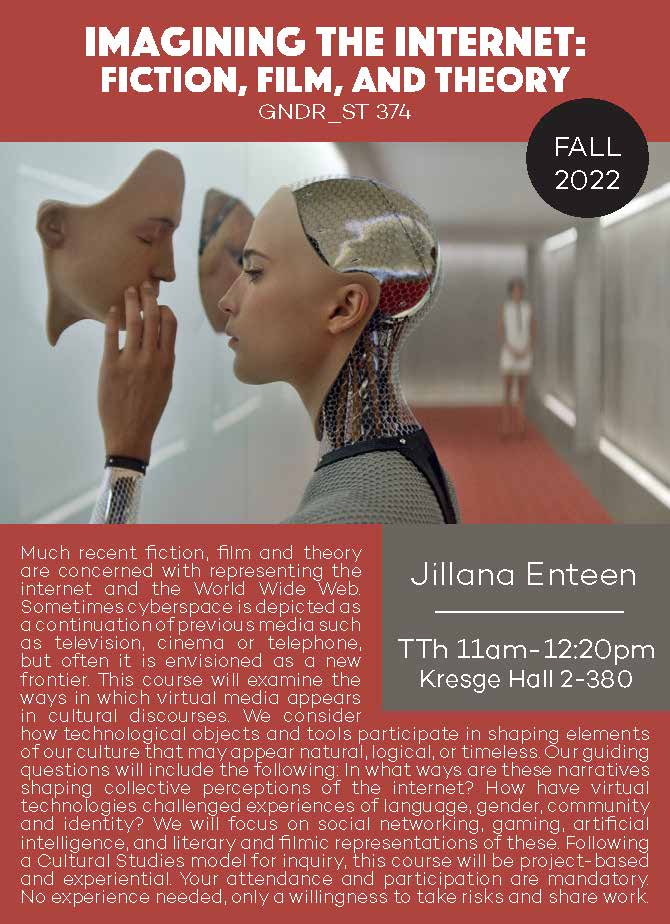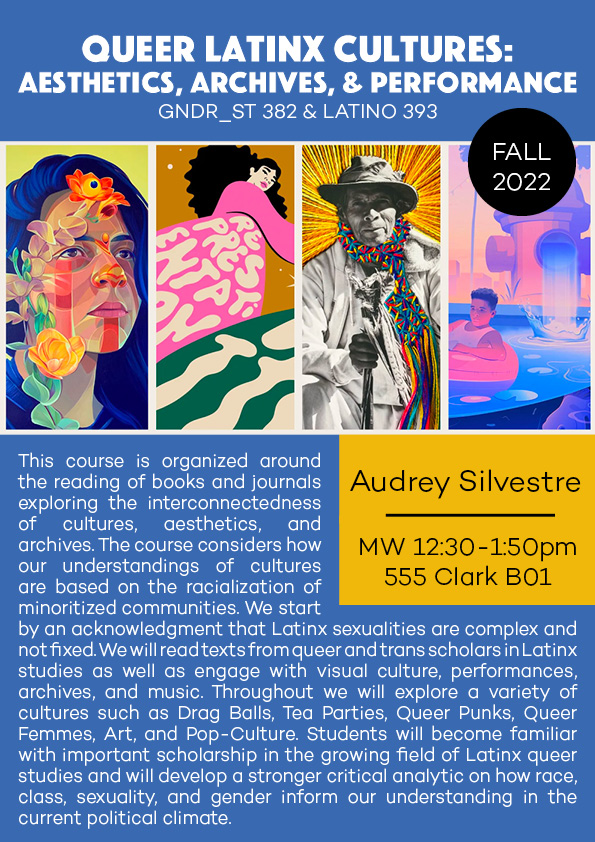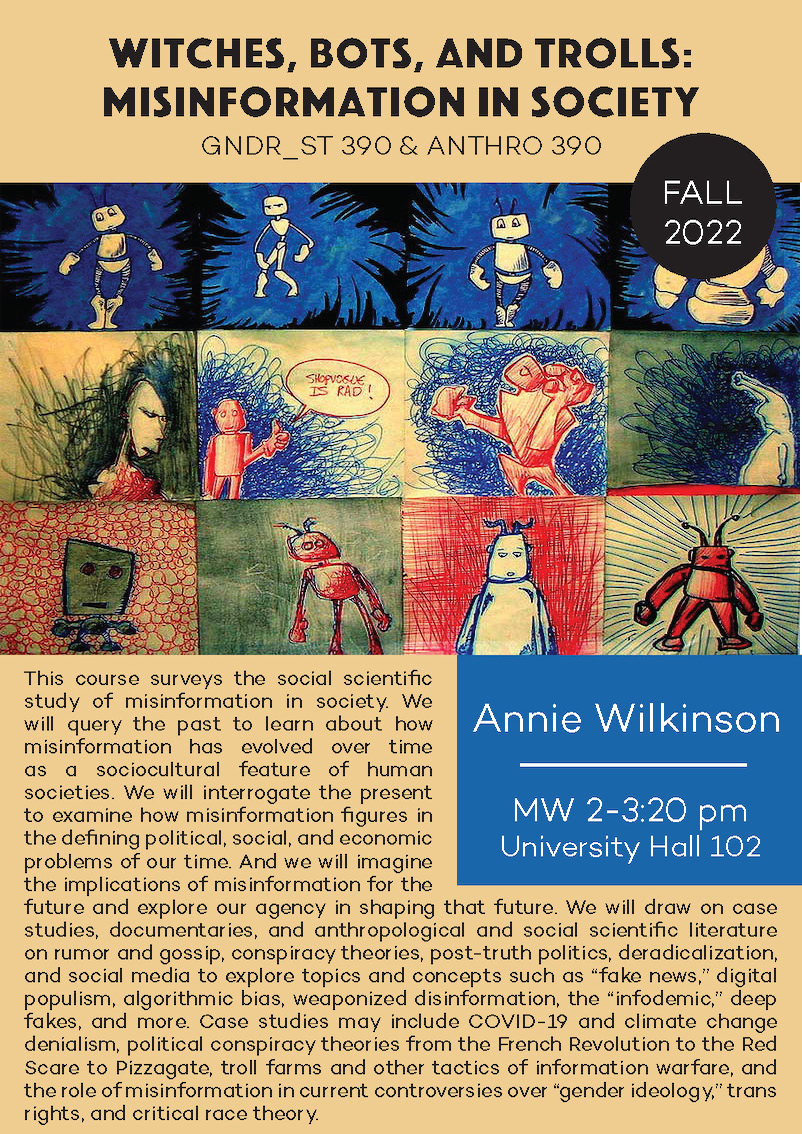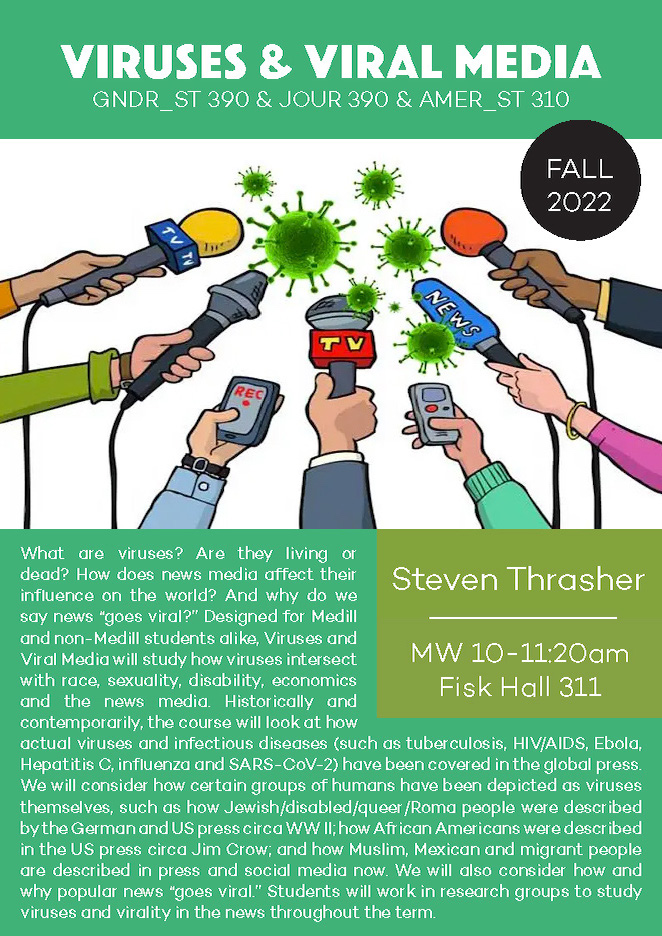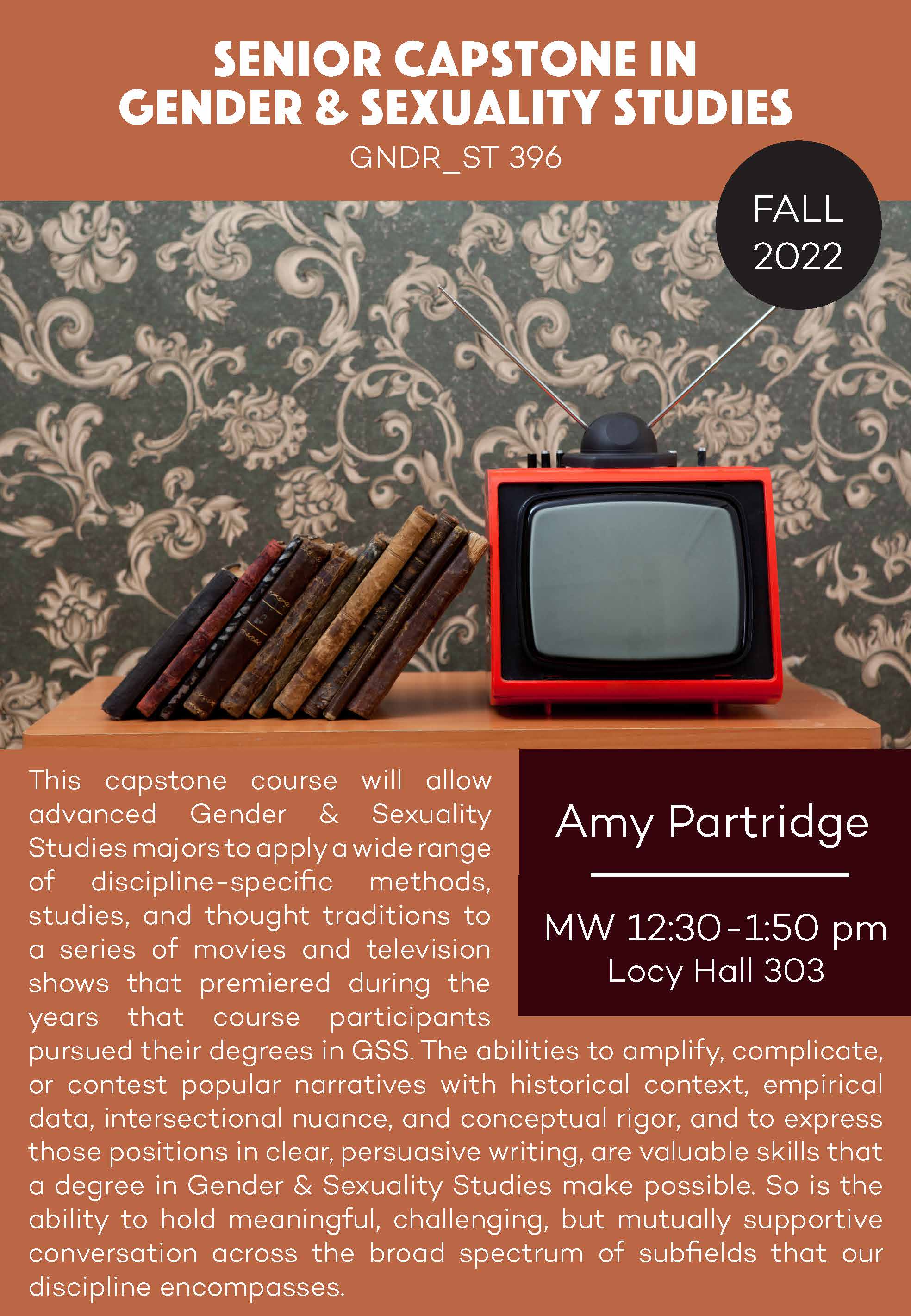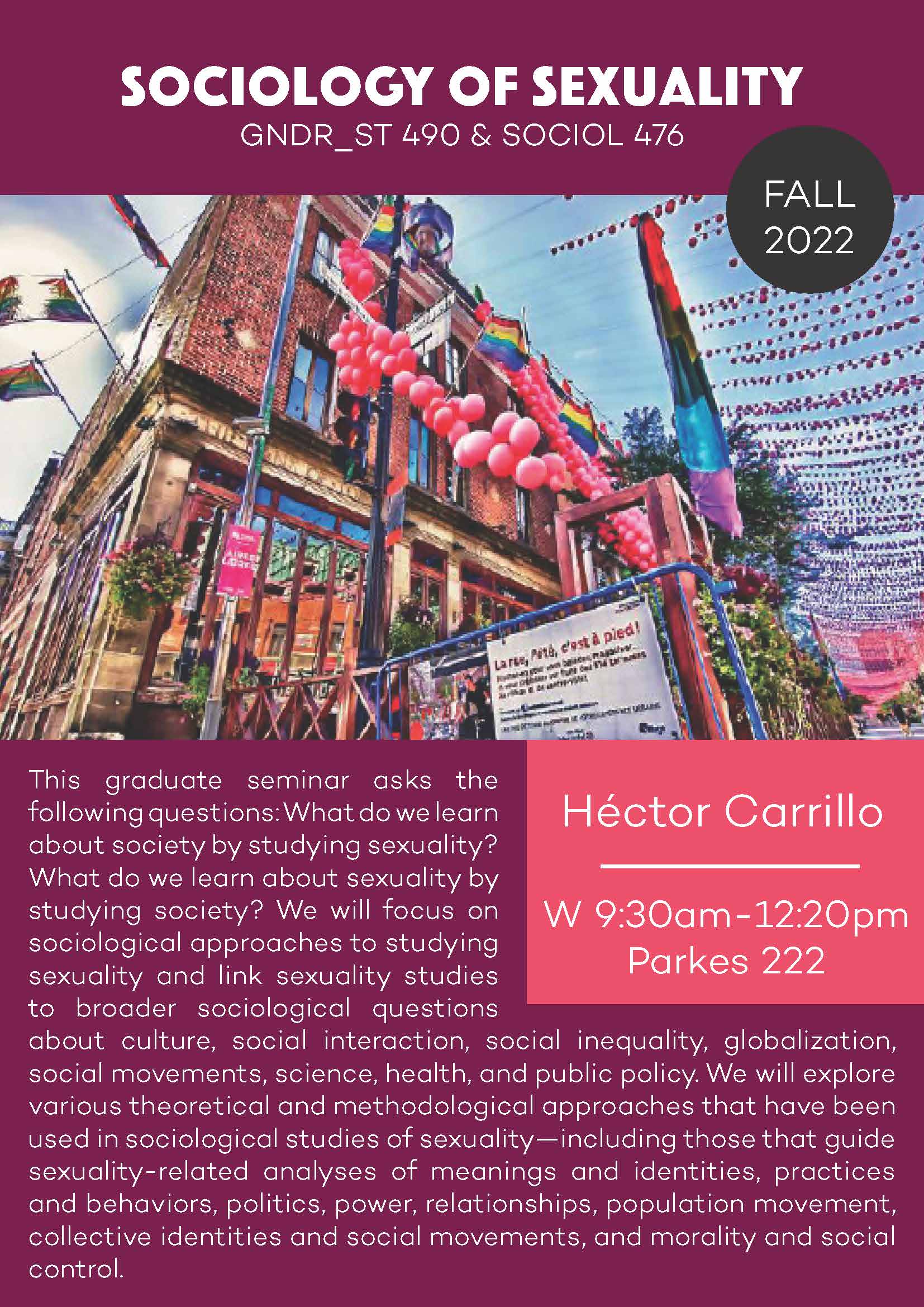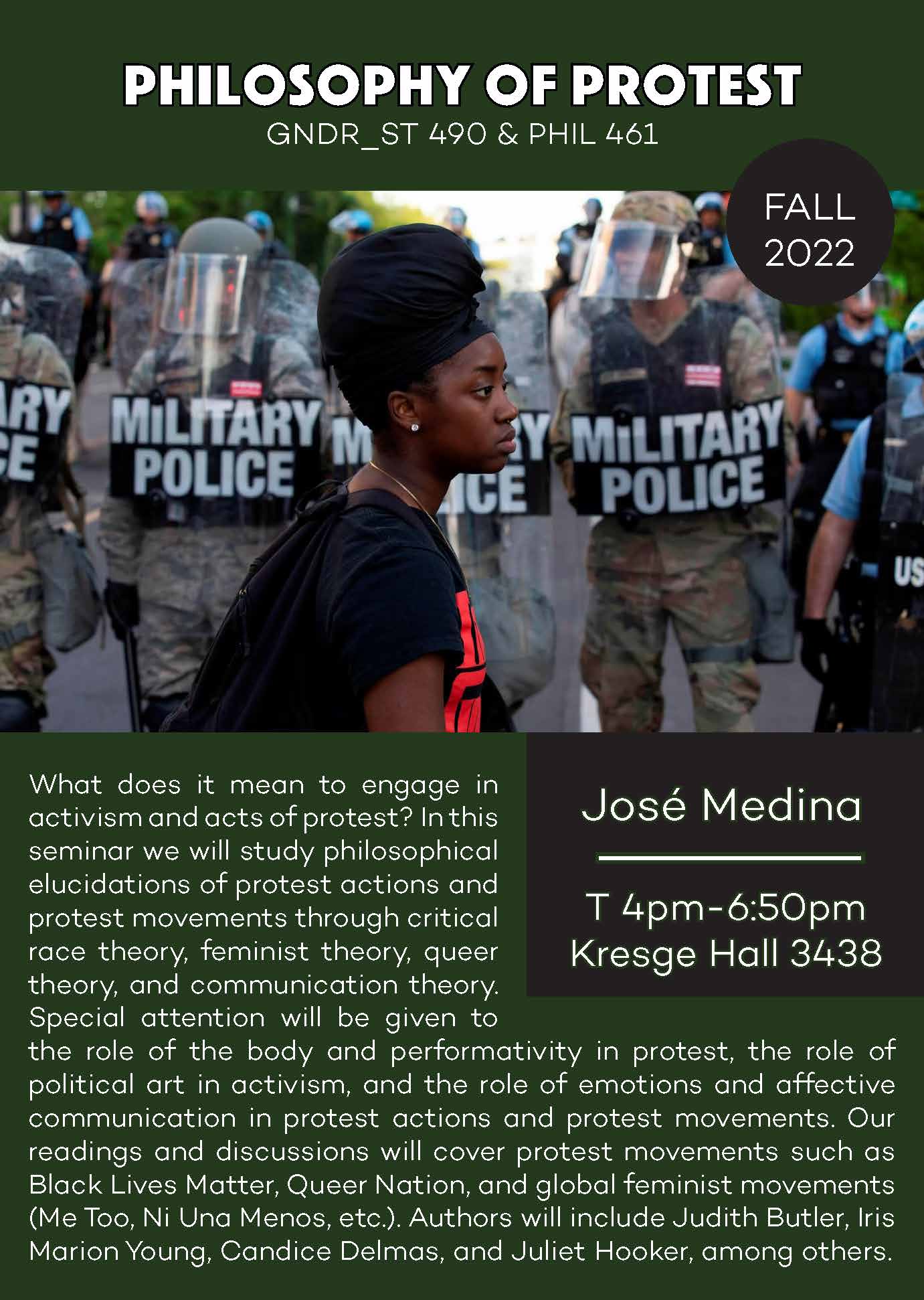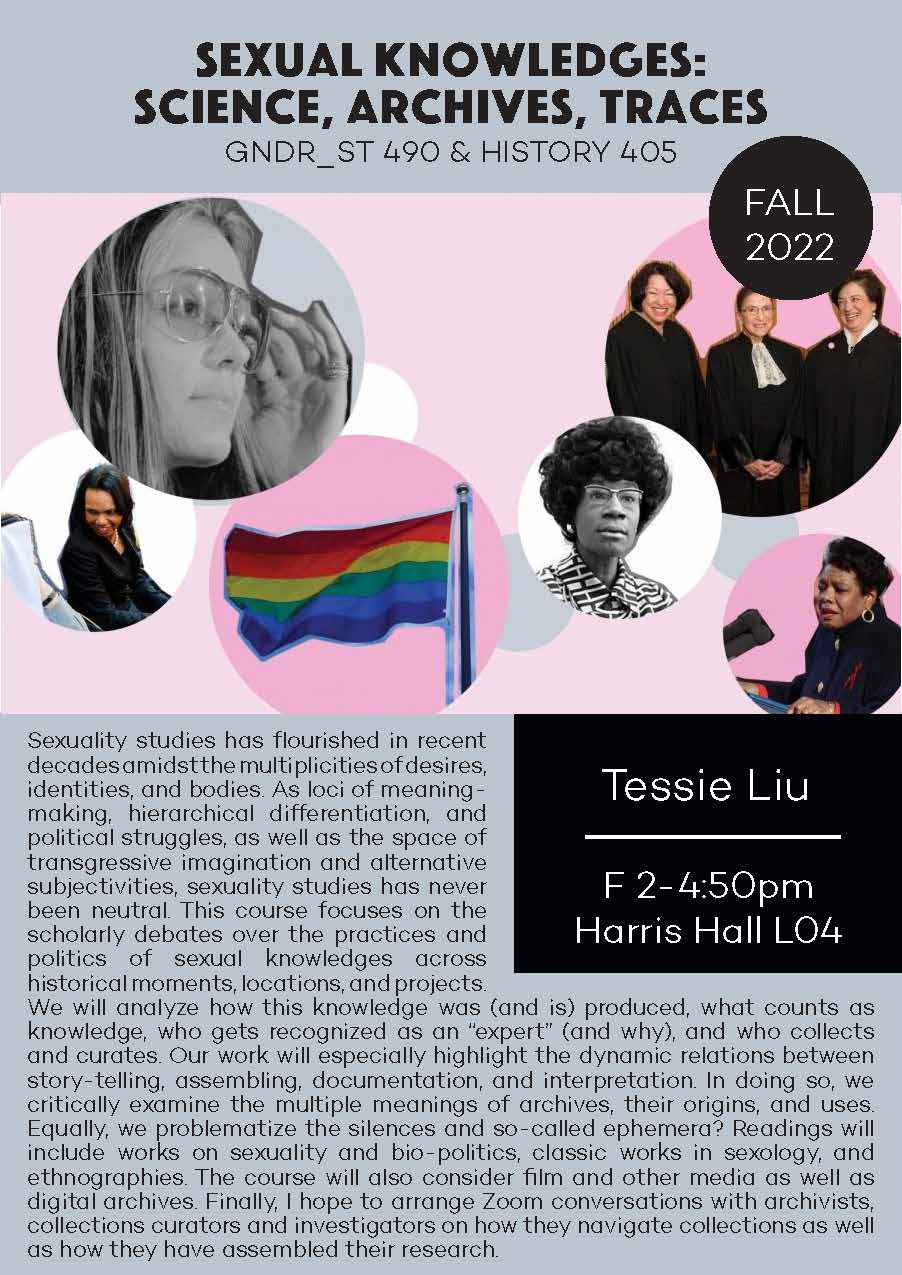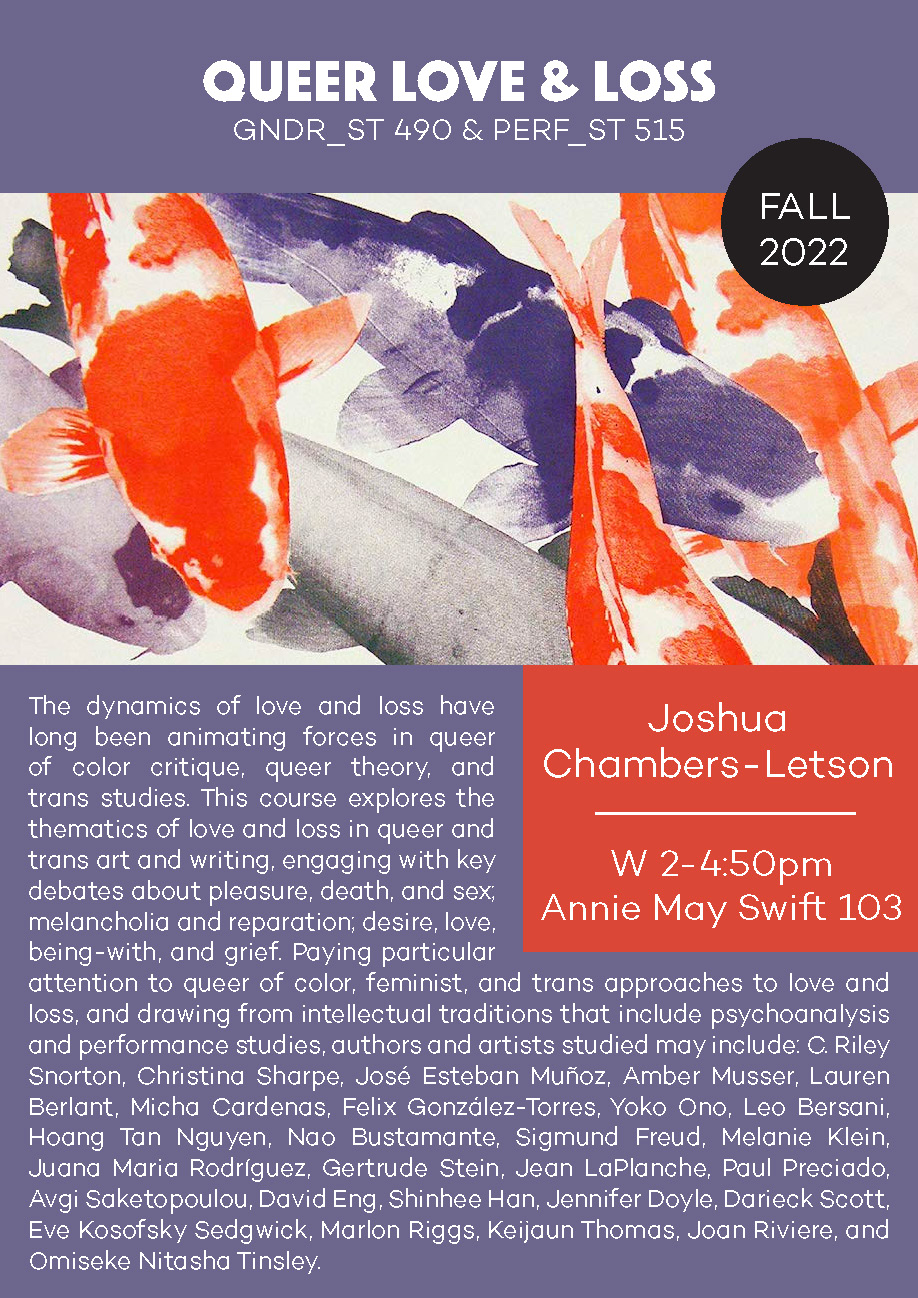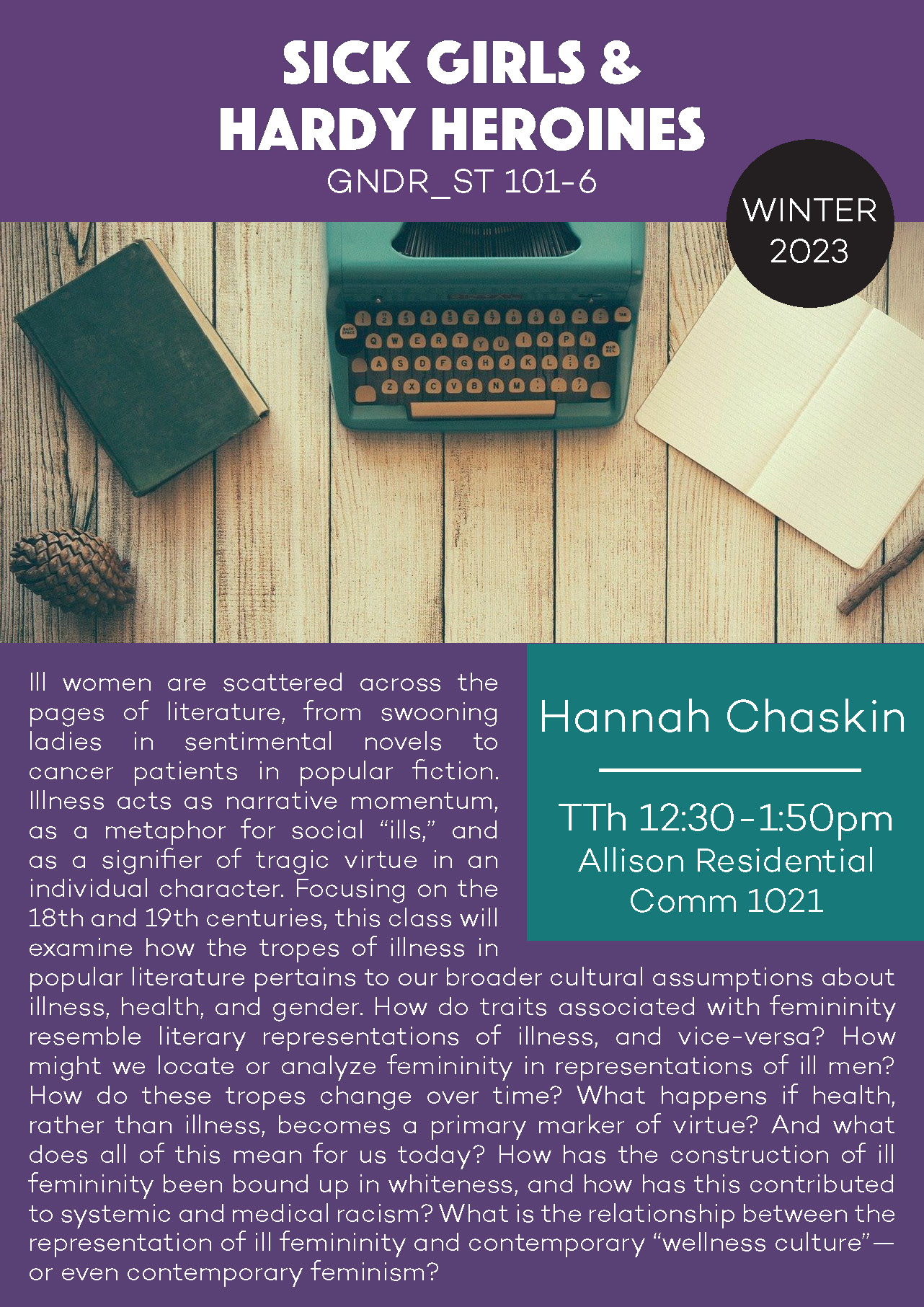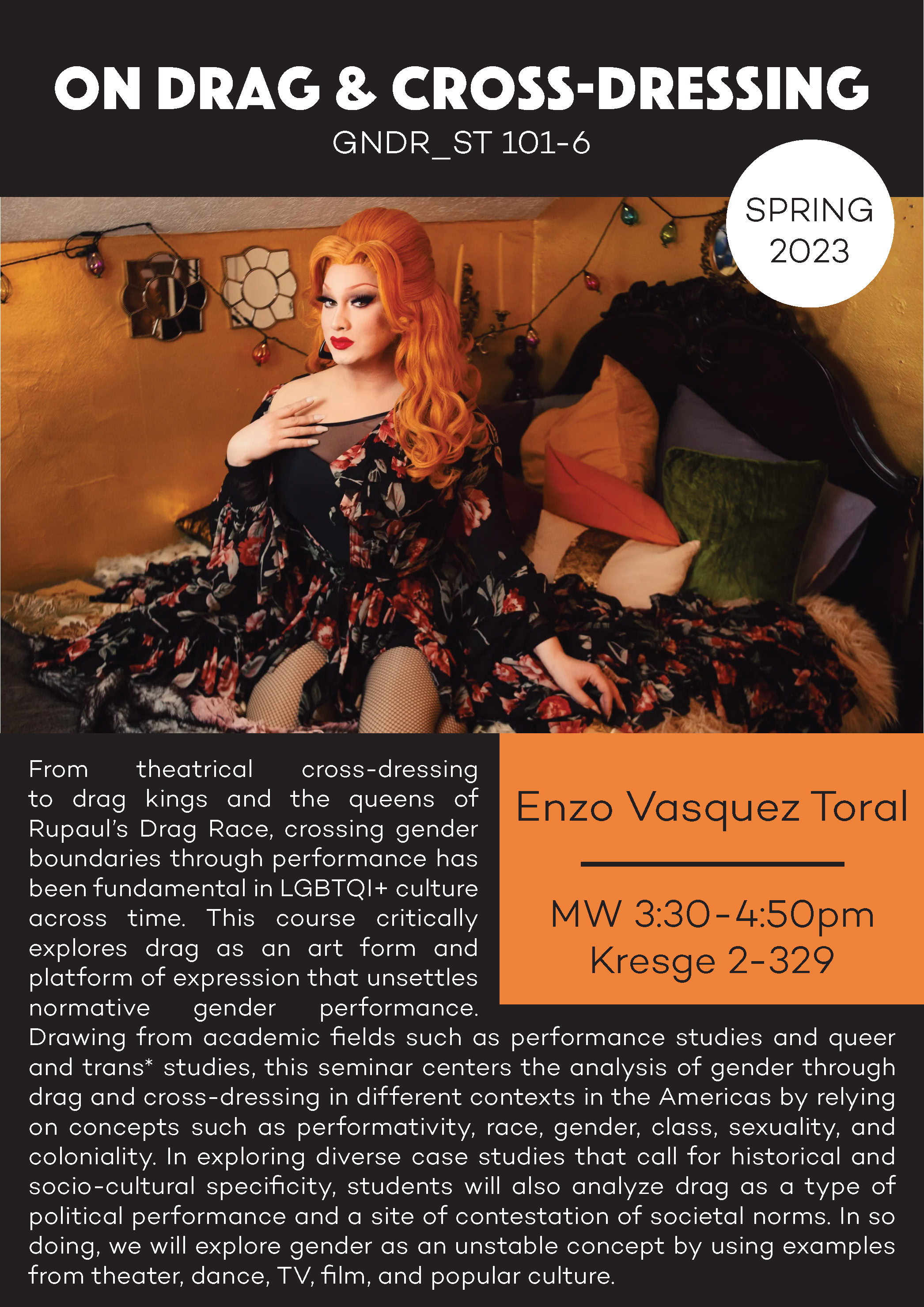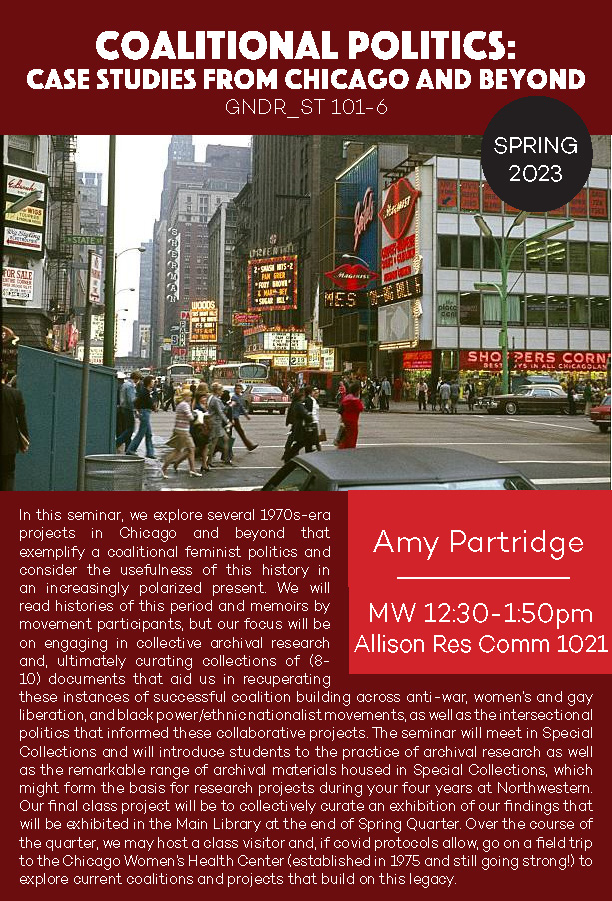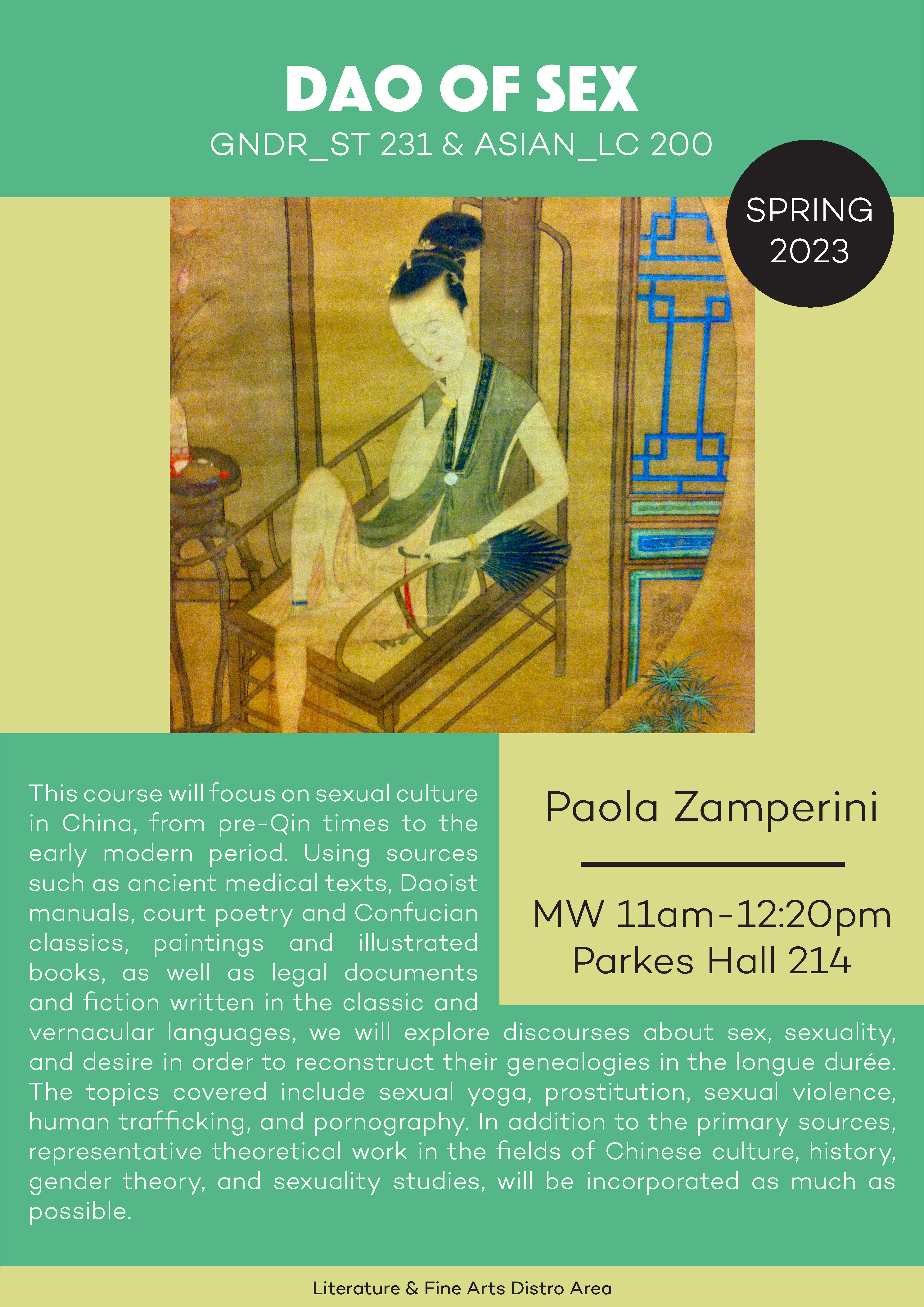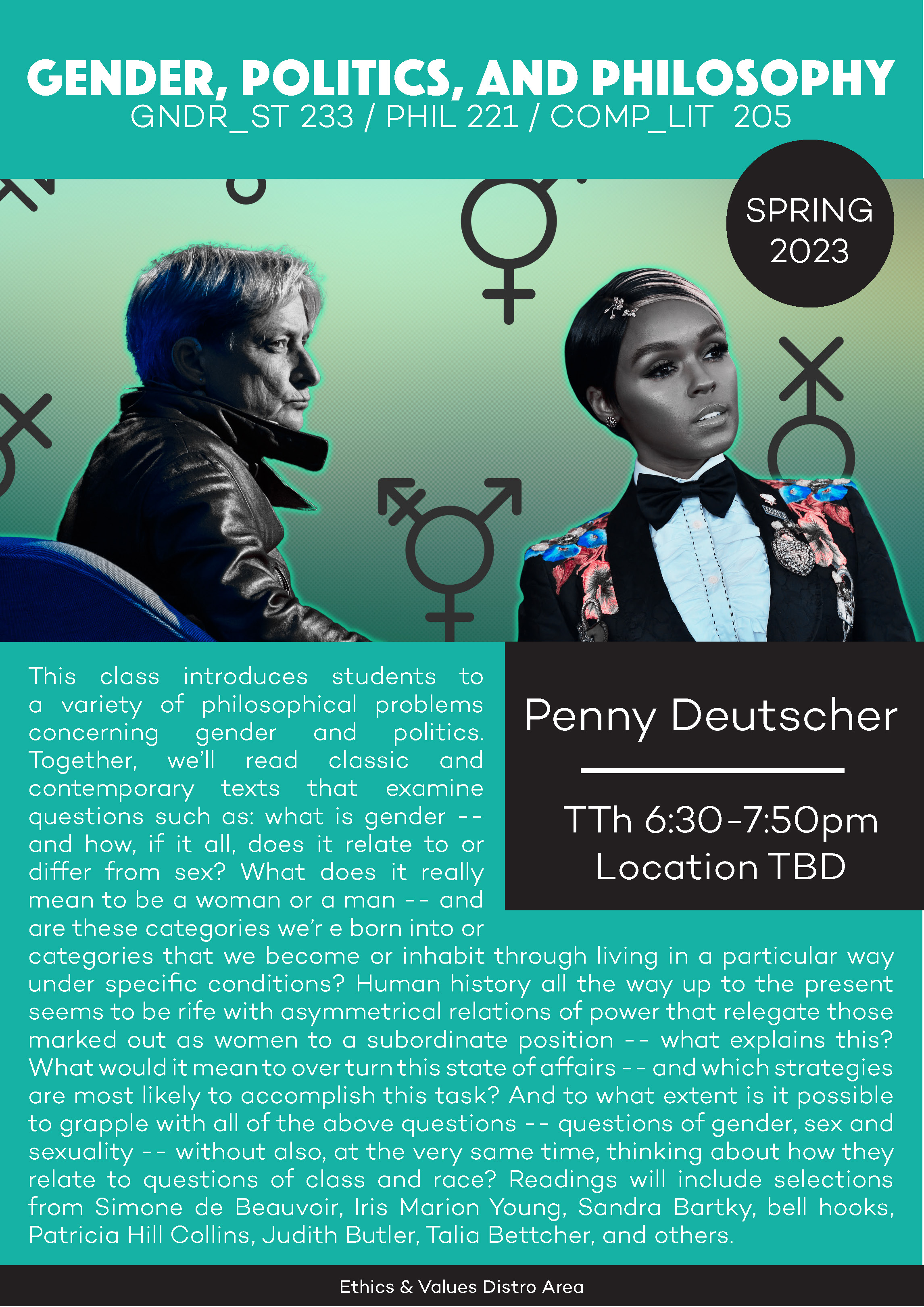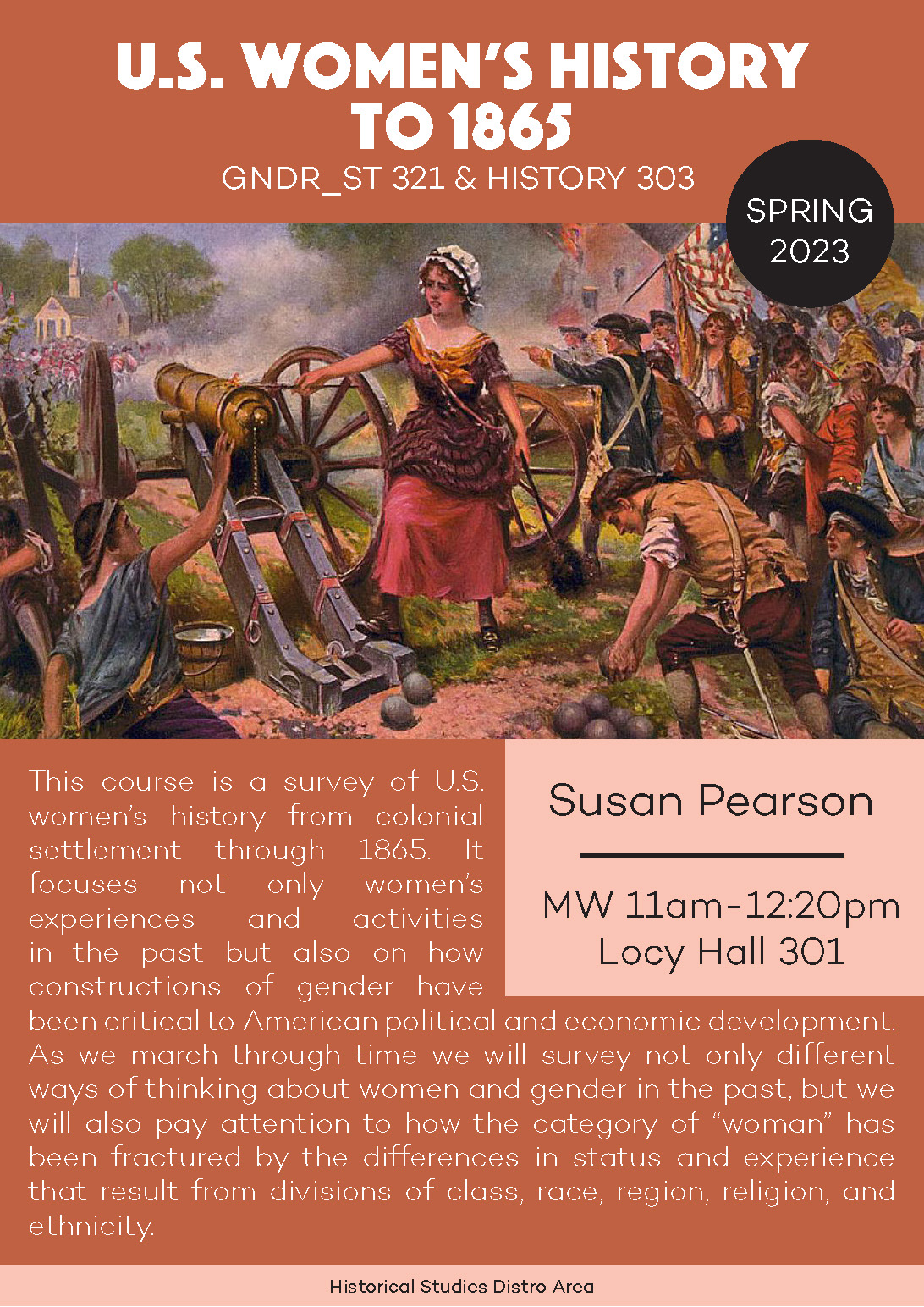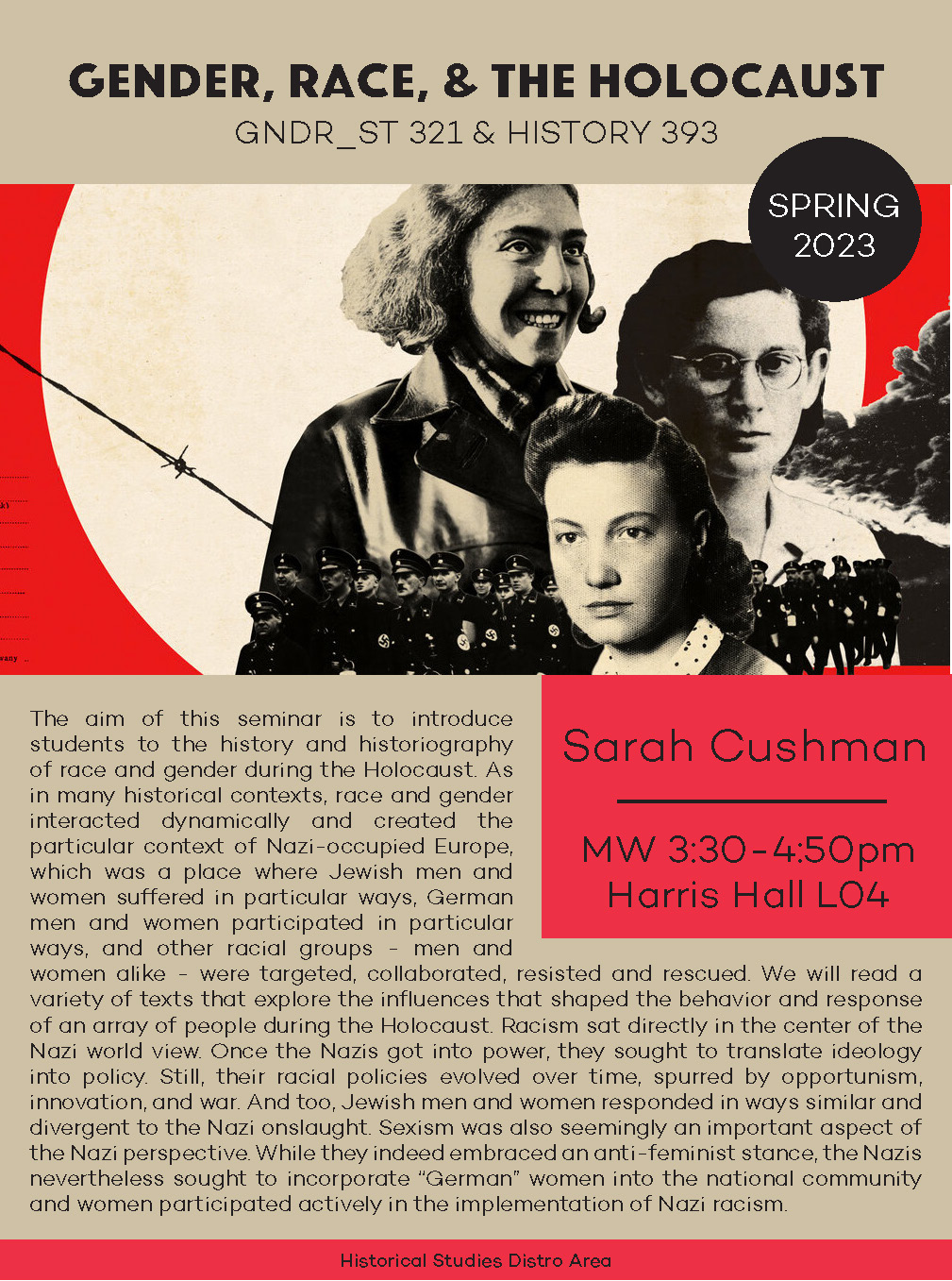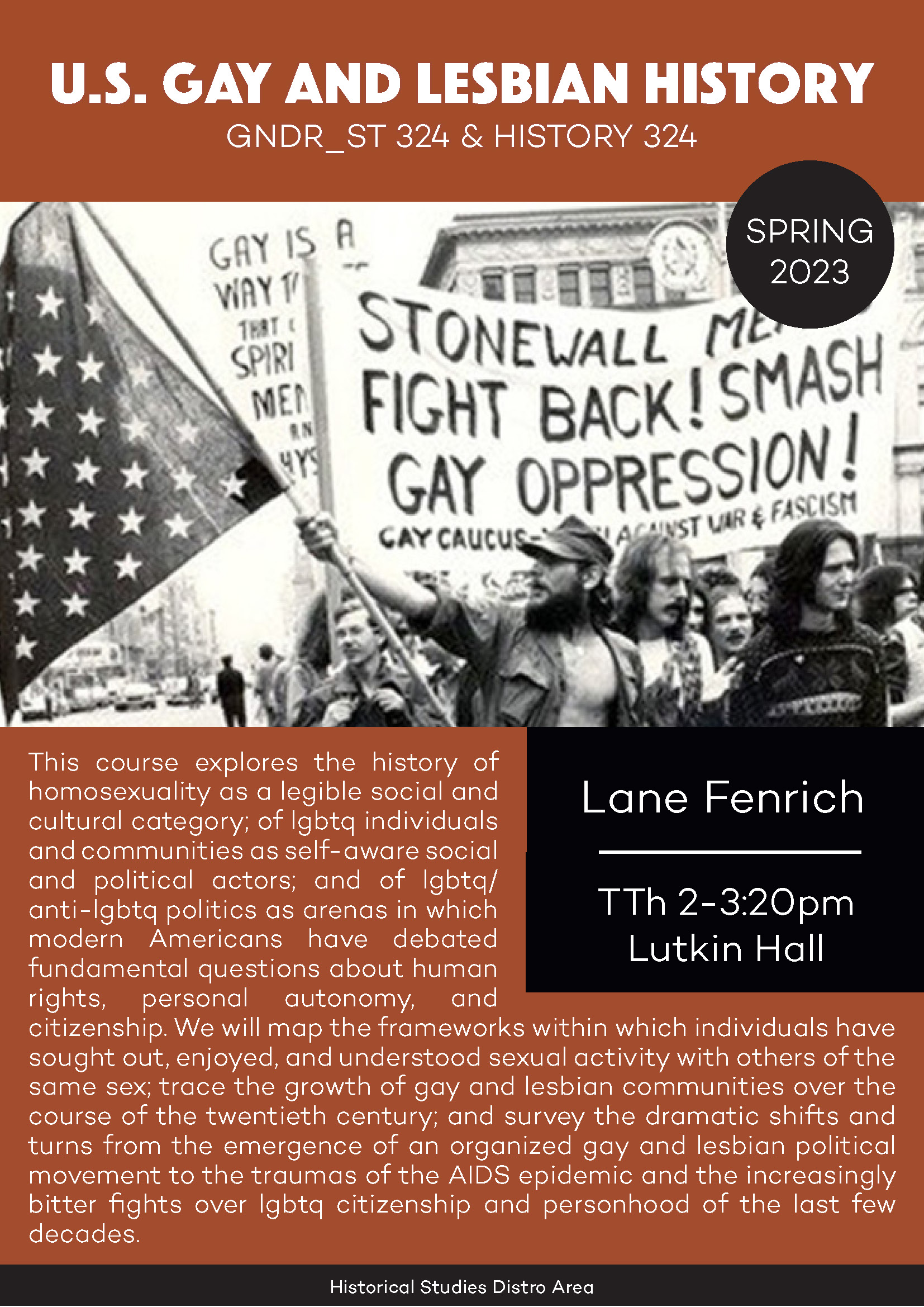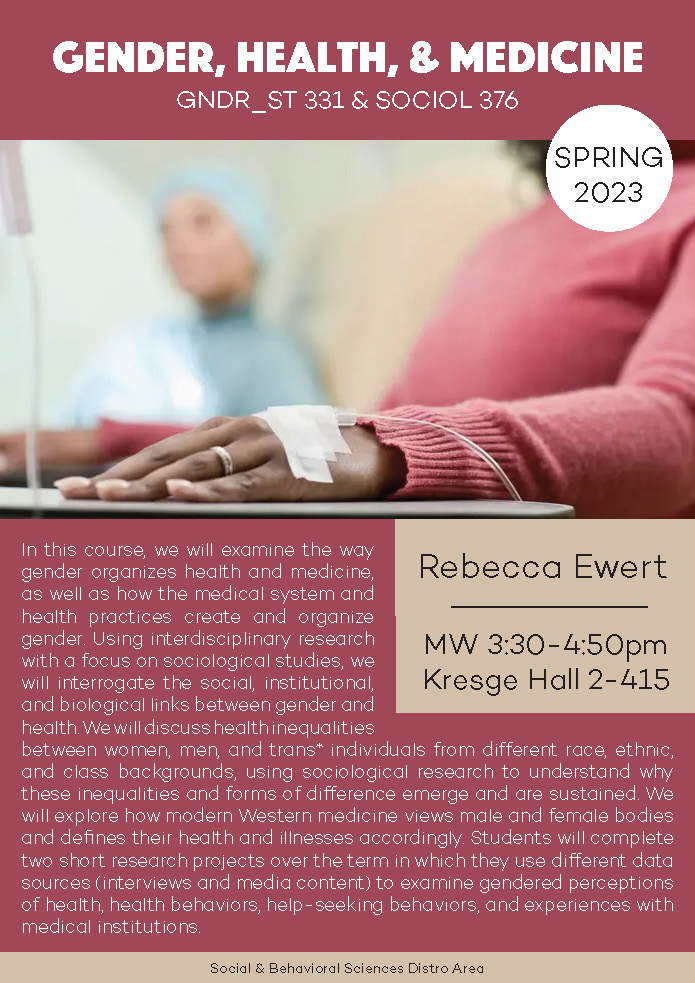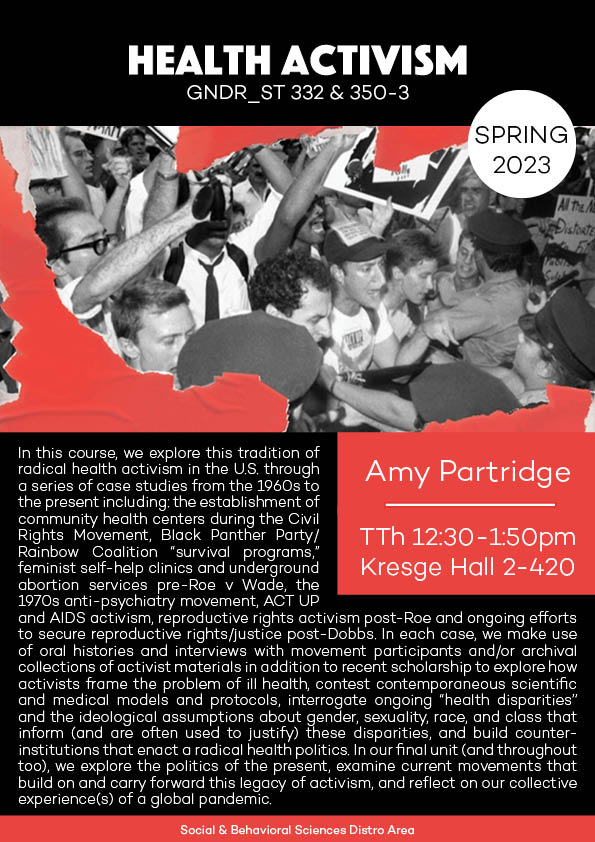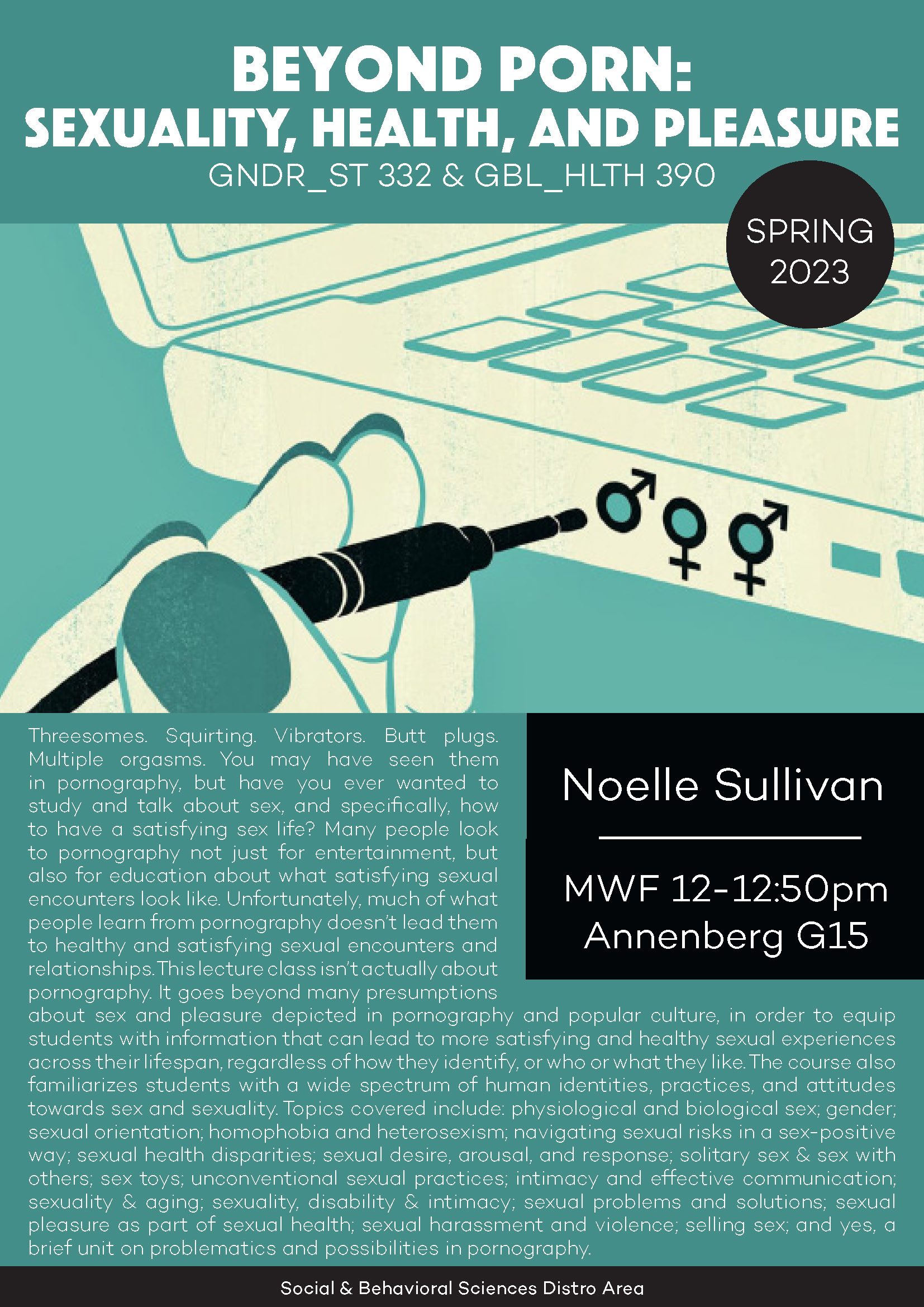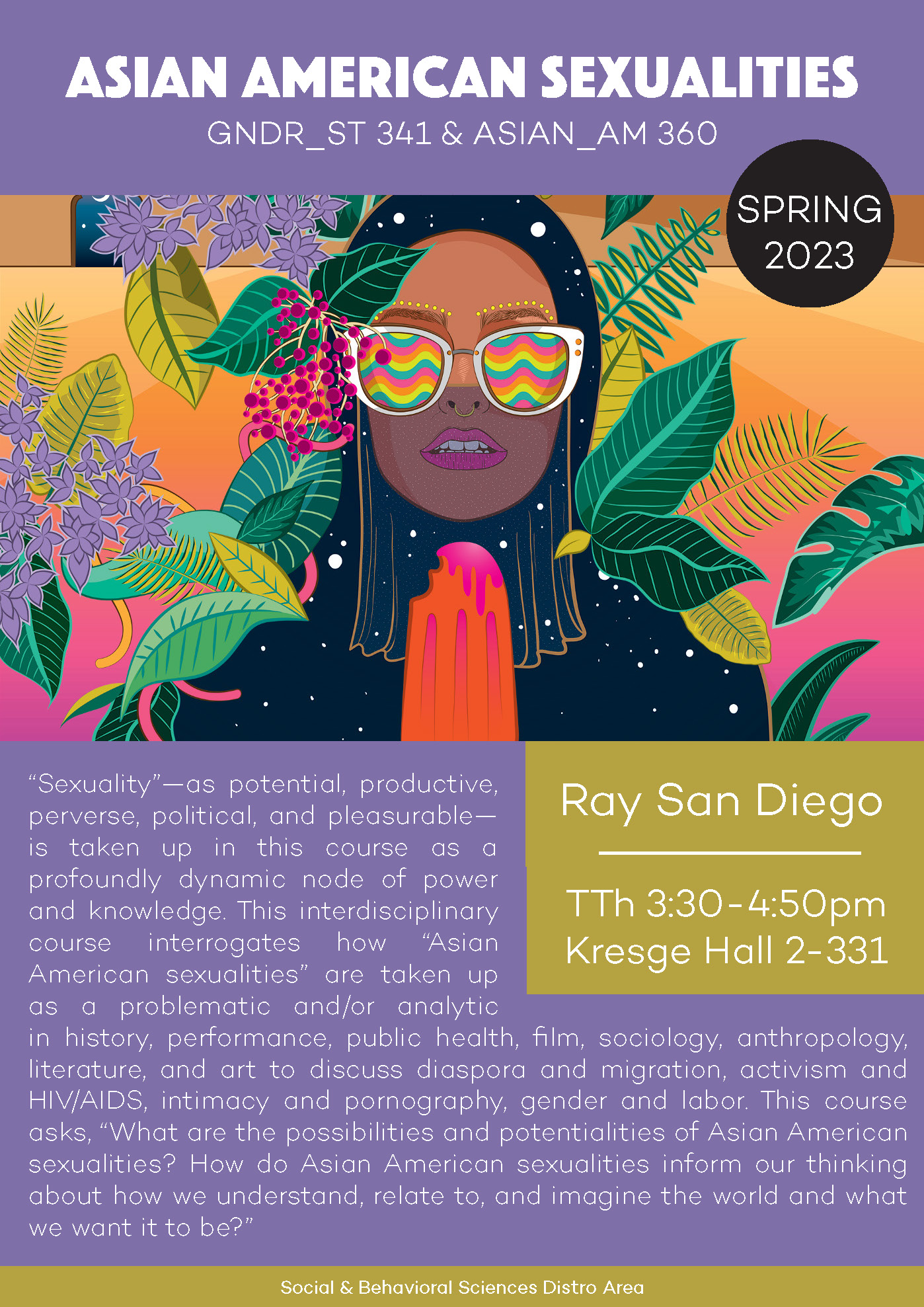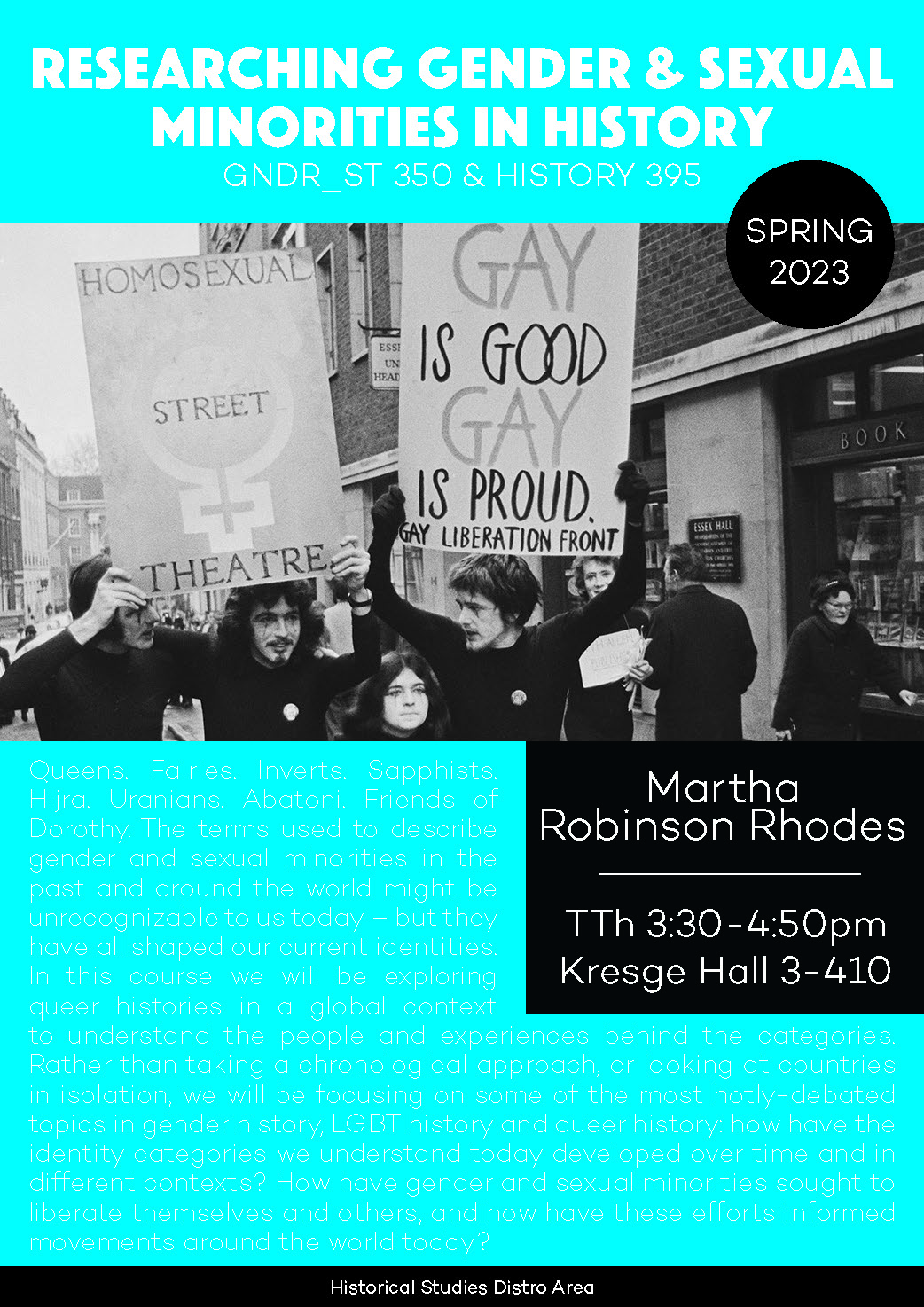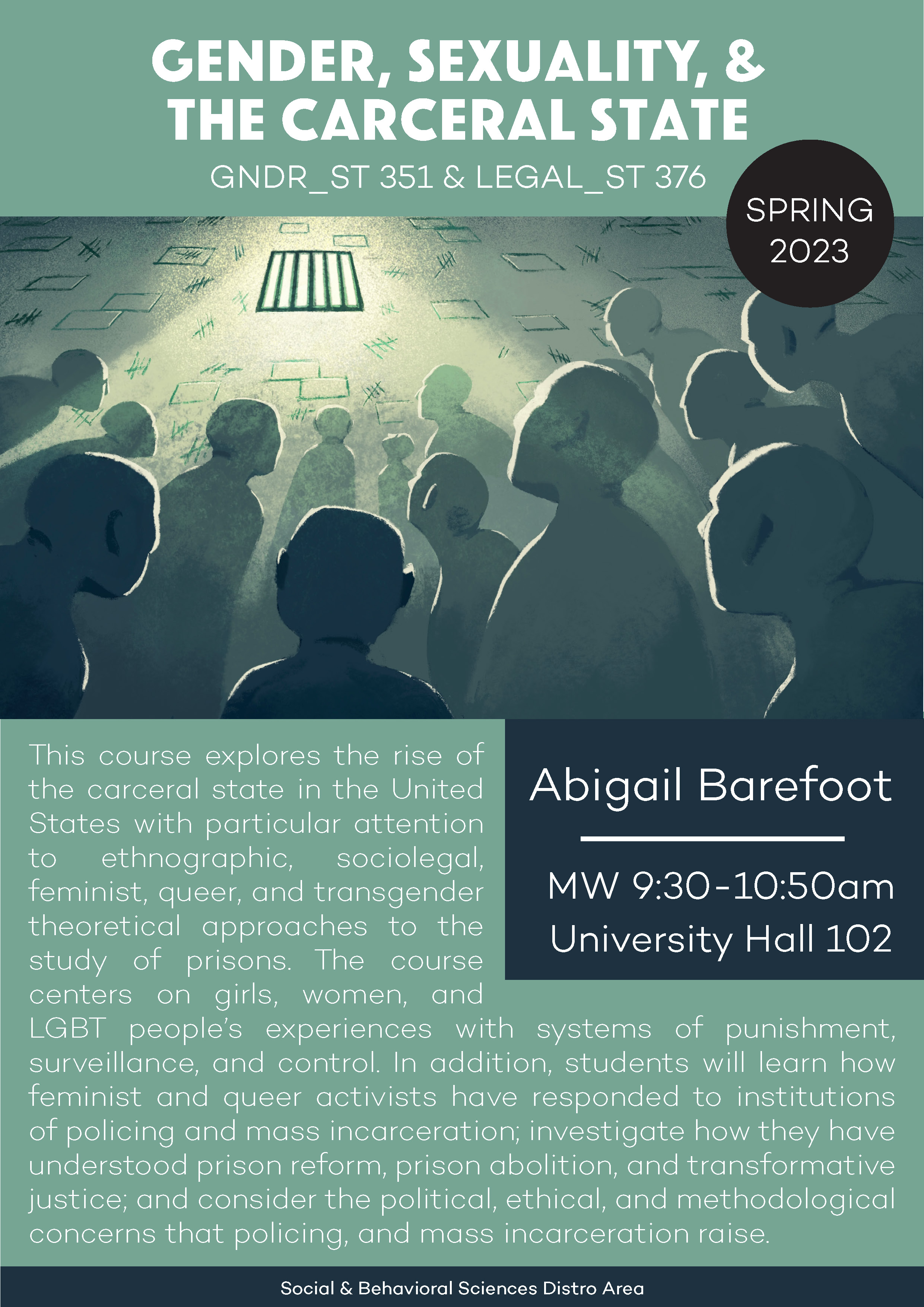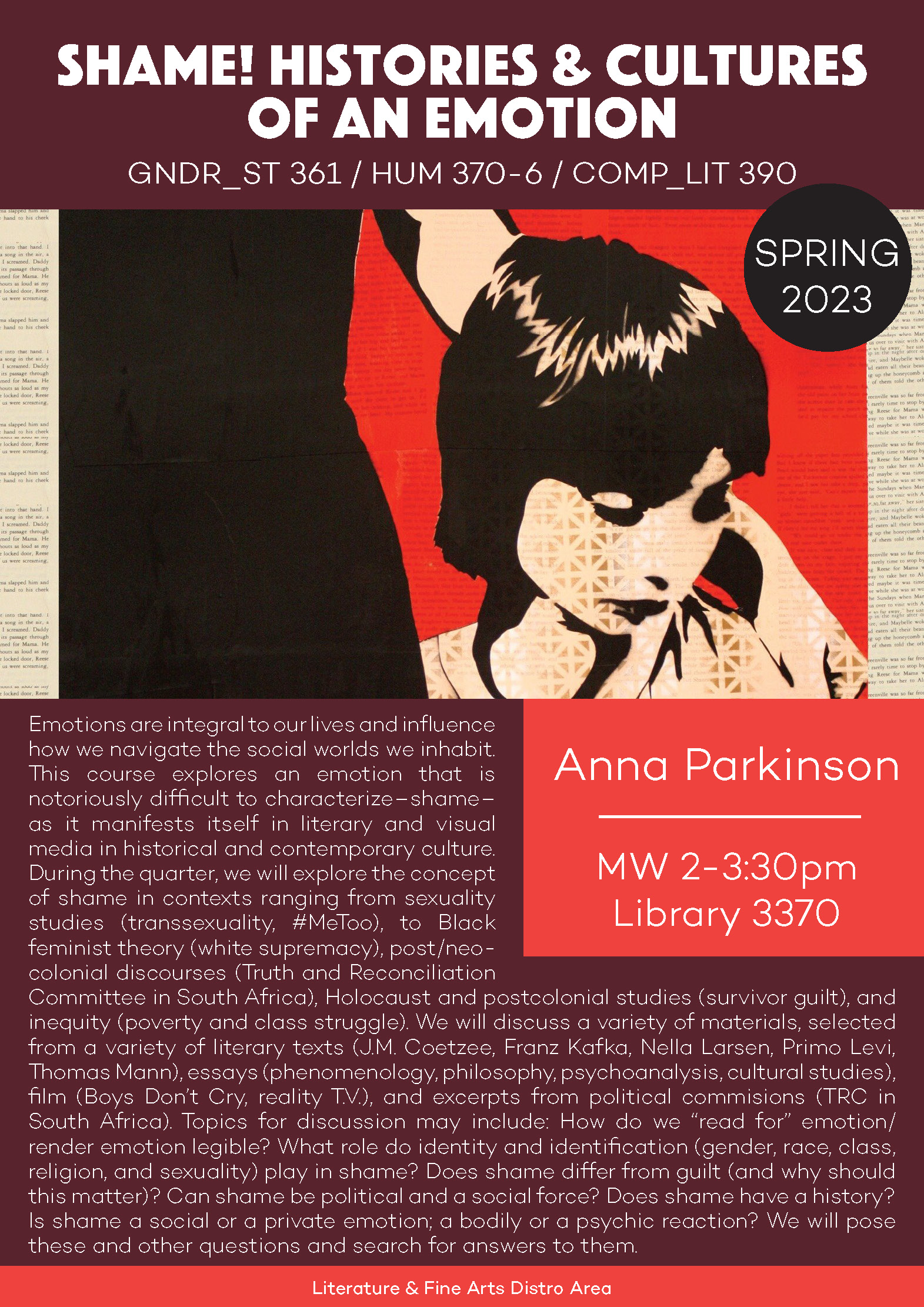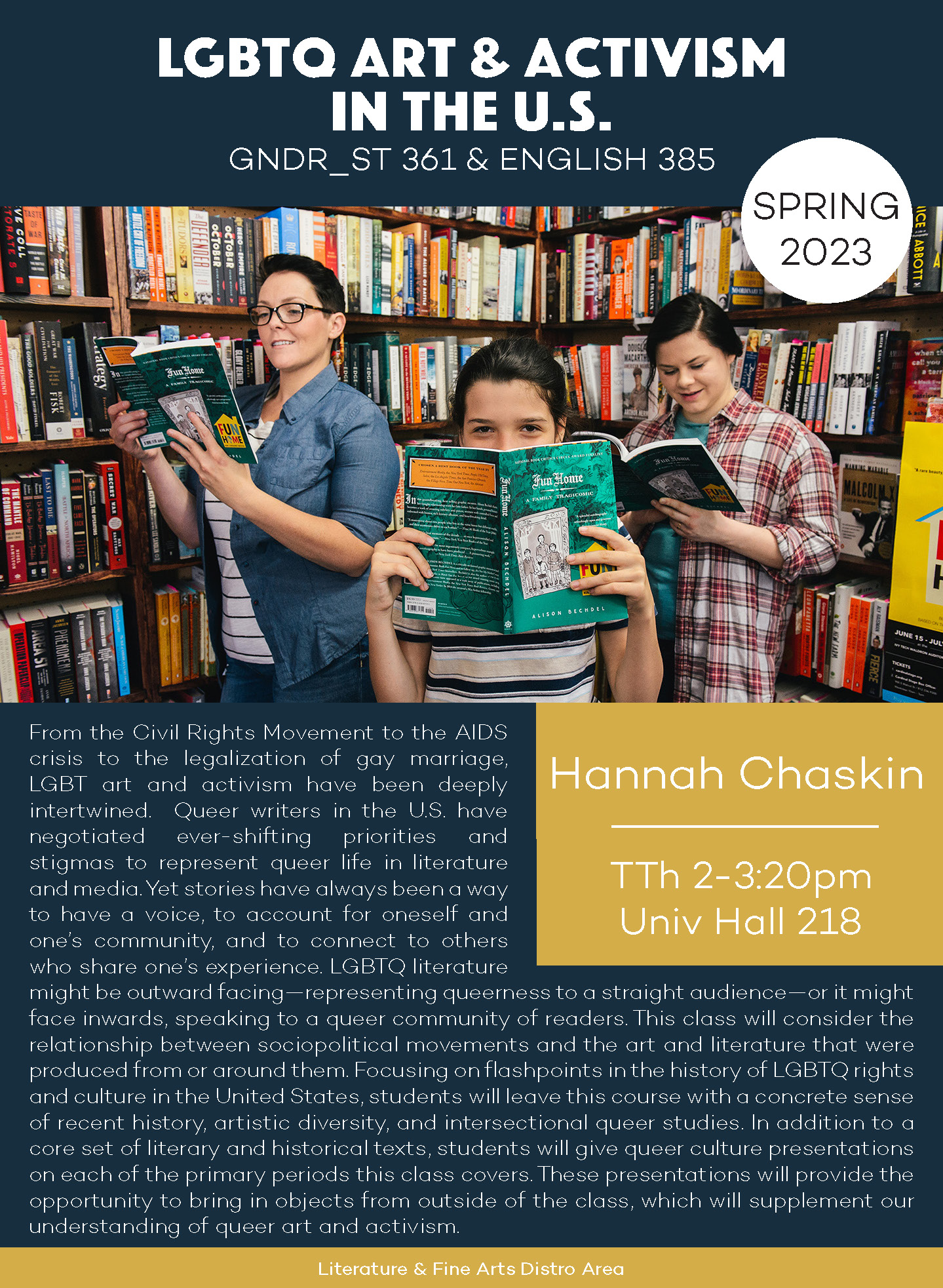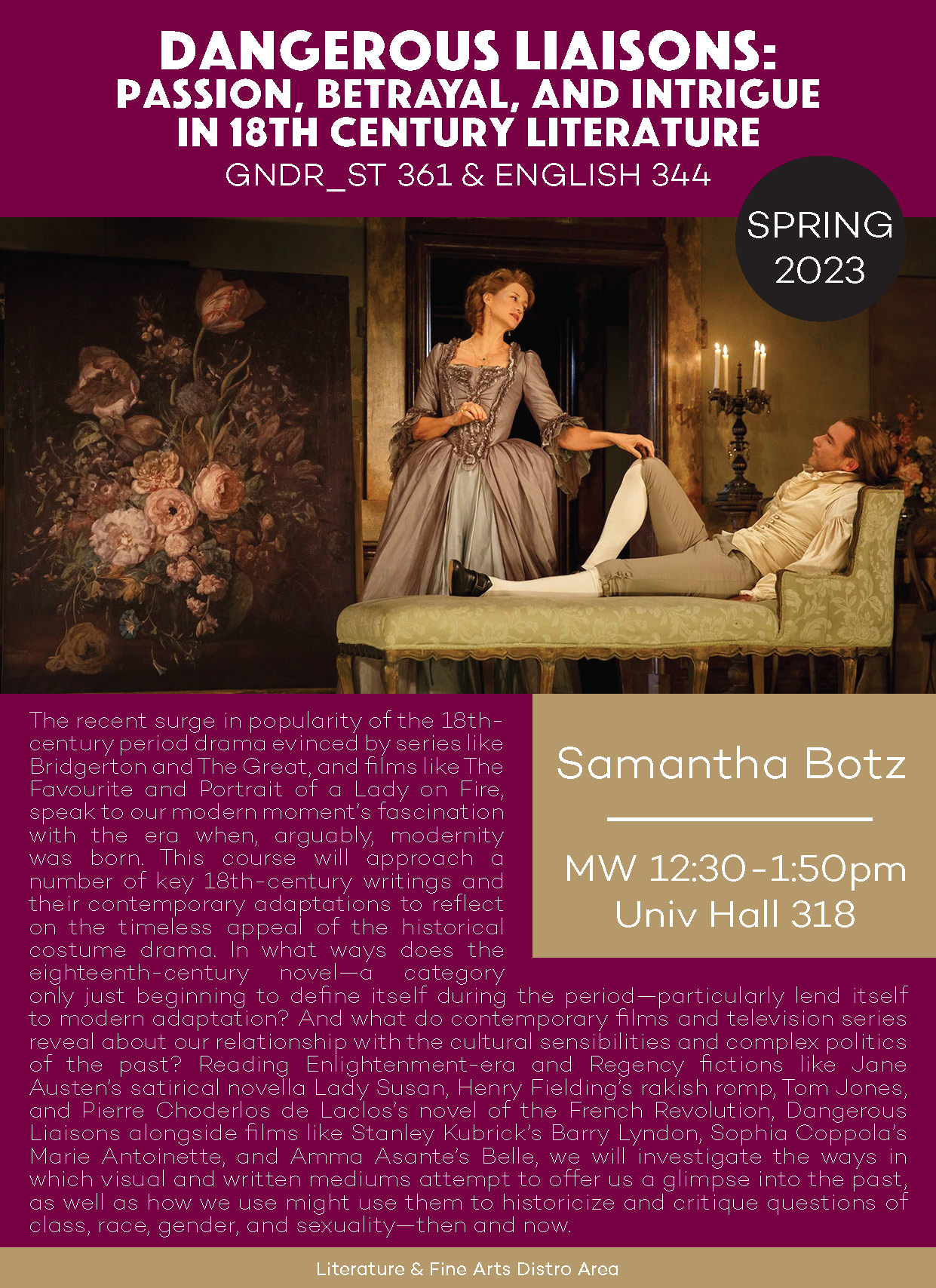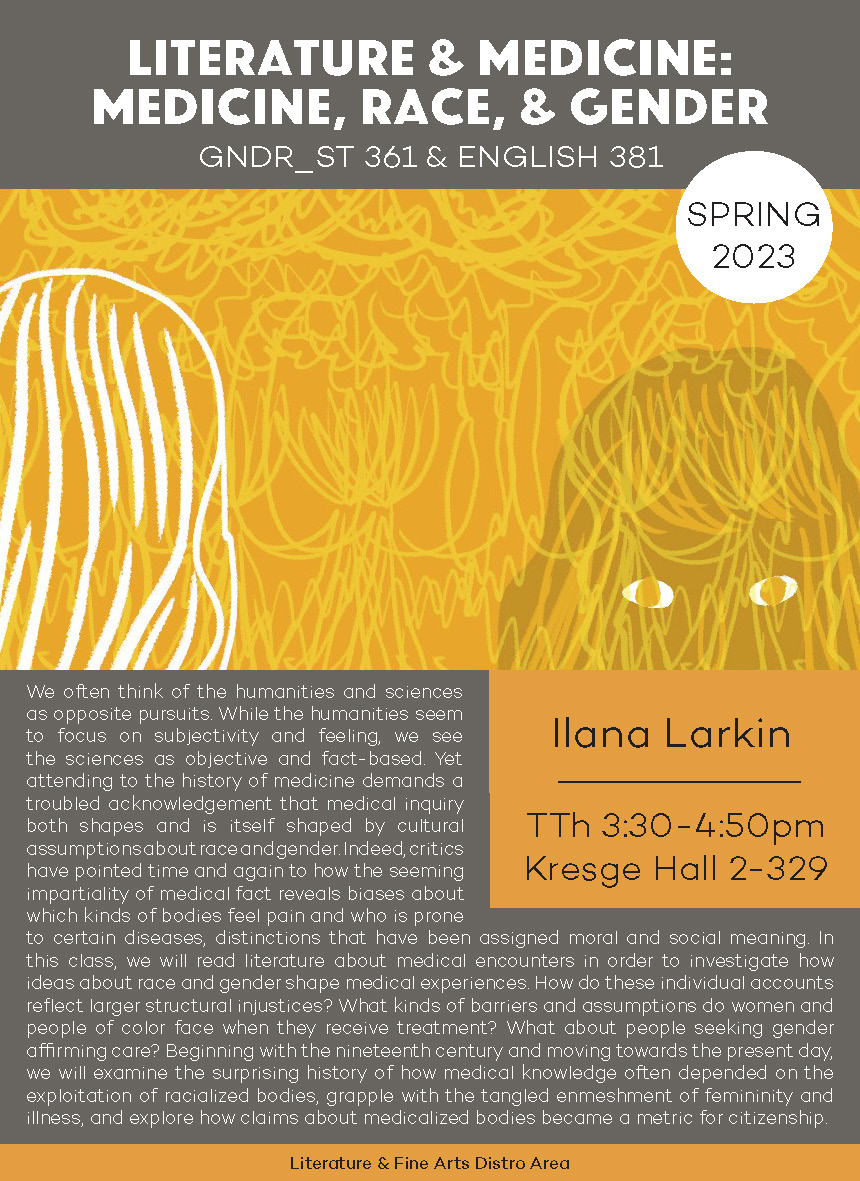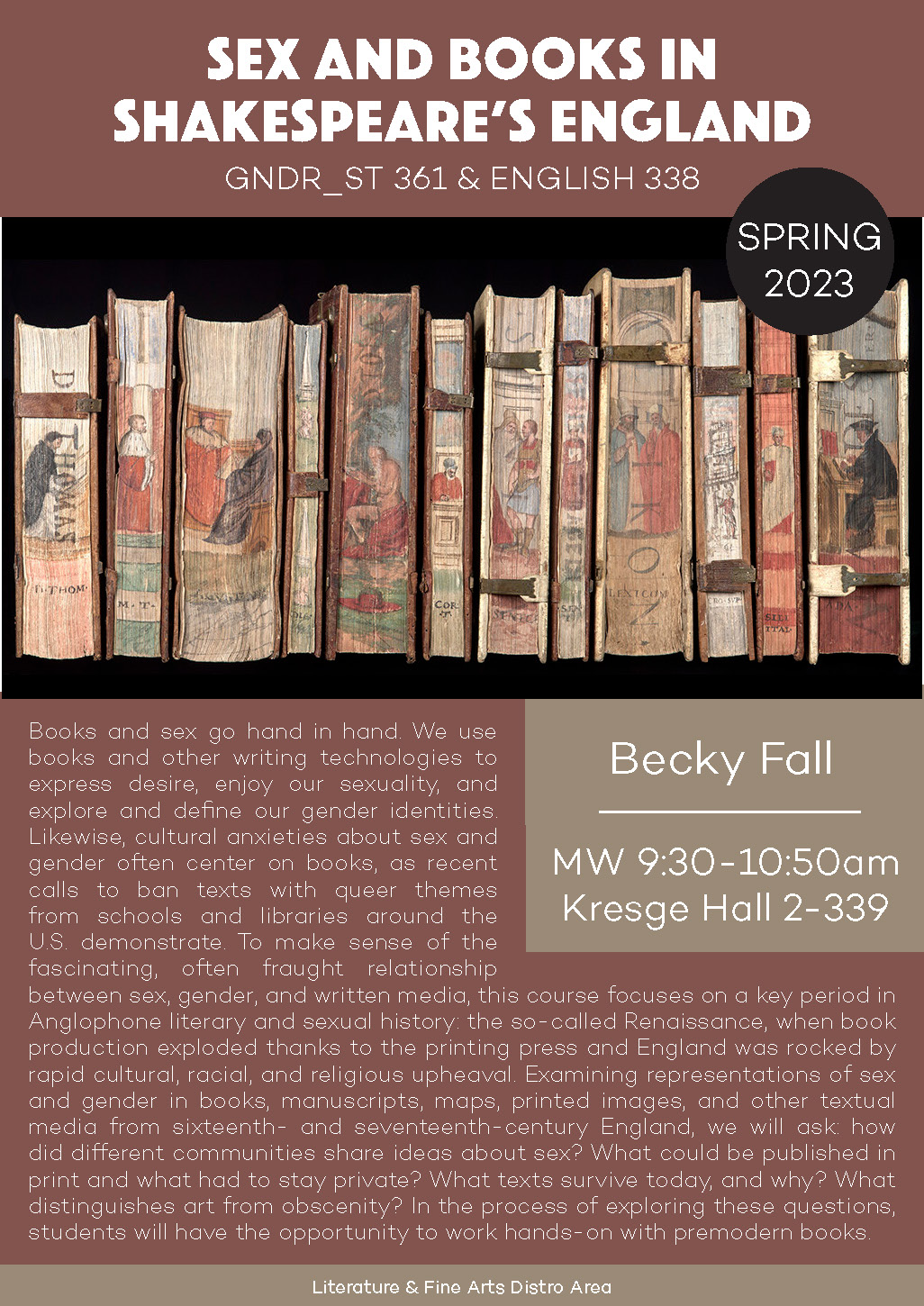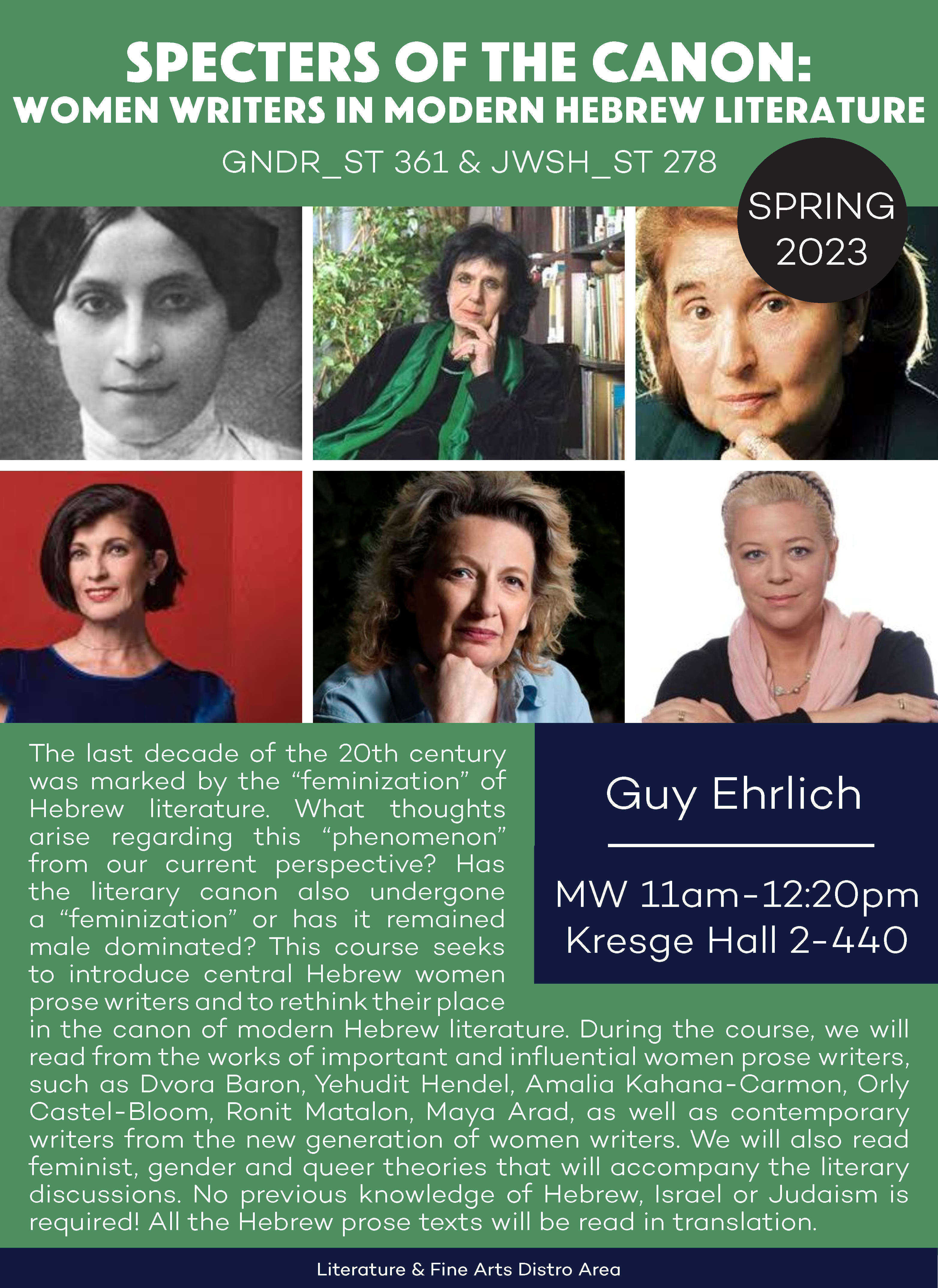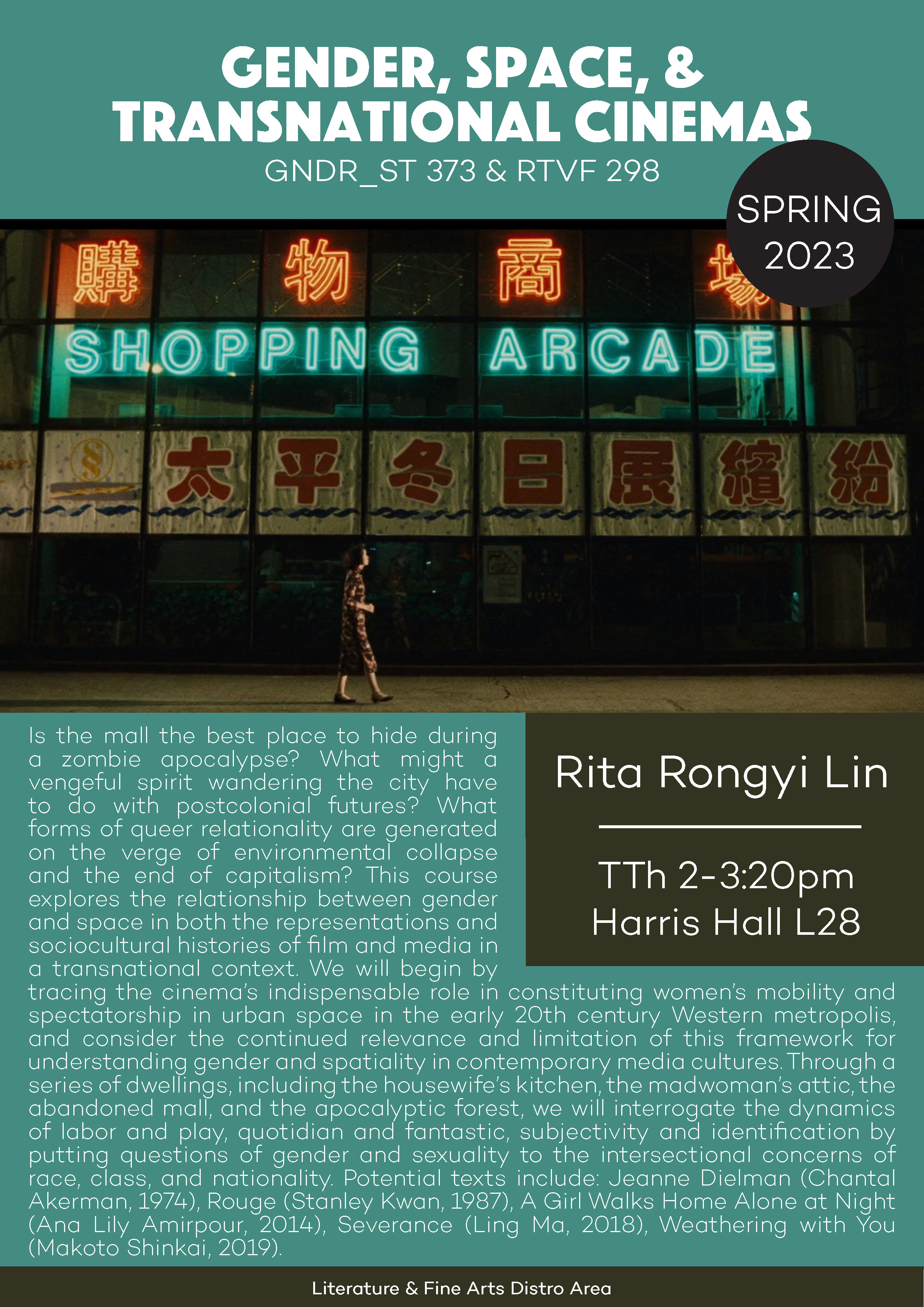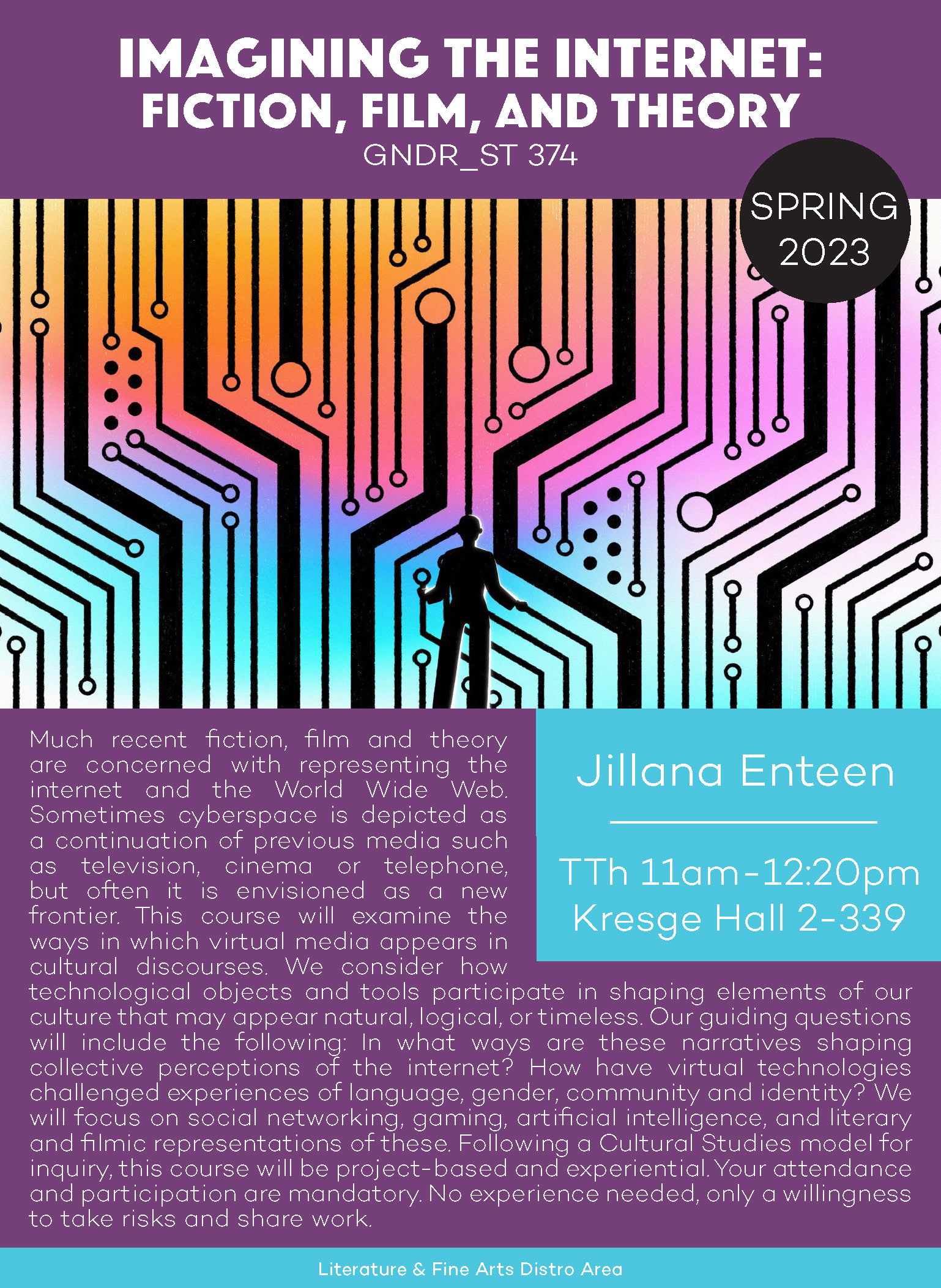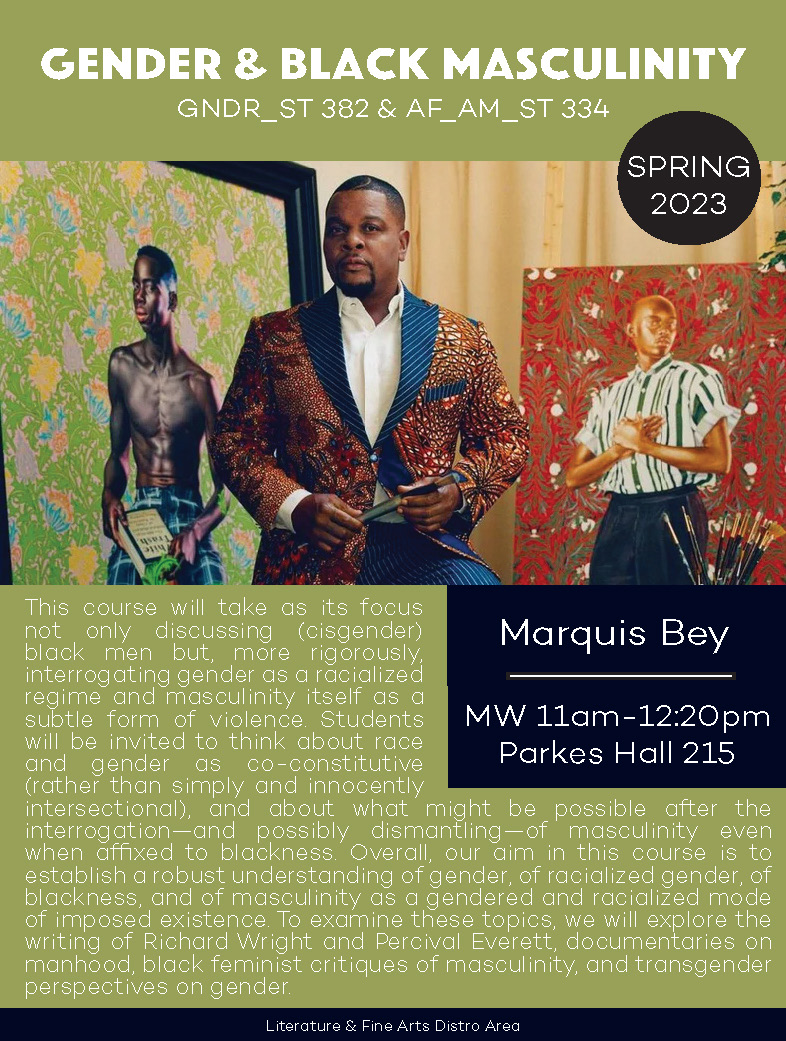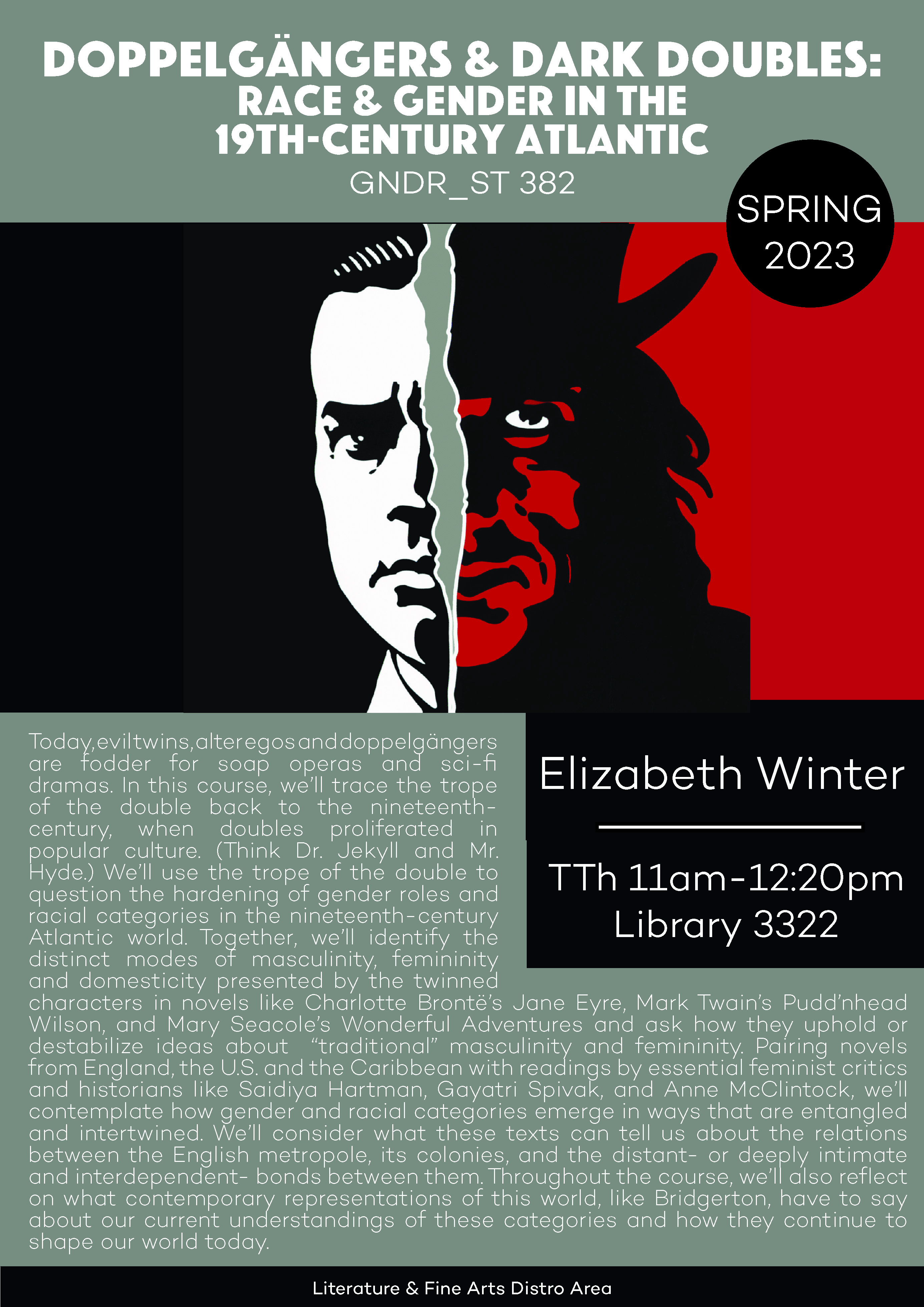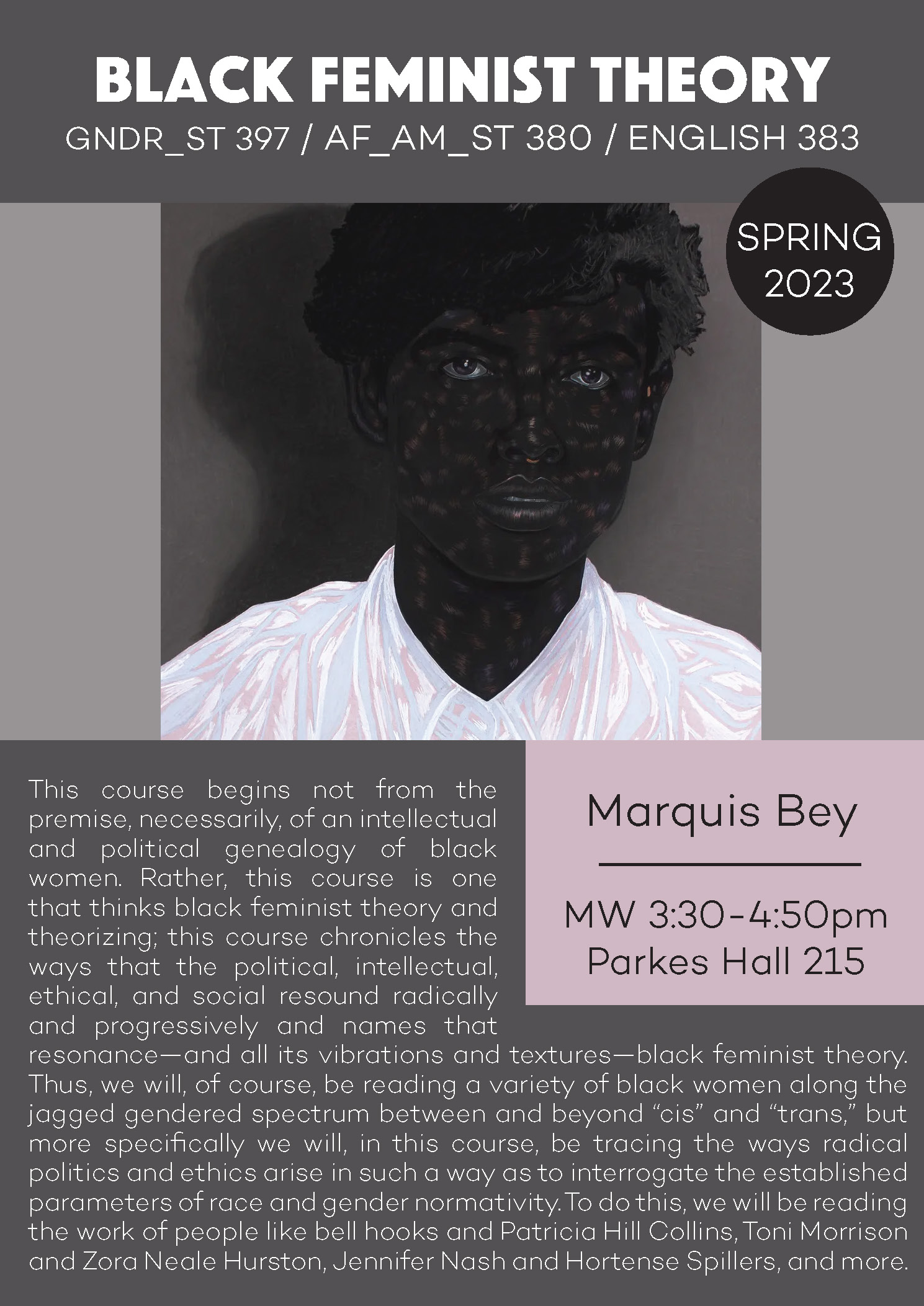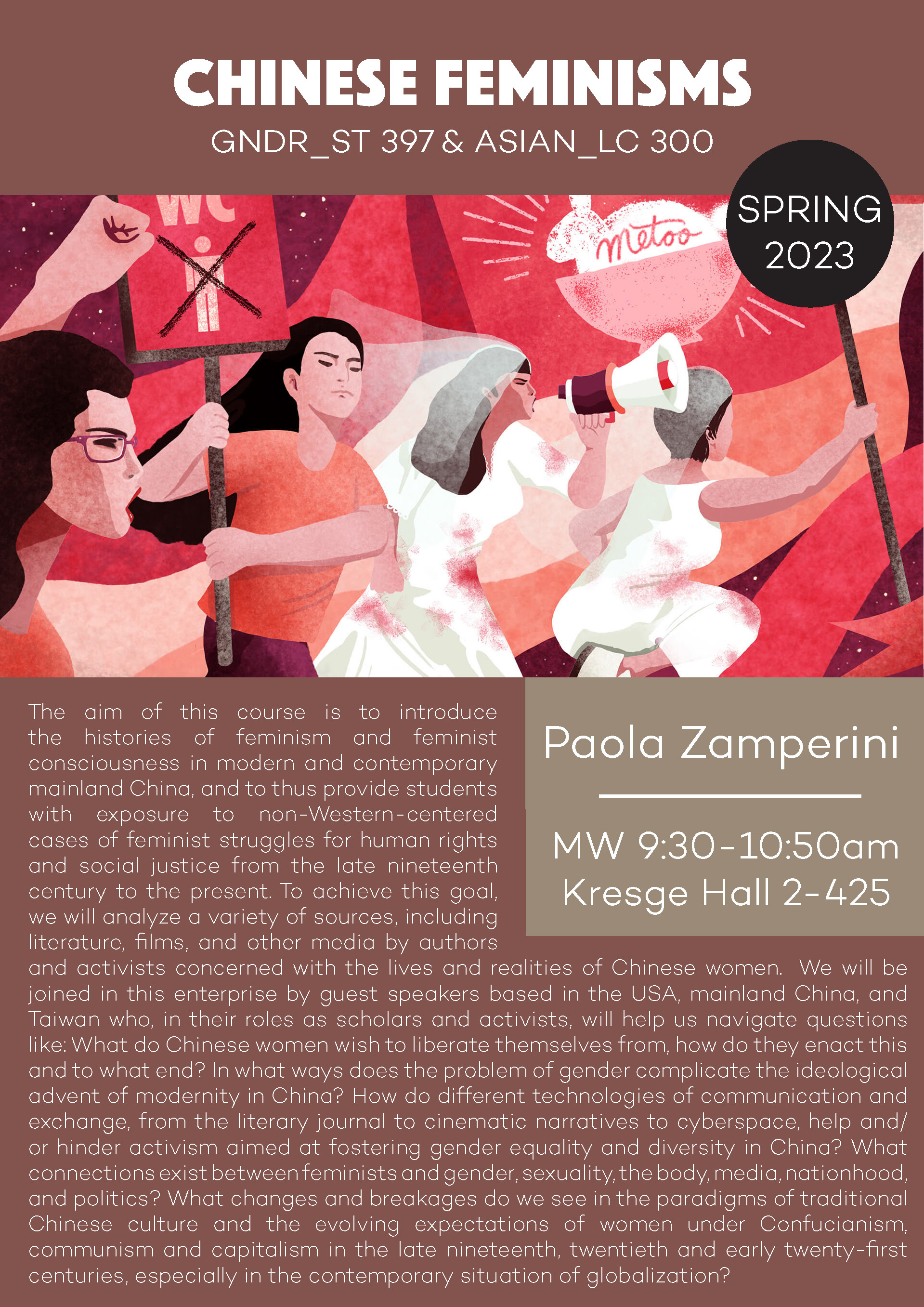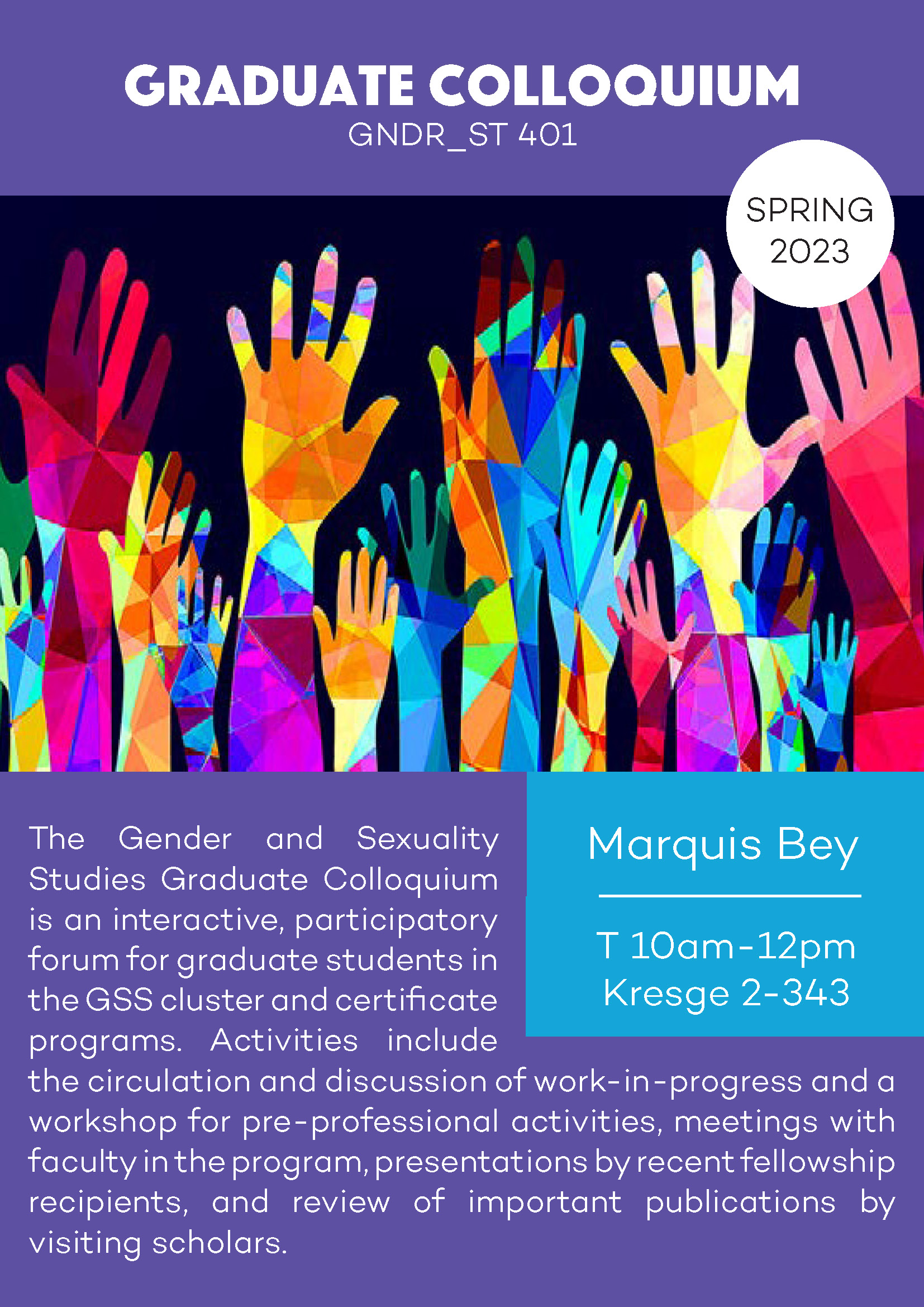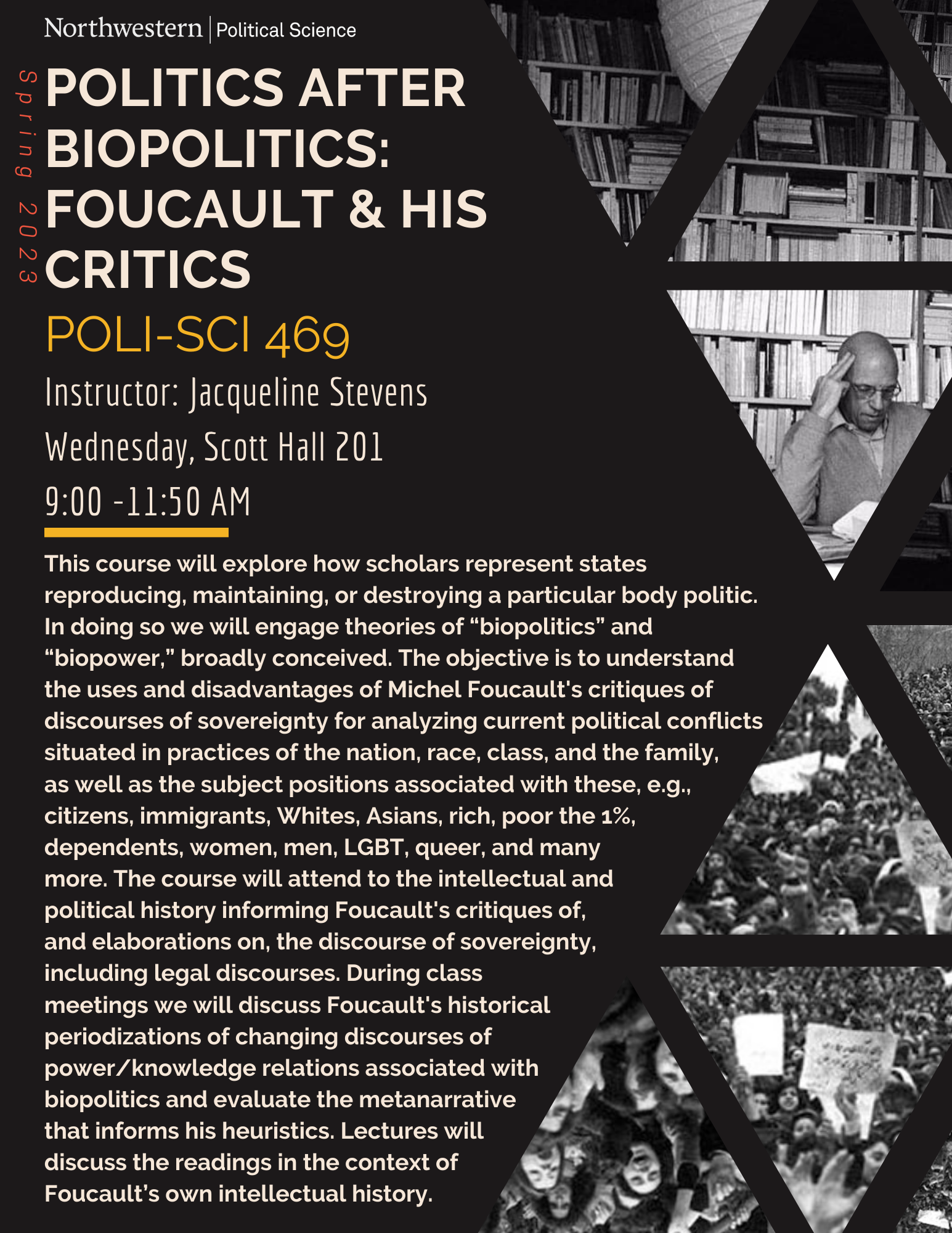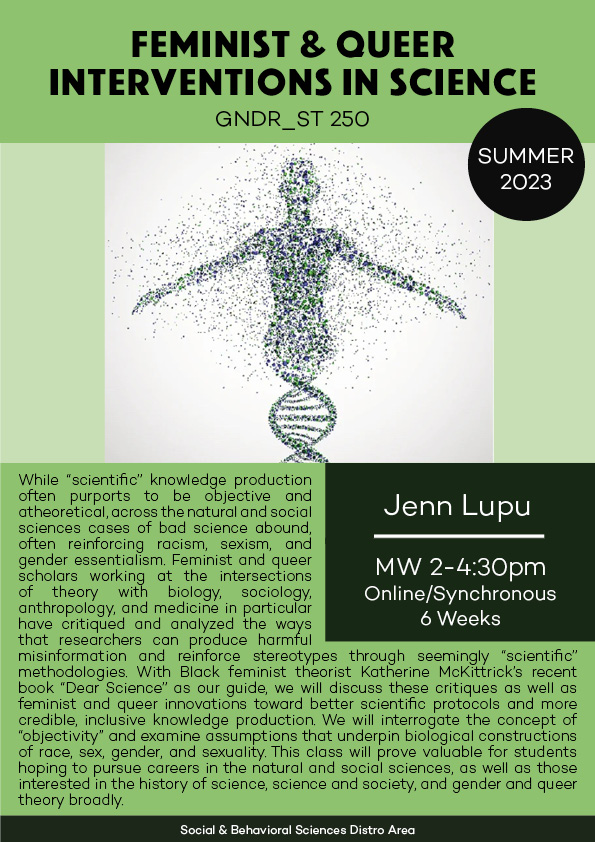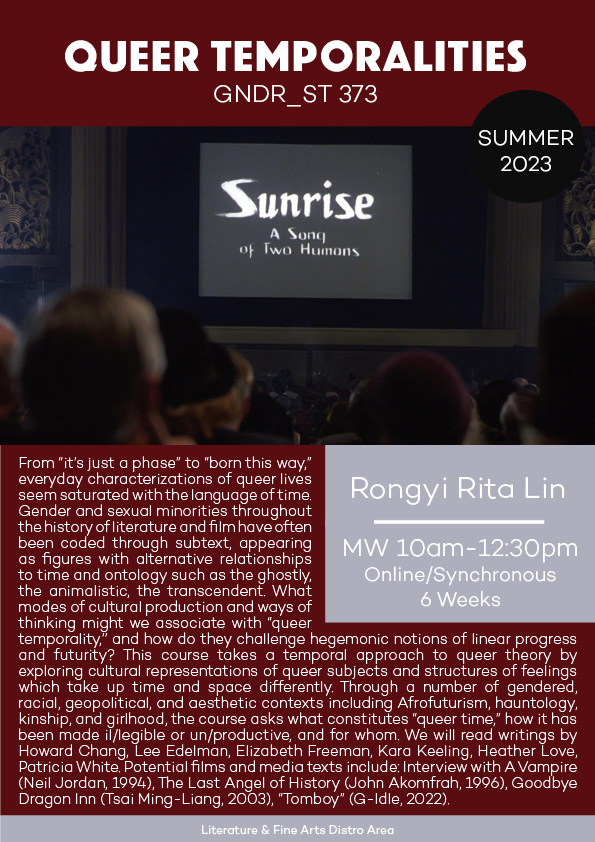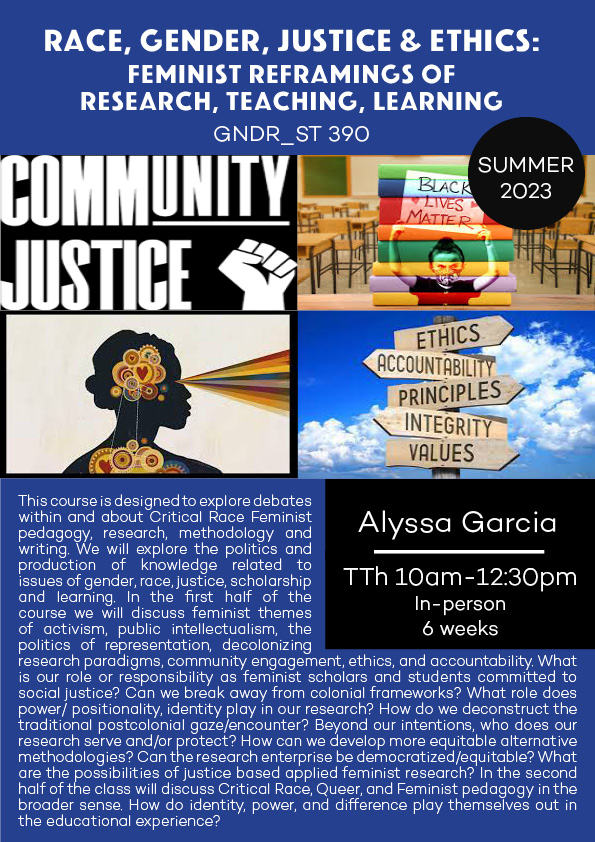Course Descriptions (2022-23)
FALL 2022 | WINTER 2023 | SPRING 2023 | SUMMER 2023
Fall 2022
Winter 2023
|
|
GNDR_ST 101-6-20: Sick Girls and Hardy HeroinesIll women are scattered across the pages of literature, from swooning ladies in sentimental novels to cancer patients in popular fiction. Illness acts as narrative momentum, as a metaphor for social “ills,” and as a signifier of tragic virtue in an individual character. Focusing on the 18th and 19th centuries, this class will examine how the tropes of illness in popular literature pertains to our broader cultural assumptions about illness, health, and gender. How do traits associated with femininity resemble literary representations of illness, and vice-versa? How might we locate or analyze femininity in representations of ill men? How do these tropes change over time? What happens if health, rather than illness, becomes a primary marker of virtue? And what does all of this mean for us today? How has the construction of ill femininity been bound up in whiteness, and how has this contributed to systemic and medical racism? What is the relationship between the representation of ill femininity and contemporary “wellness culture”—or even contemporary feminism? |
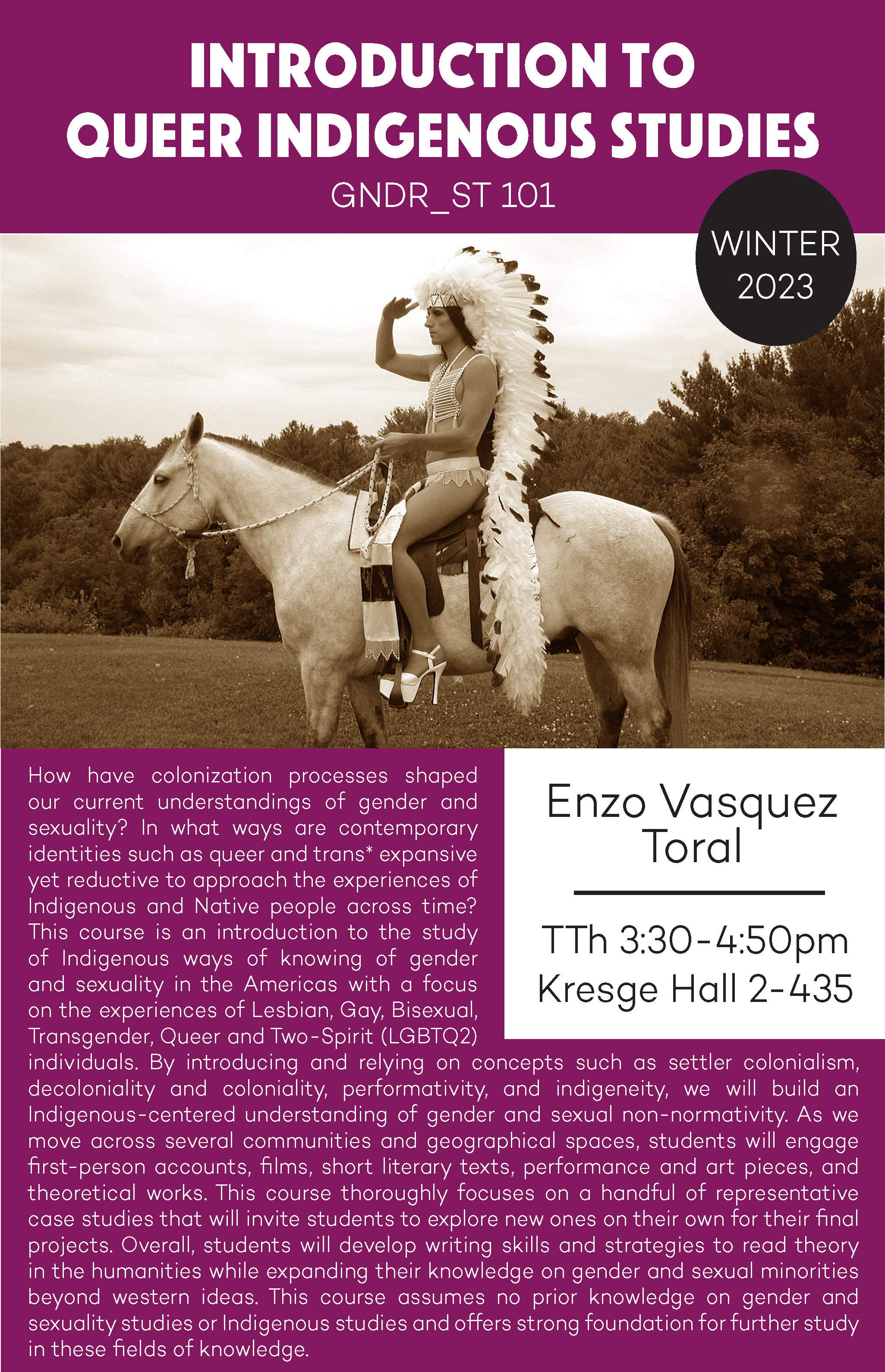 |
GNDR_ST 101-6-21: Introduction to Queer Indigenous StudiesHow have colonization processes shaped our current understandings of gender and sexuality? In what ways are contemporary identities such as queer and trans* expansive yet reductive to approach the experiences of Indigenous and Native people across time? This course is an introduction to the study of Indigenous ways of knowing of gender and sexuality in the Americas with a focus on the experiences of Lesbian, Gay, Bisexual, Transgender, Queer and Two-Spirit (LGBTQ2) individuals. By introducing and relying on concepts such as settler colonialism, decoloniality and coloniality, performativity, and indigeneity, we will build an Indigenous-centered understanding of gender and sexual non-normativity. As we move across several communities and geographical spaces, students will engage first-person accounts, films, short literary texts, performance and art pieces, and theoretical works. This course thoroughly focuses on a handful of representative case studies that will invite students to explore new ones on their own for their final projects. Overall, students will develop writing skills and strategies to read theory in the humanities while expanding their knowledge on gender and sexual minorities beyond western ideas. This course assumes no prior knowledge on gender and sexuality studies or Indigenous studies and offers strong foundation for further study in these fields of knowledge. |
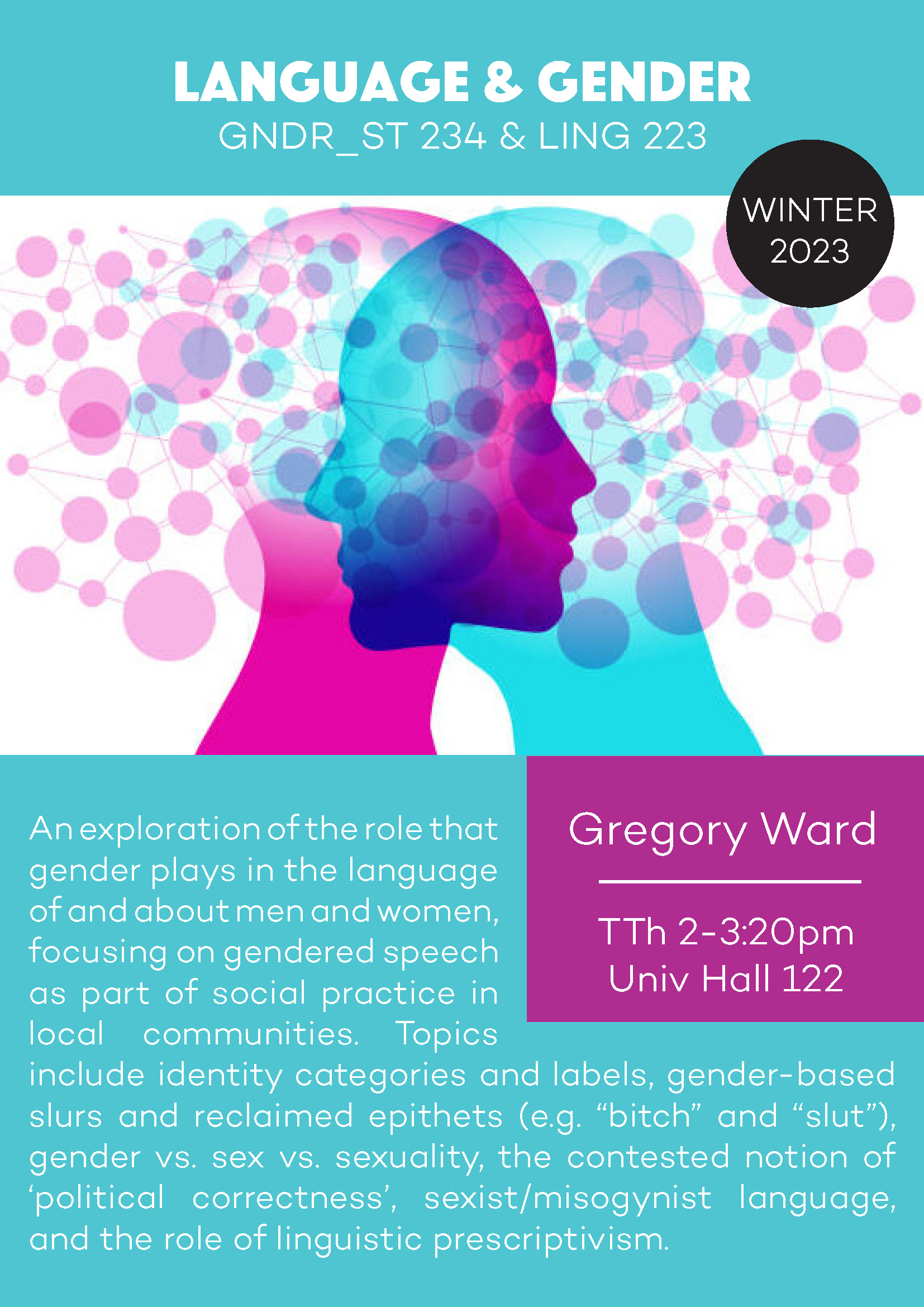 |
GNDR_ST 234-0-20: Language & GenderAn exploration of the role that gender plays in the language of and about men and women, focusing on gendered speech as part of social practice in local communities. Topics include identity categories and labels, gender-based slurs and reclaimed epithets (e.g. "bitch" and "slut"), gender vs. sex vs. sexuality, the contested notion of ‘political correctness’, sexist/misogynist language, and the role of linguistic prescriptivism. |
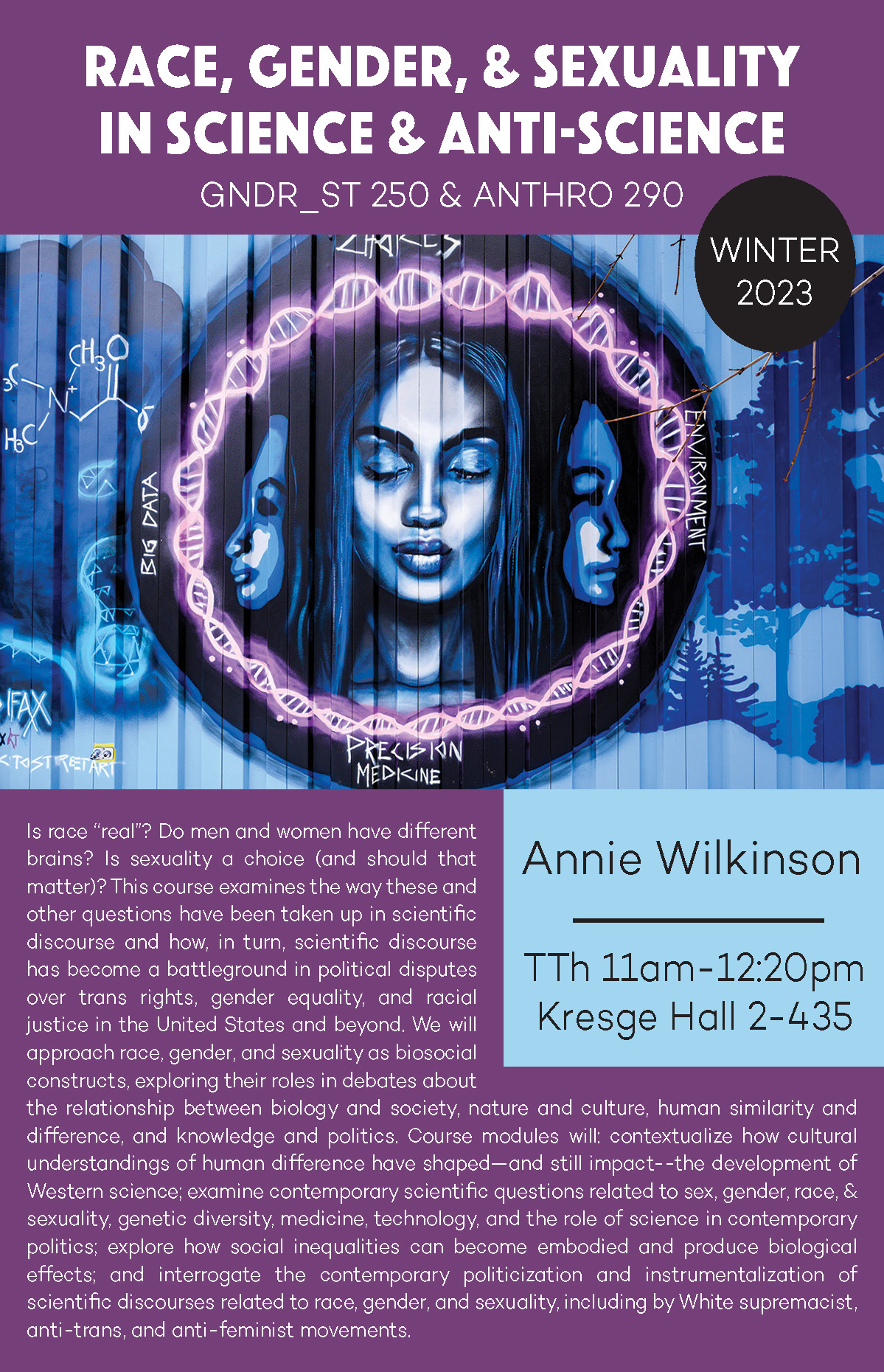 |
GNDR_ST 250-0-20: Race, Gender, & Sexuality in Science & Anti-ScienceIs race “real”? Do men and women have different brains? Is sexuality a choice (and should that matter)? This course examines the way these and other questions have been taken up in scientific discourse and how, in turn, scientific discourse has become a battleground in political disputes over trans rights, gender equality, and racial justice in the United States and beyond. We will approach race, gender, and sexuality as biosocial constructs, exploring their roles in debates about the relationship between biology and society, nature and culture, human similarity and difference, and knowledge and politics. Course modules will: contextualize how cultural understandings of human difference have shaped—and still impact--the development of Western science; examine contemporary scientific questions related to sex, gender, race, & sexuality, genetic diversity, medicine, technology, and the role of science in contemporary politics; explore how social inequalities can become embodied and produce biological effects; and interrogate the contemporary politicization and instrumentalization of scientific discourses related to race, gender, and sexuality, including by White supremacist, anti-trans, and anti-feminist movements. |
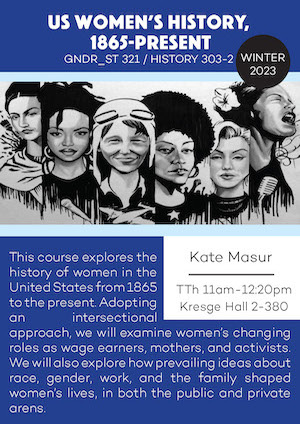 |
GNDR_ST 321-0-21: US Women’s History, 1865-PresentThis course explores the history of women in the United States from 1865 to the present. Adopting an intersectional approach, we will examine women’s changing roles as wage earners, mothers, and activists. We will also explore how prevailing ideas about race, gender, work, and the family shaped women’s lives, in both the public and private arenas. |
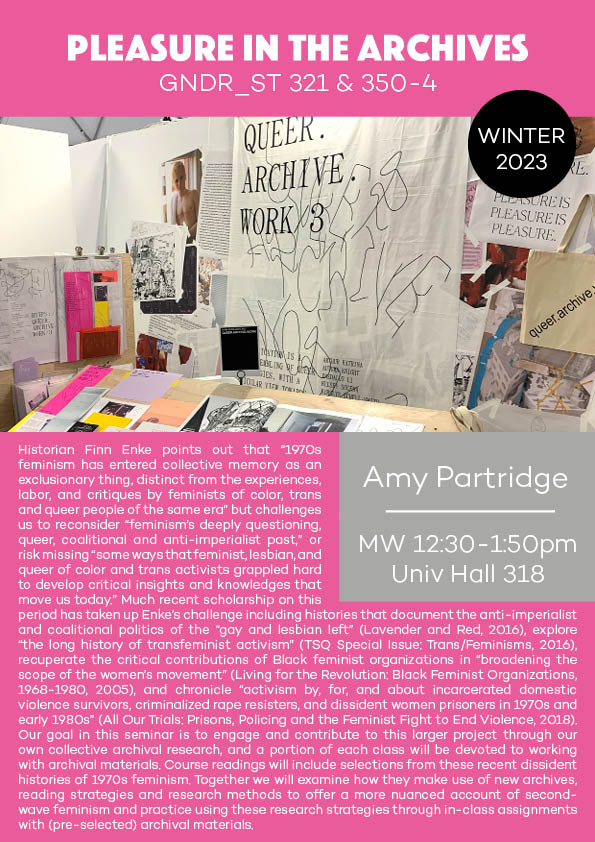 |
GNDR_ST 321-0-22: Pleasure in the Archives"I find myself increasingly insisting on the importance of history, not because things were better (or worse) in an earlier time but because, as cocreators of collective memory, we’re all doing it one way and another, and it matters how we tell the story."—Finn Enke, “Collective Memory and the Transfeminist 1970s” TSQ (2018) In a recent article, historian Finn Enke points out that “1970s feminism has entered collective memory as an exclusionary thing, distinct from the experiences, labor, and critiques by feminists of color, trans and queer people of the same era” but challenges us to reconsider “feminism’s deeply questioning, queer, coalitional and anti-imperialist past,” or risk missing “some ways that feminist, lesbian, and queer of color and trans activists grappled hard to develop critical insights and knowledges that move us today.” Much recent scholarship on this period has taken up Enke’s challenge including histories that document the anti-imperialist and coalitional politics of the “gay and lesbian left” (Lavender and Red, 2016), explore “the long history of transfeminist activism” (TSQ Special Issue: Trans/Feminisms, 2016), recuperate the critical contributions of Black feminist organizations in “broadening the scope of the women’s movement” (Living for the Revolution: Black Feminist Organizations, 1968-1980, 2005), and chronicle “activism by, for, and about incarcerated domestic violence survivors, criminalized rape resisters, and dissident women prisoners in 1970s and early 1980s” (All Our Trials: Prisons, Policing and the Feminist Fight to End Violence, 2018). |
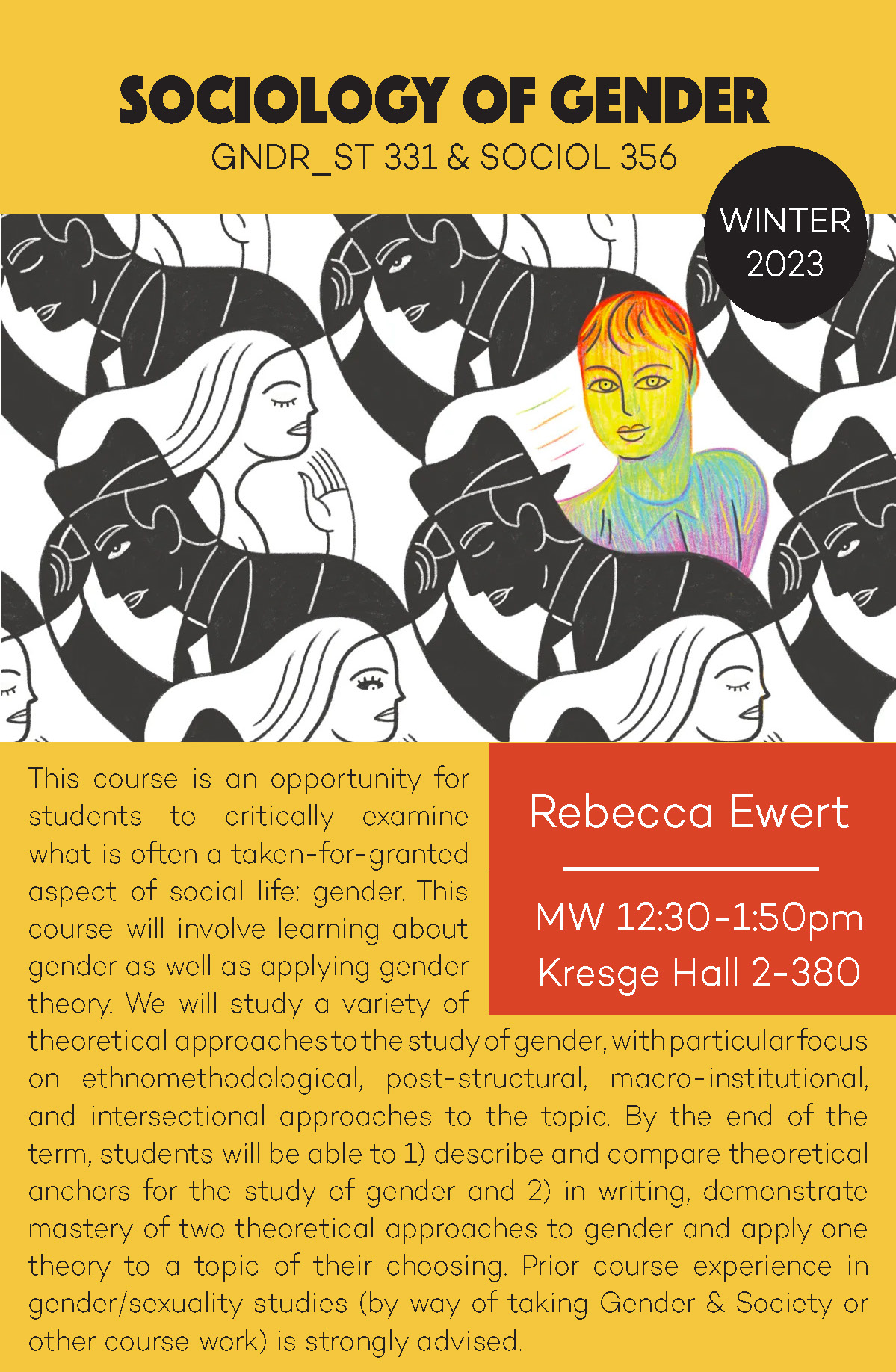 |
GNDR_ST 331-0-20: Sociology of GenderThis course is an opportunity for students to critically examine what is often a taken-for-granted aspect of social life: gender. This course will involve learning about gender as well as applying gender theory. We will study a variety of theoretical approaches to the study of gender, with particular focus on ethnomethodological, post-structural, macro-institutional, and intersectional approaches to the topic. By the end of the term, students will be able to 1) describe and compare theoretical anchors for the study of gender and 2) in writing, demonstrate mastery of two theoretical approaches to gender and apply one theory to a topic of their choosing. Prior course experience in gender/sexuality studies (by way of taking Gender & Society or other course work) is strongly advised. |
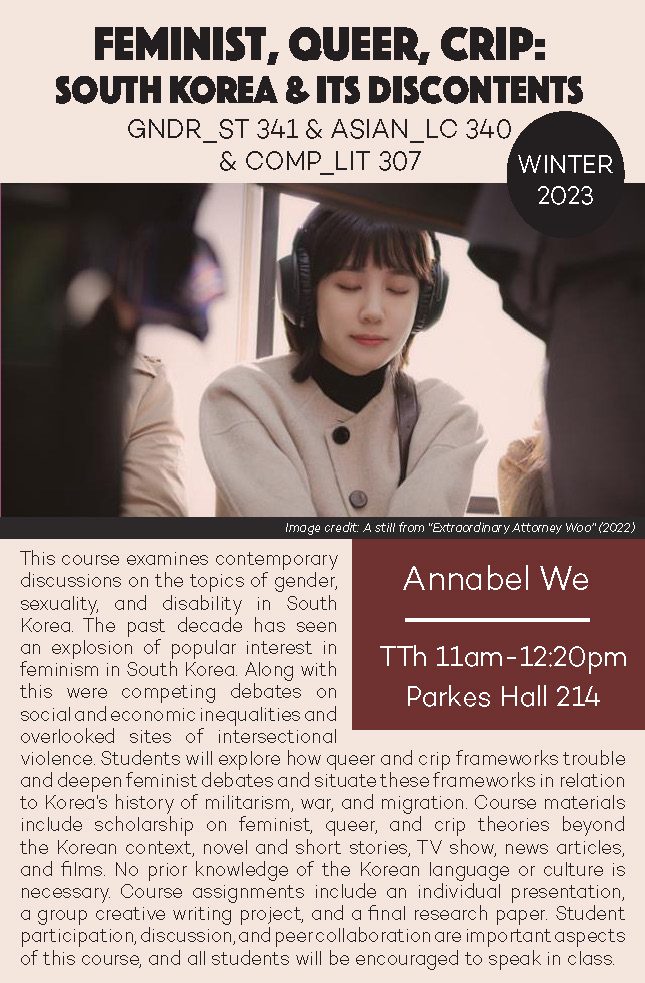 |
GNDR_ST 341-0-21: Feminist, Queer, Crip: South Korea and Its DiscontentsThis course examines contemporary discussions on the topics of gender, sexuality, and disability in South Korea. The past decade has seen an explosion of popular interest in feminism in South Korea. Along with this were competing debates on social and economic inequalities and overlooked sites of intersectional violence. Students will explore how queer and crip frameworks trouble and deepen feminist debates and situate these frameworks in relation to Korea’s history of militarism, war, and migration. Course materials include scholarship on feminist, queer, and crip theories beyond the Korean context, novel and short stories, TV show, news articles, and films. No prior knowledge of the Korean language or culture is necessary. Course assignments include an individual presentation, a group creative writing project, and a final research paper. Student participation, discussion, and peer collaboration are important aspects of this course, and all students will be encouraged to speak in class. |
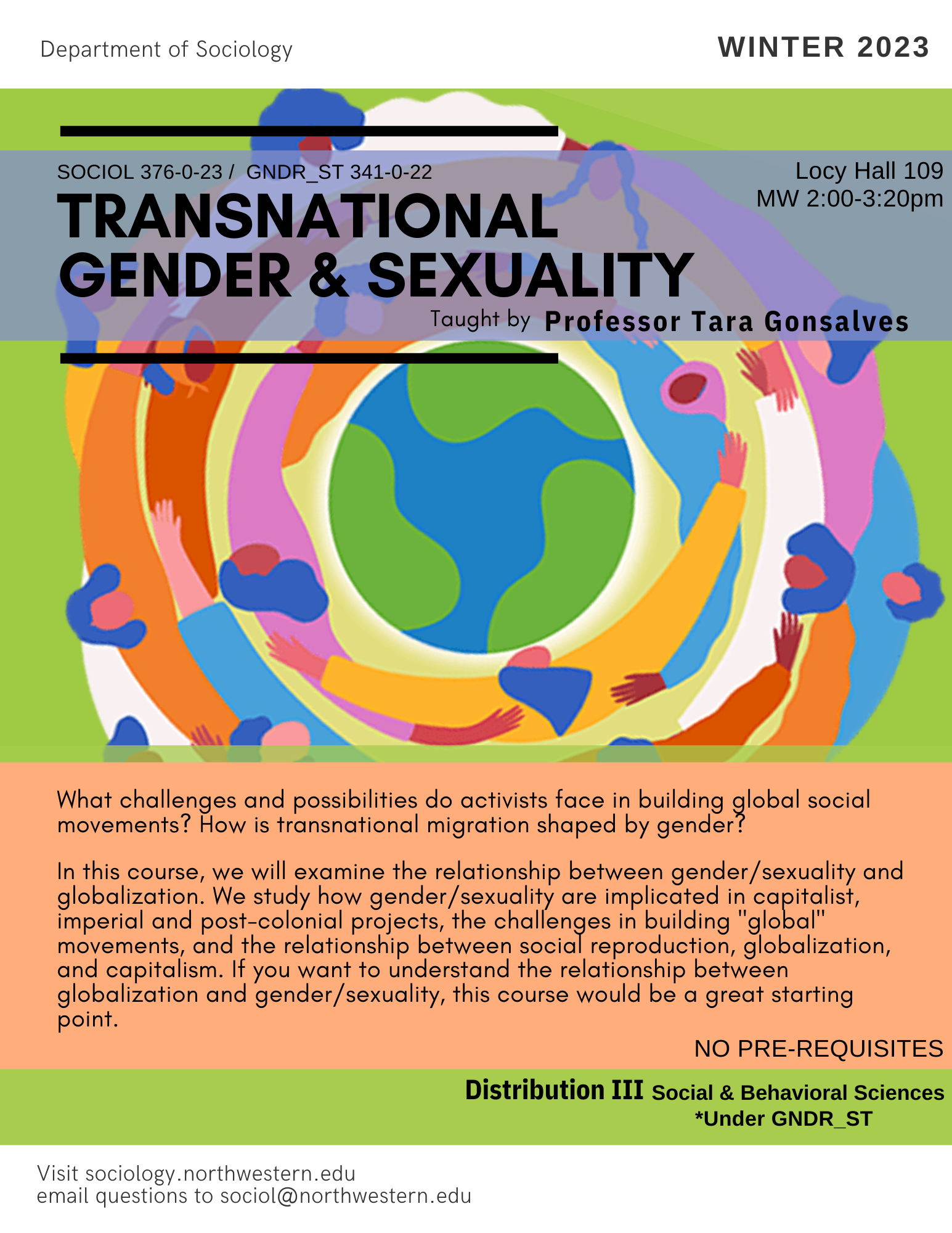 |
GNDR_ST 341-0-22: Transnational Perspectives on Gender & SexualitySince the 1980s, third wave feminists have critiqued fundamental assumptions of second-wave feminism and worked to incorporate perspectives and voices outside the "West." In more recent decades, a similar movement has happened among queer and trans theorists. In this course, we will engage this work, much of which has been published in the past decade and a half. Course readings, which will survey scholarship on gender/sexuality in many regions of the world, will draw our attention to the ways in which gender/sexuality are implicated in capitalist, imperial and post-colonial projects as well as how gender and sexuality operate outside the "West," both in practice and identity. Finally, we will consider the possibilities and limitations for studying gender/sexuality beyond our own societies. Critical approaches to gender and sexuality challenge conventional "born this way" narratives about gender and sexual identities as innate. This course will raise questions that will make us uncomfortable and, hopefully, transform our understandings of our own gendered and sexual identities and practices. |
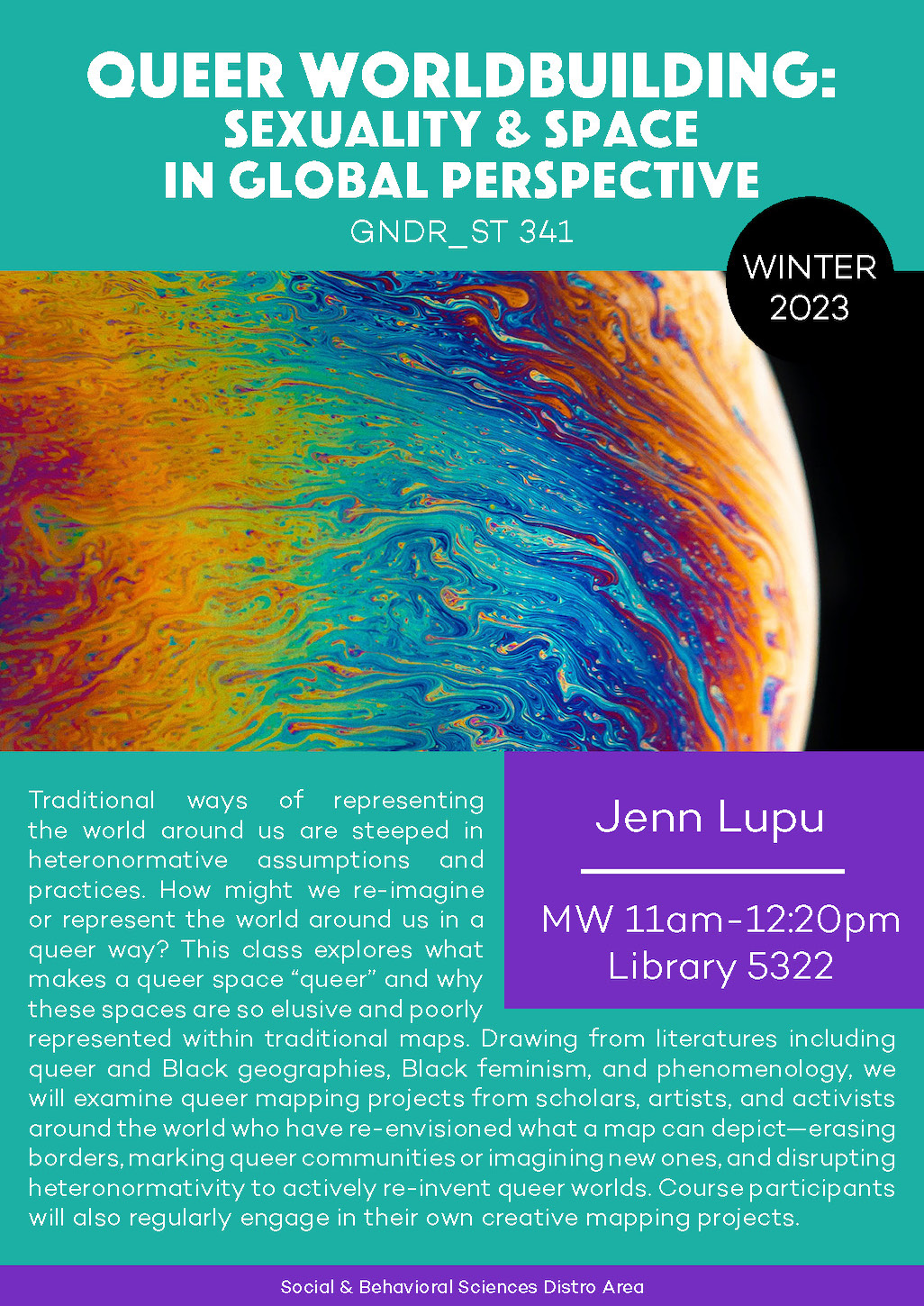 |
GNDR_ST 341-0-23: Queer Worldbuilding: Sexuality and Space in Global PerspectiveTraditional ways of representing the world around us are steeped in heteronormative assumptions and practices. How might we re-imagine or represent the world around us in a queer way? This class explores what makes a queer space "queer" and why these spaces are so elusive and poorly represented within traditional maps. Drawing from literatures including queer and Black geographies, Black feminism, and phenomenology, we will examine queer mapping projects from scholars, artists, and activists around the world who have re-envisioned what a map can depict—erasing borders, marking queer communities or imagining new ones, and disrupting heteronormativity to actively re-invent queer worlds. Course participants will also regularly engage in their own creative mapping projects. |
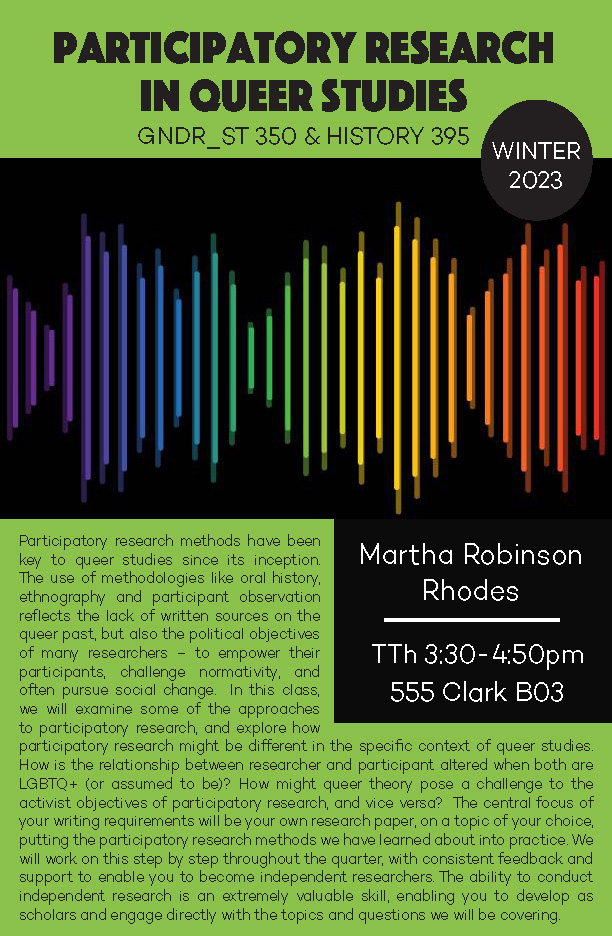 |
GNDR_ST 350-4-2: Participatory Research in Queer StudiesParticipatory research methods have been key to queer studies since its inception. The use of methodologies like oral history, ethnography and participant observation reflects the lack of written sources on the queer past, but also the political objectives of many researchers – to empower their participants, challenge normativity, and often pursue social change. In this class, we will examine some of the approaches to participatory research, and explore how participatory research might be different in the specific context of queer studies. How is the relationship between researcher and participant altered when both are LGBTQ+ (or assumed to be)? How might queer theory pose a challenge to the activist objectives of participatory research, and vice versa? The central focus of your writing requirements will be your own research paper, on a topic of your choice, putting the participatory research methods we have learned about into practice. We will work on this step by step throughout the quarter, with consistent feedback and support to enable you to become independent researchers. The ability to conduct independent research is an extremely valuable skill, enabling you to develop as scholars and engage directly with the topics and questions we will be covering. |
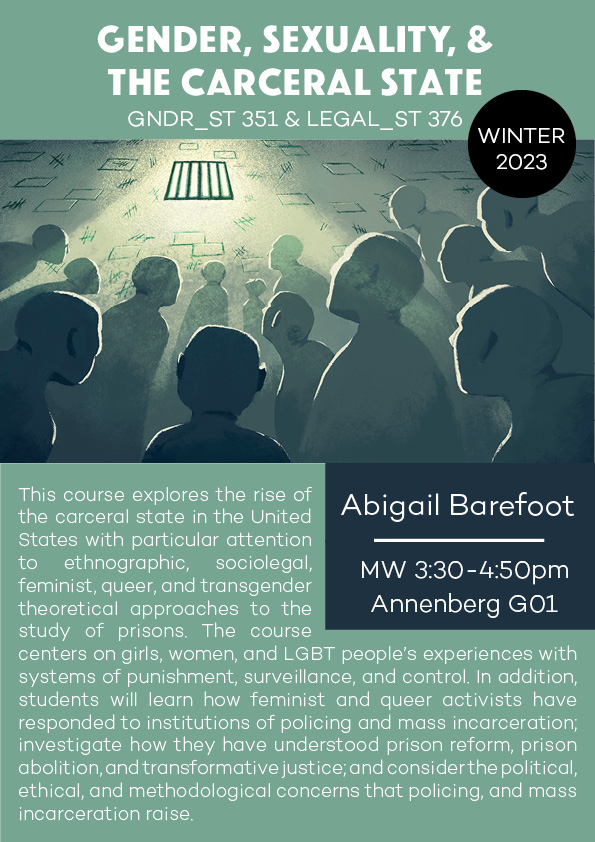 |
GNDR_ST 351-0-20: Gender, Sexuality, & the Carceral StateThis course explores the rise of the carceral state in the United States with particular attention to ethnographic, sociolegal, feminist, queer, and transgender theoretical approaches to the study of prisons. The course centers on girls, women, and LGBT people’s experiences with systems of punishment, surveillance, and control. In addition, students will learn how feminist and queer activists have responded to institutions of policing and mass incarceration; investigate how they have understood prison reform, prison abolition, and transformative justice; and consider the political, ethical, and methodological concerns that policing, and mass incarceration raise. |
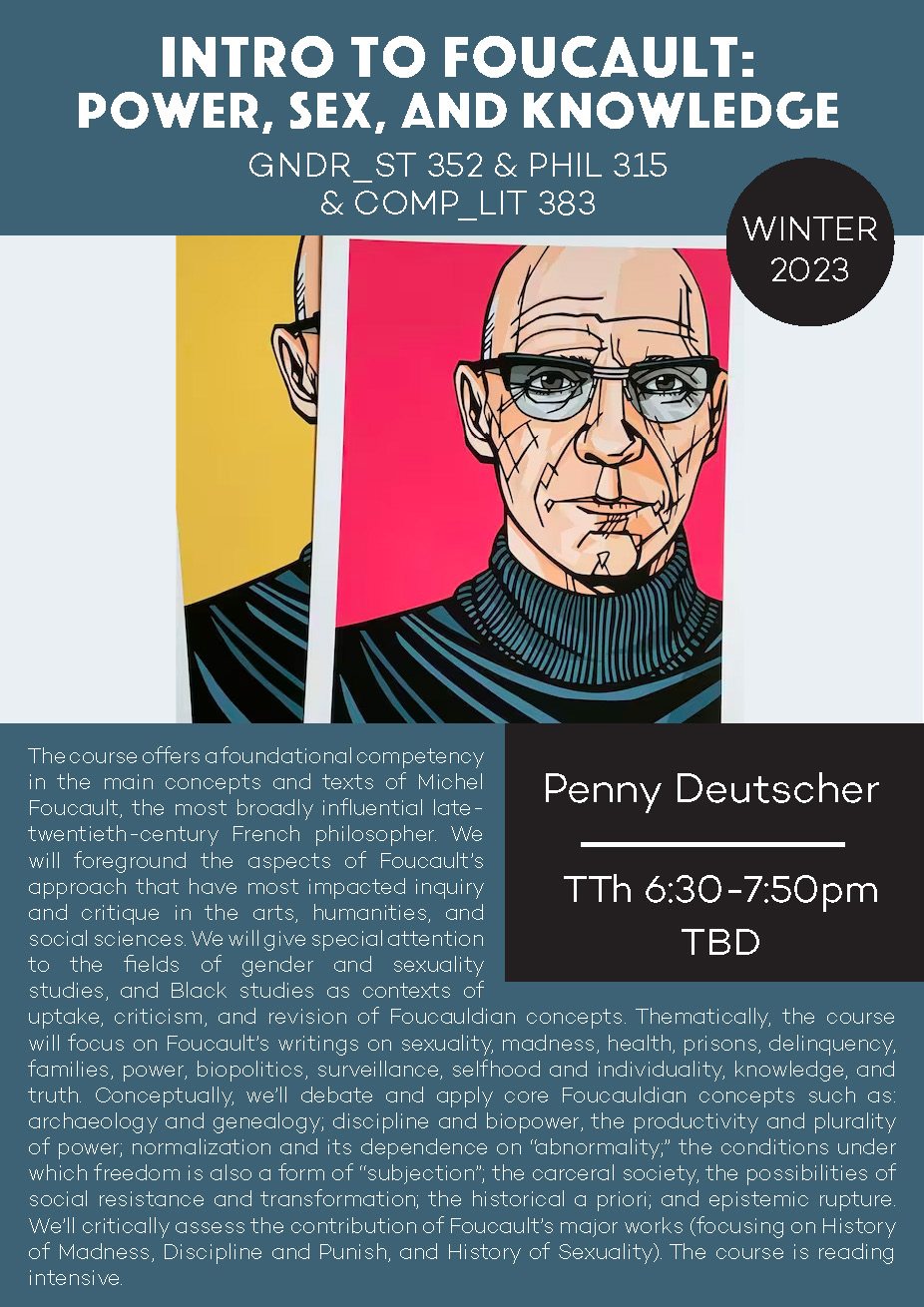 |
GNDR_ST 352-0-20: Intro to Foucault: Power, Sex, and KnowledgeThe course offers a foundational competency in the main concepts and texts of Michel Foucault, the most broadly influential late-twentieth-century French philosopher. We will foreground the aspects of Foucault’s approach that have most impacted inquiry and critique in the arts, humanities, and social sciences. We will give special attention to the fields of gender and sexuality studies, and Black studies as contexts of uptake, criticism, and revision of Foucauldian concepts. Thematically, the course will focus on Foucault’s writings on sexuality, madness, health, prisons, delinquency, families, power, biopolitics, surveillance, selfhood and individuality, knowledge, and truth. Conceptually, we’ll debate and apply core Foucauldian concepts such as: archaeology and genealogy; discipline and biopower, the productivity and plurality of power; normalization and its dependence on “abnormality;” the conditions under which freedom is also a form of “subjection”; the carceral society, the possibilities of social resistance and transformation; the historical a priori; and epistemic rupture. We’ll critically assess the contribution of Foucault’s major works (focusing on History of Madness, Discipline and Punish, and History of Sexuality). The course is reading intensive- students will read a) weekly excerpts by Foucault; b) their own choice of one work by Foucault as the basis of their final paper (a number of options are extensively discussed in class), and c) at least one extra chapter or article by a contemporary critic (many options are provided). Canvas will be the forum for weekly contributions to class debate- your critical responses to Foucault and each other are encouraged. The course is open to both undergraduates and graduates — discussion sections are offered for graduate students after the Thursday class each week (with Penelope Deutscher) and for undergraduates on Fridays (with Micol Bez). |
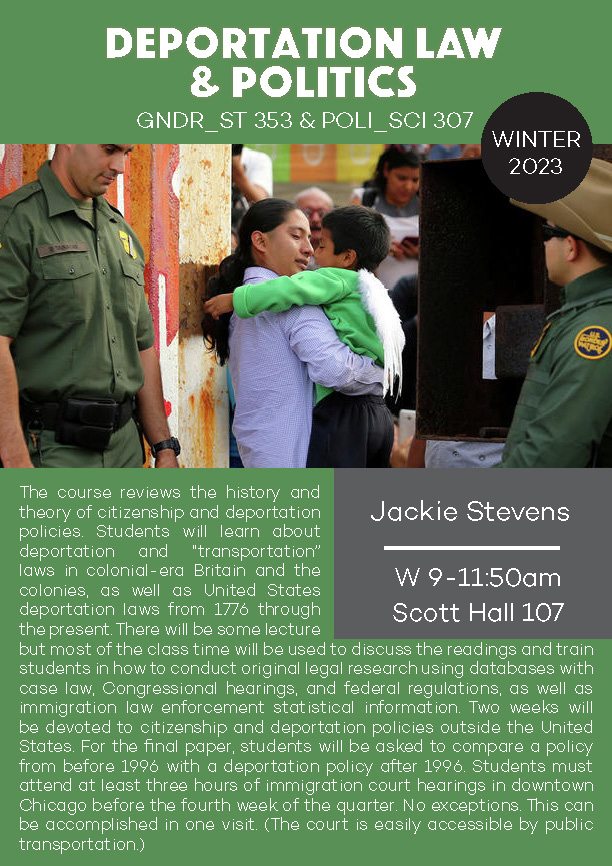 |
GNDR_ST 353-0-21: Deportation Law & PoliticsThe course reviews the history and theory of citizenship and deportation policies. Students will learn about deportation and "transportation" laws in colonial-era Britain and the colonies, as well as United States deportation laws from 1776 through the present. There will be some lecture but most of the class time will be used to discuss the readings and train students in how to conduct original legal research using databases with case law, Congressional hearings, and federal regulations, as well as immigration law enforcement statistical information. Two weeks will be devoted to citizenship and deportation policies outside the United States. For the final paper, students will be asked to compare a policy from before 1996 with a deportation policy after 1996. Students must attend at least three hours of immigration court hearings in downtown Chicago before the fourth week of the quarter. No exceptions. This can be accomplished in one visit. (The court is easily accessible by public transportation.) |
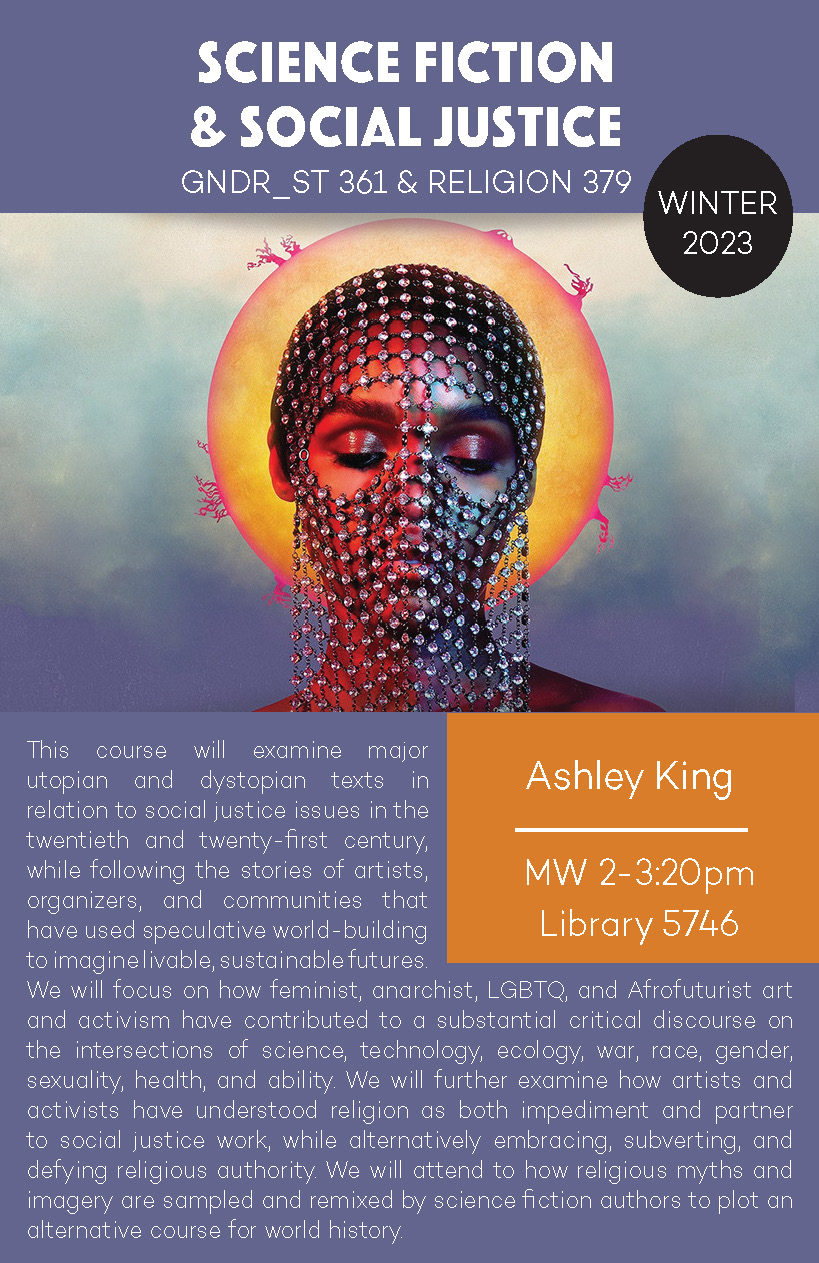 |
GNDR_ST 361-0-22: Science Fiction & Social JusticeThis course will examine major utopian and dystopian texts in relation to social justice issues in the twentieth and twenty-first century, while following the stories of artists, organizers, and communities that have used speculative world-building to imagine livable, sustainable futures. We will focus on how feminist, anarchist, LGBTQ, and Afrofuturist art and activism have contributed to a substantial critical discourse on the intersections of science, technology, ecology, war, race, gender, sexuality, health, and ability. We will further examine how artists and activists have understood religion as both impediment and partner to social justice work, while alternatively embracing, subverting, and defying religious authority. We will attend to how religious myths and imagery are sampled and remixed by science fiction authors to plot an alternative course for world history. |
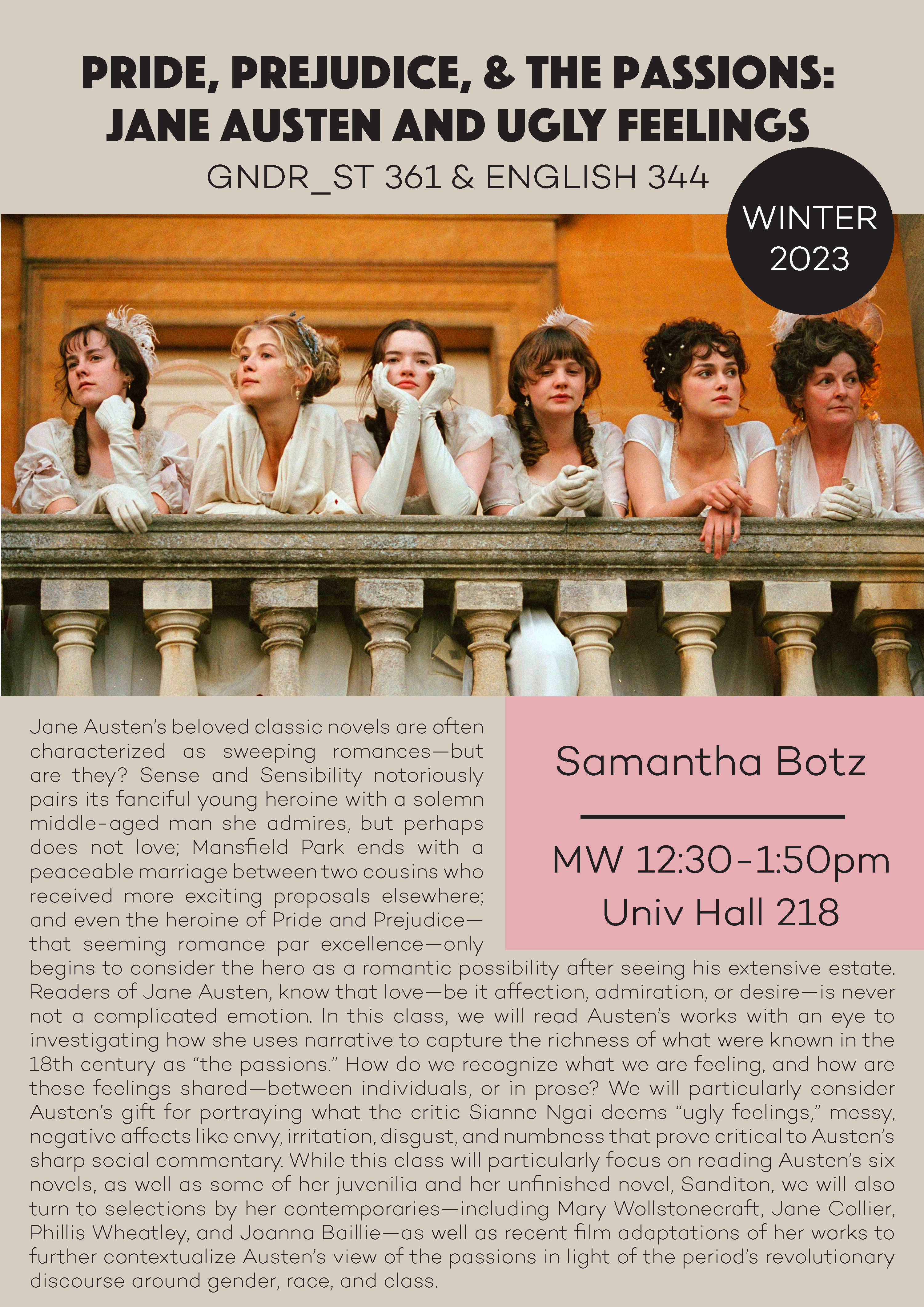 |
GNDR_ST 361-0-23: Pride, Prejudice, and the Passions: Jane Austen and Ugly FeelingsJane Austen’s beloved classic novels are often characterized as sweeping romances—but are they? Sense and Sensibility notoriously pairs its fanciful young heroine with a solemn middle-aged man she admires, but perhaps does not love; Mansfield Park ends with a peaceable marriage between two cousins who received more exciting proposals elsewhere; and even the heroine of Pride and Prejudice—that seeming romance par excellence—only begins to consider the hero as a romantic possibility after seeing his extensive estate. Readers of Jane Austen, know that love—be it affection, admiration, or desire—is never not a complicated emotion. In this class, we will read Austen’s works with an eye to investigating how she uses narrative to capture the richness of what were known in the 18th century as “the passions.” How do we recognize what we are feeling, and how are these feelings shared—between individuals, or in prose? We will particularly consider Austen’s gift for portraying what the critic Sianne Ngai deems “ugly feelings,” messy, negative affects like envy, irritation, disgust, and numbness that prove critical to Austen’s sharp social commentary. While this class will particularly focus on reading Austen’s six novels, as well as some of her juvenilia and her unfinished novel, Sanditon, we will also turn to selections by her contemporaries—including Mary Wollstonecraft, Jane Collier, Phillis Wheatley, and Joanna Baillie—as well as recent film adaptations of her works to further contextualize Austen’s view of the passions in light of the period’s revolutionary discourse around gender, race, and class. |
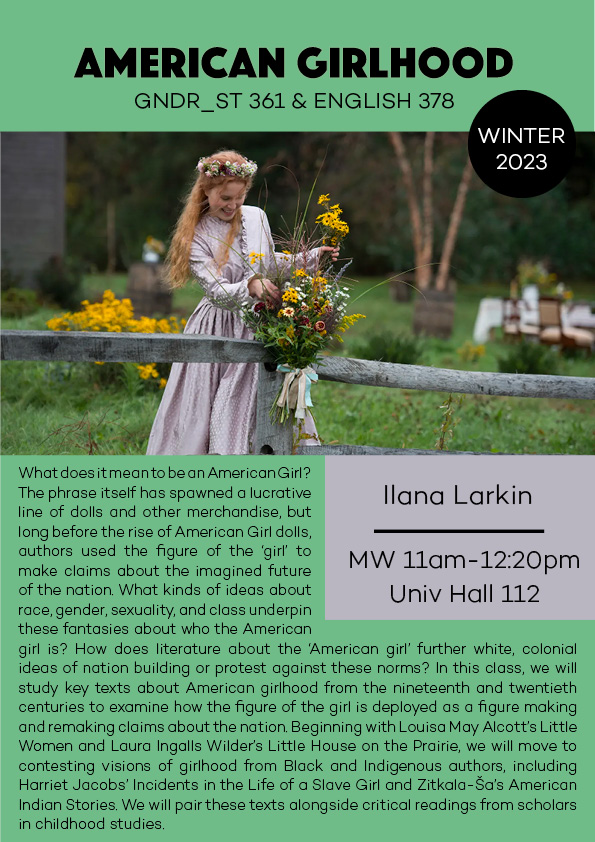 |
GNDR_ST 361-0-24: American GirlhoodWhat does it mean to be an American Girl? The phrase itself has spawned a lucrative line of dolls and other merchandise, but long before the rise of American Girl dolls, authors used the figure of the ‘girl’ to make claims about the imagined future of the nation. What kinds of ideas about race, gender, sexuality, and class underpin these fantasies about who the American girl is? How does literature about the ‘American girl’ further white, colonial ideas of nation building or protest against these norms? In this class, we will study key texts about American girlhood from the nineteenth and twentieth centuries to examine how the figure of the girl is deployed as a figure making and remaking claims about the nation. Beginning with Louisa May Alcott’s Little Women and Laura Ingalls Wilder’s Little House on the Prairie, we will move to contesting visions of girlhood from Black and Indigenous authors, including Harriet Jacobs’ Incidents in the Life of a Slave Girl and Zitkala-Ša’s American Indian Stories. We will pair these texts alongside critical readings from scholars in childhood studies. |
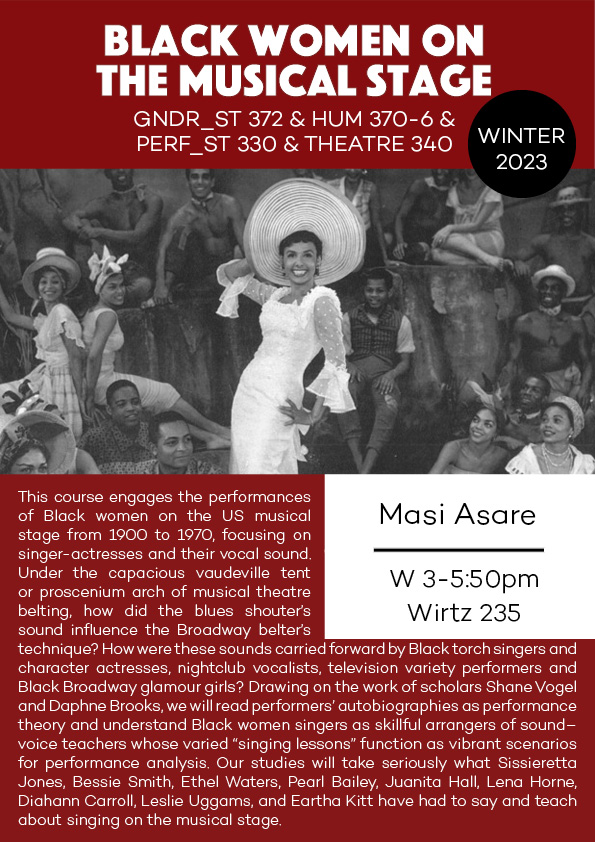 |
GNDR_ST 372-0-20: Black Women on the Musical StageThis course engages the performances of Black women on the US musical stage from 1900 to 1970, focusing on singer-actresses and their vocal sound. Under the capacious vaudeville tent or proscenium arch of musical theatre belting, how did the blues shouter’s sound influence the Broadway belter’s technique? How were these sounds carried forward by Black torch singers and character actresses, nightclub vocalists, television variety performers and Black Broadway glamour girls? Drawing on the work of scholars Shane Vogel and Daphne Brooks, we will read performers’ autobiographies as performance theory and understand Black women singers as skillful arrangers of sound–voice teachers whose varied “singing lessons” function as vibrant scenarios for performance analysis. Our studies will take seriously what Sissieretta Jones, Bessie Smith, Ethel Waters, Pearl Bailey, Juanita Hall, Lena Horne, Diahann Carroll, Leslie Uggams, and Eartha Kitt have had to say and teach about singing on the musical stage. |
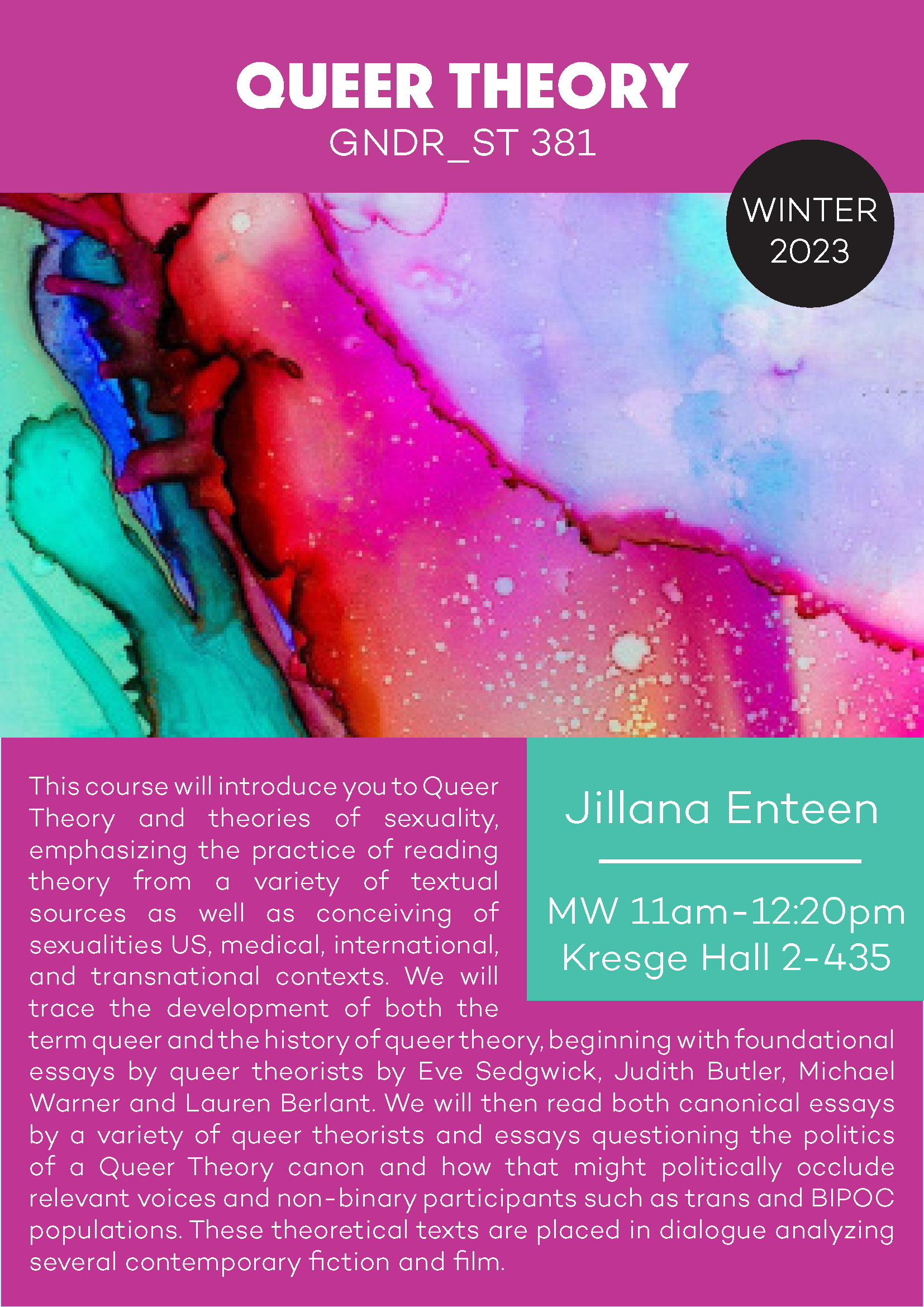 |
GNDR_ST 381-0-20: Queer TheoryThis course will introduce you to Queer Theory and theories of sexuality, emphasizing the practice of reading theory from a variety of textual sources as well as conceiving of sexualities US, medical, international, and transnational contexts. We will trace the development of both the term queer and the history of queer theory, beginning with foundational essays by queer theorists by Eve Sedgwick, Judith Butler, Michael Warner and Lauren Berlant. We will then read both canonical essays by a variety of queer theorists and essays questioning the politics of a Queer Theory canon and how that might politically occlude relevant voices and non-binary participants such as trans and BIPOC populations. These theoretical texts are placed in dialogue analyzing several contemporary fiction and film. Seminar discussions require synchronous participation. They query how queer theory formulates racial, class and national identities in relation to sexuality, and how it might offer politics beyond those based on identity. Most readings are done on a shared platform (Hypothesis) so the class annotates, comments, and replies to each other on both daily readings, midterm essay, and seminar paper. |
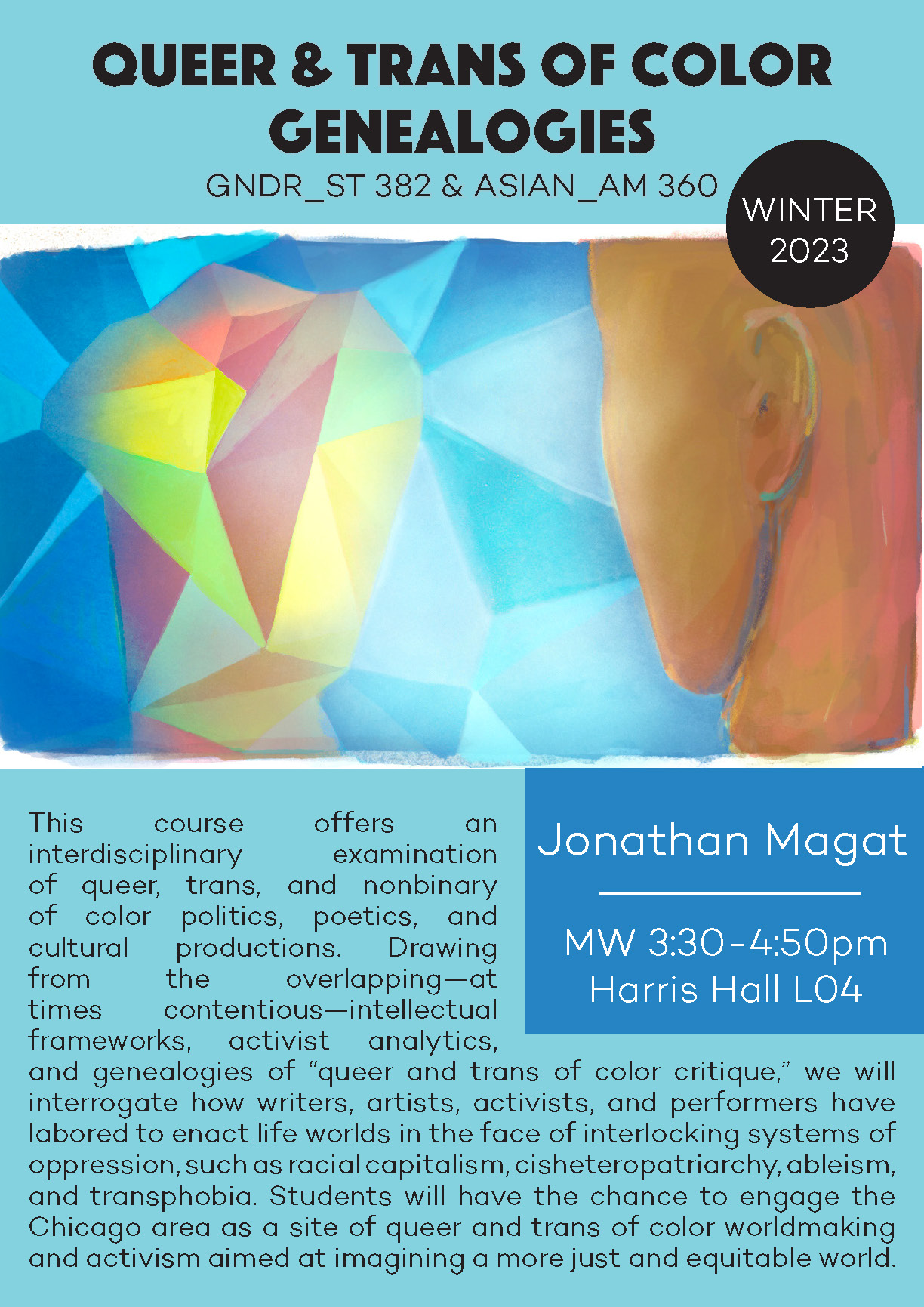 |
GNDR_ST 382-0-20: Queer & Trans of Color GenealogiesThis course offers an interdisciplinary examination of queer, trans, and nonbinary of color politics, poetics, and cultural productions. Drawing from the overlapping—at times contentious—intellectual frameworks, activist analytics, and genealogies of “queer and trans of color critique,” we will interrogate how writers, artists, activists, and performers have labored to enact life worlds in the face of interlocking systems of oppression, such as racial capitalism, cisheteropatriarchy, ableism, and transphobia. Students will have the chance to engage the Chicago area as a site of queer and trans of color worldmaking and activism aimed at imagining a more just and equitable world. |
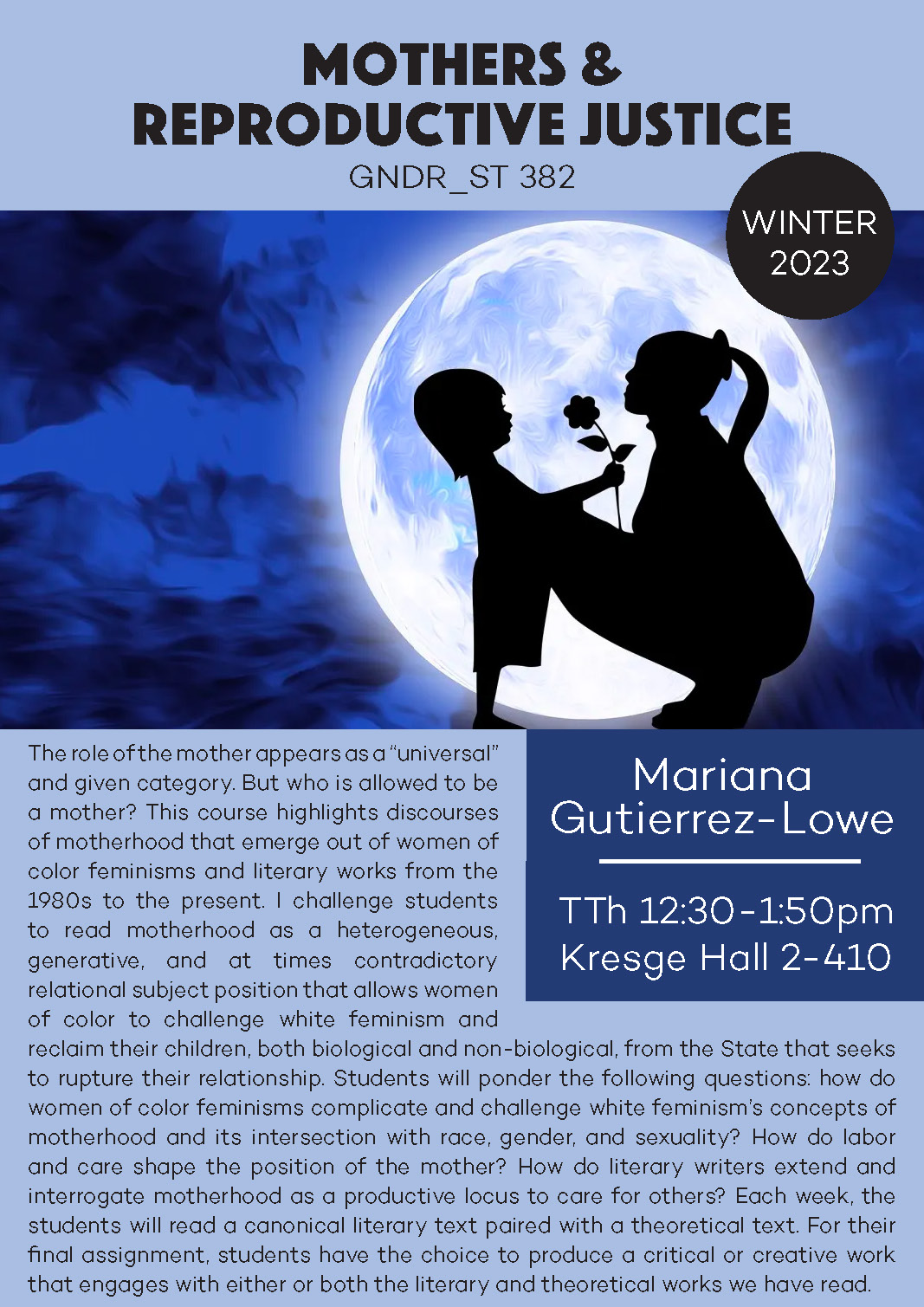 |
GNDR_ST 382-0-21: Mothers & Reproductive JusticeThe role of the mother appears as a “universal” and given category. But who is allowed to be a mother? This course highlights discourses of motherhood that emerge out of women of color feminisms and literary works from the 1980s to the present. I challenge students to read motherhood as a heterogeneous, generative, and at times contradictory relational subject position that allows women of color to challenge white feminism and reclaim their children, both biological and non-biological, from the State that seeks to rupture their relationship. Students will ponder the following questions: how do women of color feminisms complicate and challenge white feminism’s concepts of motherhood and its intersection with race, gender, and sexuality? How do labor and care shape the position of the mother? How do literary writers extend and interrogate motherhood as a productive locus to care for others? Each week, the students will read a canonical literary text paired with a theoretical text. For their final assignment, students have the choice to produce a critical or creative work that engages with either or both the literary and theoretical works we have read. |
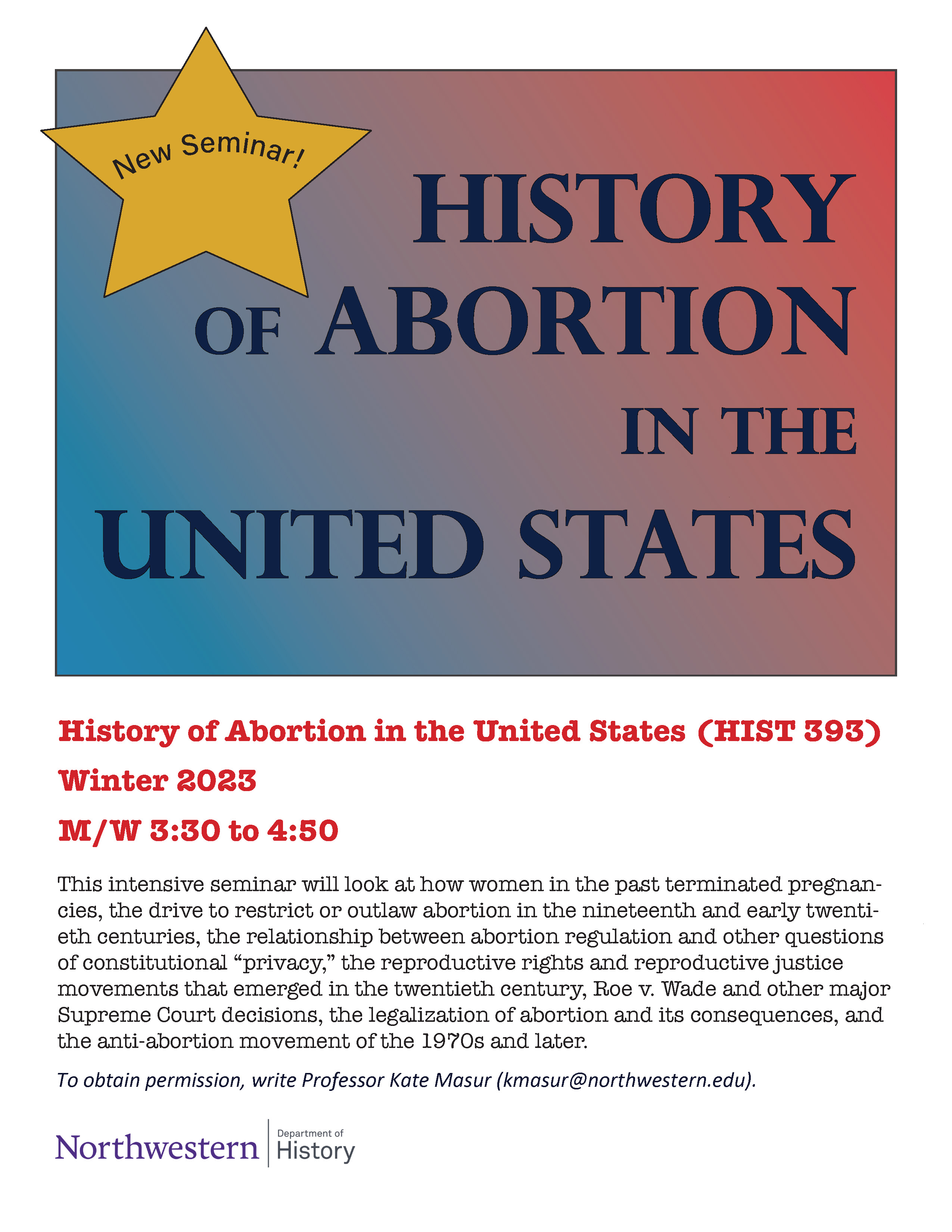 |
HISTORY 393: History of Abortion in the United StatesThis intensive seminar will look at how women in the past terminated pregnancies, the drive to restrict or outlaw abortion in the nineteenth and early twentieth centuries, the relationship between abortion regulation and other questions of constitutional “privacy,” the reproductive rights and reproductive justice movements that emerged in the twentieth century, Roe v. Wade and other major Supreme Court decisions, the legalization of abortion and its consequences, and the anti-abortion movement of the 1970s and later. Instructor permission required. To obtain permission, write Professor Kate Masur: kmasur@northwestern.edu. |
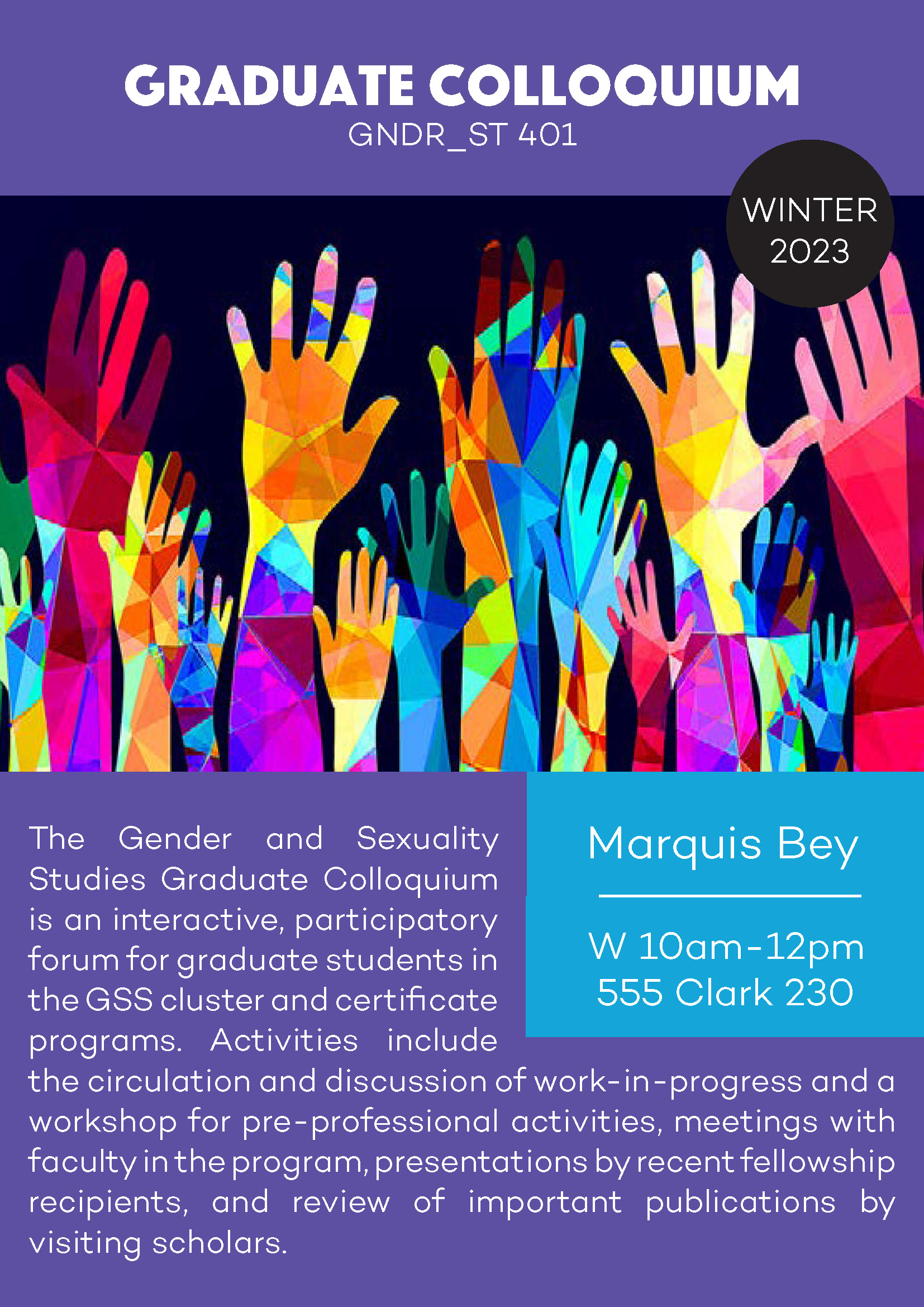 |
GNDR_ST 401-0-20: Graduate ColloquiumThe Gender and Sexuality Studies Graduate Colloquium is an interactive, participatory forum for graduate students in the GSS cluster and certificate programs. Activities include the circulation and discussion of work-in-progress and a workshop for pre-professional activities, meetings with faculty in the program, presentations by recent fellowship recipients, and review of important publications by visiting scholars. |
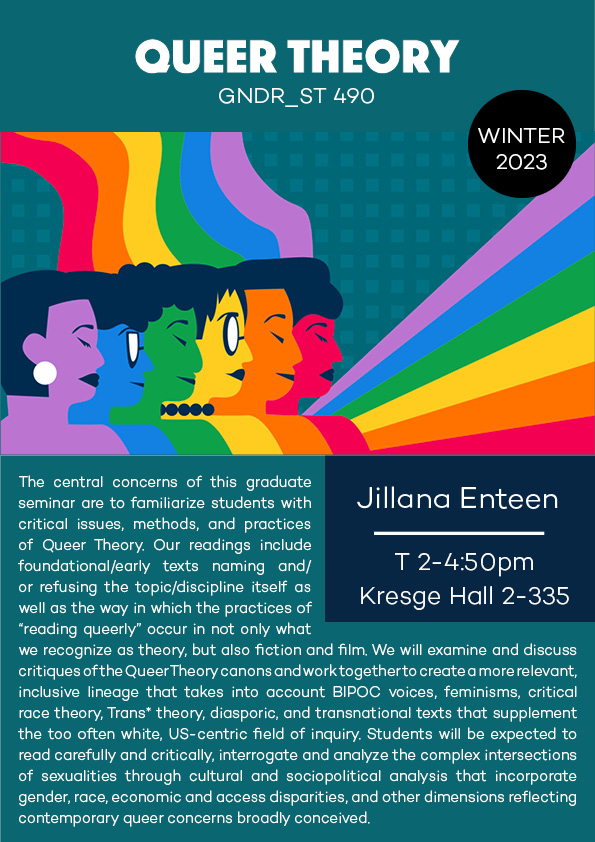 |
GNDR_ST 490-0-21: Queer TheoryThe central concerns of this graduate seminar are to familiarize students with critical issues, methods, and practices of Queer Theory. Our readings include foundational/early texts naming and/or refusing the topic/discipline itself as well as the way in which the practices of "reading queerly" occur in not only what we recognize as theory, but also fiction and film. We will examine and discuss critiques of the Queer Theory canons and work together to create a more relevant, inclusive lineage that takes into account BIPOC voices, feminisms, critical race theory, Trans* theory, diasporic, and transnational texts that supplement the too often white, US-centric field of inquiry. Students will be expected to read carefully and critically, interrogate and analyze the complex intersections of sexualities through cultural and sociopolitical analysis that incorporate gender, race, economic and access disparities, and other dimensions reflecting contemporary queer concerns broadly conceived. |
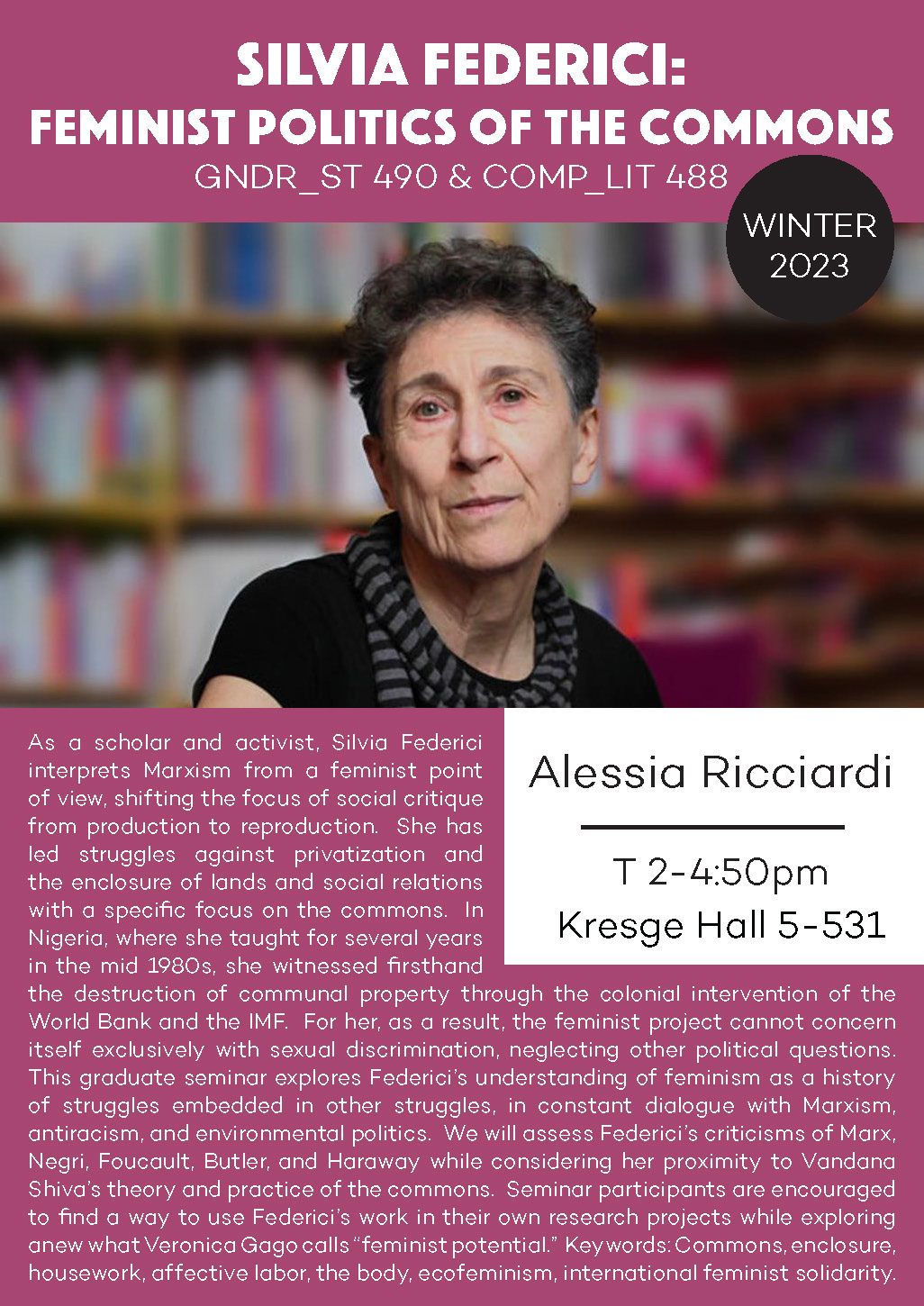 |
GNDR_ST 490-0-22: Silvia Federici: Feminist Politics of the CommonsAs a scholar and activist, Silvia Federici interprets Marxism from a feminist point of view, shifting the focus of social critique from production to reproduction. She has led struggles against privatization and the enclosure of lands and social relations with a specific focus on the commons. In Nigeria, where she taught for several years in the mid 1980s, she witnessed firsthand the destruction of communal property through the colonial intervention of the World Bank and the IMF. For her, as a result, the feminist project cannot concern itself exclusively with sexual discrimination, neglecting other political questions. This graduate seminar explores Federici’s understanding of feminism as a history of struggles embedded in other struggles, in constant dialogue with Marxism, antiracism, and environmental politics. We will assess Federici’s criticisms of Marx, Negri, Foucault, Butler, and Haraway while considering her proximity to Vandana Shiva's theory and practice of the commons. Seminar participants are encouraged to find a way to use Federici’s work in their own research projects while exploring anew what Veronica Gago calls “feminist potential.” Keywords: Commons, enclosure, housework, affective labor, the body, ecofeminism, international feminist solidarity. |
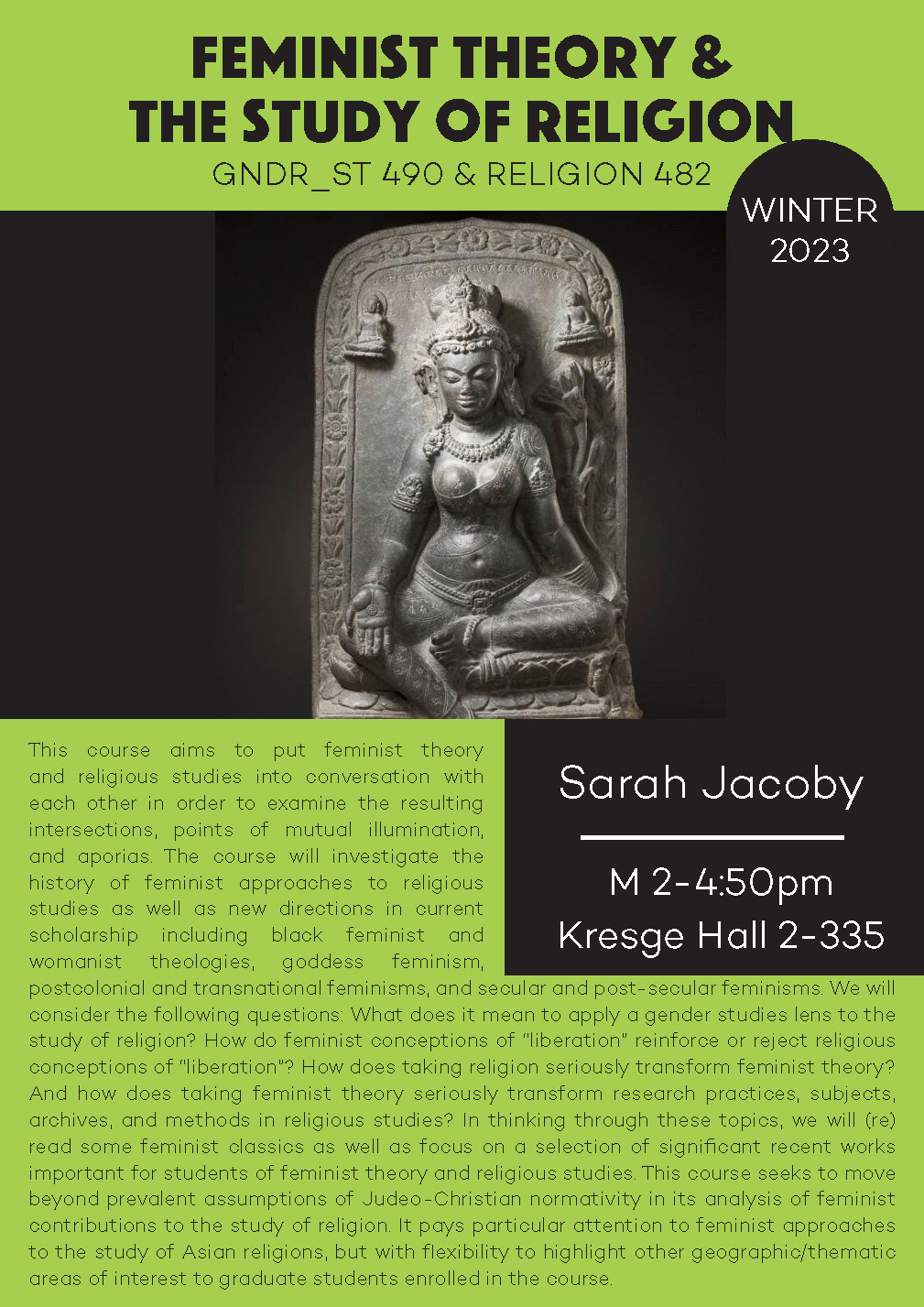 |
GNDR_ST 490-0-23: Feminist Theory & the Study of ReligionThis course aims to put feminist theory and religious studies into conversation with each other in order to examine the resulting intersections, points of mutual illumination, and aporias. The course will investigate the history of feminist approaches to religious studies as well as new directions in current scholarship including black feminist and womanist theologies, goddess feminism, postcolonial and transnational feminisms, and secular and post-secular feminisms. We will consider the following questions: What does it mean to apply a gender studies lens to the study of religion? How do feminist conceptions of "liberation" reinforce or reject religious conceptions of "liberation"? How does taking religion seriously transform feminist theory? And how does taking feminist theory seriously transform research practices, subjects, archives, and methods in religious studies? In thinking through these topics, we will (re)read some feminist classics as well as focus on a selection of significant recent works important for students of feminist theory and religious studies. This course seeks to move beyond prevalent assumptions of Judeo-Christian normativity in its analysis of feminist contributions to the study of religion. It pays particular attention to feminist approaches to the study of Asian religions, but with flexibility to highlight other geographic/thematic areas of interest to graduate students enrolled in the course. |

